Annie reads in 2021 - Part 2
Dies ist die Fortführung des Themas Annie reads in 2021 - Part 1.
ForumClub Read 2021
Melde dich bei LibraryThing an, um Nachrichten zu schreiben.
1AnnieMod
Attempt #2 for this year.
After a couple of bad months (ending up in the hospital for non-COVID related reasons and then dealing with recovery and what's not), my reading finally recovered as well. So let's try that again. I will probably start writing reviews as I am finishing books and will back fill when I can on the ones since I stopped writing reviews and thoughts.
After a couple of bad months (ending up in the hospital for non-COVID related reasons and then dealing with recovery and what's not), my reading finally recovered as well. So let's try that again. I will probably start writing reviews as I am finishing books and will back fill when I can on the ones since I stopped writing reviews and thoughts.
2AnnieMod
Books (no touchstones by design): Reviews 1-38 are in thread 1; 39-current are here (with a few missing ones yet - working on them).
=== JANUARY ===
1. Six Four by Hideo Yokoyama
2. Minor Detail by Adania Shibli
3. Shadows in Death by J. D. Robb -- In Death (51)
4. The Sugar Syndrome by Lucy Prebble
5. Silver Wings, Iron Cross by Thomas W. Young (as by Tom Young)
6. The Iron Sickle by Martin Limón -- Sueño and Bascom (9)
7. Parable of the Sower by Octavia E. Butler -- Earthseed (1)
8. Wolf Hall by Hilary Mantel -- Wolf Hall Trilogy (1)
9. A Thousand Acres by Jane Smiley
10. Dunbar by Edward St Aubyn
11. Robert B. Parker's Colorblind by Reed Farrel Coleman -- Jesse Stone (17)
12. Running Blind by Lee Child -- Jack Reacher (4)
13. Appaloosa by Robert B. Parker -- Virgil Cole and Everett Hitch (1)
14. The Lobster Kings by Alexi Zentner
15. William I: England's Conqueror by Marc Morris -- Penguin Monarchs
16. The Fox by Sólveig Pálsdóttir
17. Witches of East End by Melissa de la Cruz -- Beauchamp Girls (1)
18. Revenge in Rubies by A. M. Stuart -- Harriet Gordon (2)
19. The 20th Century in Poetry by Michael Hulse and Simon Rae
20. Love You Dead by Peter James -- Roy Grace (12)
=== FEBRUARY ===
21. Gallows View by Peter Robinson -- Inspector Banks (1)
22. Robert B. Parker's The Bitterest Pill by Reed Farrel Coleman -- Jesse Stone (18)
23. The Book of Koli by M. R. Carey -- Rampart Trilogy (1)
24. When the Lion Feeds by Wilbur Smith -- Courtney Family Saga (1)
25. The French Widow by Mark Pryor -- Hugo Marston (9)
26. Threads of Life: A History of the World Through the Eye of a Needle by Clare Hunter
27. History: A Very Short Introduction by John H. Arnold
28. Road Out of Winter by Alison Stine
29. A Land Apart: The Southwest and the Nation in the Twentieth Century by Flannery Burke
30. The Time Machine by H. G. Wells
31. Sovereignty by Mary Kathryn Nagle
32. A Nail the Evening Hangs on by Monica Sok
33. Robert B. Parker's Grudge Match by Mike Lupica -- Sunny Randall (8)
34. Stranger by Night: Poems by Edward Hirsch
35. The Chill by Jason Starr
36. The Doors of Eden by Adrian Tchaikovsky
37. King Lear (Norton Critical Editions) by William Shakespeare
=== MARCH ===
38. Hope for the Best by Jodi Taylor -- The Chronicles of St Mary's (10)
39. Echo Burning by Lee Child -- Jack Reacher (5)
40. Killer Choice by Tom Hunt
41. The History of the World, Sixth Edition by J. M. Roberts and Odd Arne Westad
42. Whiteout by Ragnar Jónasson -- Dark Iceland (4)
43. The Galleons: Poems by Rick Barot
44. Revenger by Alastair Reynolds -- Revenger (1)
45. Cold Wind by C. J. Box -- Joe Pickett (11)
46. The Order of the Pure Moon Reflected in Water by Zen Cho
47. Buccaneers of the Caribbean: How Piracy Forged an Empire by Jon Latimer
48. The Ghost Collector by Allison Mills
49. Practical Magic by Alice Hoffman -- Practical Magic (1)
=== APRIL ===
50. Scenes of Clerical Life by George Eliot
51. The Ickabog by J. K. Rowling
52. Hidden in Plain Sight by Jeffrey Archer -- William Warwick (2)
53. Blowback by Bill Pronzini -- Nameless Detective (4)
54. Mycroft Holmes by Kareem Abdul-Jabbar and Anna Waterhouse -- Mycroft Holmes(1)
55. The Case of the Queenly Contestant by Erle Stanley Gardner -- Perry Mason (78)
56. The Rules of Magic by Alice Hoffman -- Practical Magic (2)
57. The Empress of Salt and Fortune by Nghi Vo -- The Singing Hills Cycle (1)
58. Robert B. Parker's Fool's Paradise by Mike Lupica -- Jesse Stone (19)
59. Robert B. Parker's Someone to Watch Over Me by Ace Atkins -- Spenser (49)
60. Magic Lessons by Alice Hoffman -- Practical Magic (3)
61. The Legend of the Slain Soldiers by Marcia Muller -- Elena Oliverez (2)
62. When the Tiger Came Down the Mountain by Nghi Vo -- The Singing Hills Cycle (2)
63. The Bellamy Trial by Frances Noyes Hart
64. The Body in the Dumb River by George Bellairs -- Inspector Littlejohn (36)
65. Gilead by Marilynne Robinson - Gilead(1)
66. Festival Moon by C. J. Cherryh - Alliance-Union Universe: Publishing order (18); Merovingen Nights (1)
=== MAY===
67. Hamnet by Maggie O'Farrell
68. The Princess Diarist by Carrie Fisher
69. The Long Silence by Gerard O'Donovan -- Tom Collins (1)
70. Winter in Madrid by C. J. Sansom
71. The Case of the Fabulous Fake by Erle Stanley Gardner -- Perry Mason (80)
72. Resolution by Robert B. Parker -- Virgil Cole and Everett Hitch (2)
=== JUNE ===
73. Tropic of Kansas by Christopher Brown
74. The Portrait of Molly Dean by Katherine Kovacic -- Alex Clayton (1)
75. Frankenstein in Baghdad by Ahmed Saadawi
76. Homicide in Hardcover by Kate Carlisle -- Bibliophile Mysteries (1)
77. Need You Dead by Peter James -- Roy Grace (13)
=== JULY ===
78. The Decagon House Murders by Yukito Ayatsuji
79. Faithless in Death by J. D. Robb -- In Death (52)
80. I'm Thinking of Ending Things by Iain Reid
81. Come-Hither Honeycomb by Erin Belieu
82. The Master Key by Masako Togawa
83. The Sniper by Kuo-Li Chang
84. Black Girl, Call Home by Jasmine Mans
85. Dead if You Don't by Peter James -- Roy Grace (14)
86. shine your icy crown by Amanda Lovelace -- you are your own fairy tale(2)
87. Bottle Demon by Stephen Blackmoore -- Eric Carter (6)
88. Brimstone by Robert B. Parker -- Virgil Cole and Everett Hitch (3)
89. Dead at First Sight by Peter James -- Roy Grace (15)
90. A Darkness More Than Night by Michael Connelly -- Harry Bosch (7), Jack McEvoy (1.2), Terry McCaleb (2)
91. Find Them Dead by Peter James -- Roy Grace (16)
92. Wild Sign by Patricia Briggs -- Alpha and Omega (6), World of the Marrok (29)
93. I am The Rage by Martina McGowan
94. Shadow Captain by Alastair Reynolds -- Revenger (2)
95. The Burning Light by Bradley P. Beaulieu and Rob Ziegler
96. Notes from the Field by Anna Deavere Smith
97. Without Fail by Lee Child -- Jack Reacher (6)
98. Now We're Getting Somewhere: Poems by Kim Addonizio
99. Bone Silence by Alastair Reynolds -- Revenger (3)
100. Force of Nature by C. J. Box -- Joe Pickett (12)
101. The Ville Rat by Martin Limón -- Sueño and Bascom (10)
102. The Wild Fox of Yemen: Poems by Threa Almontaser
103. Gloria by Branden Jacobs-Jenkins
104. Body Work by Ben Aaronovitch -- Rivers of London (GN1)
105. Parable of the Talents by Octavia E. Butler -- Earthseed (2)
106. Robert B. Parker's Payback by Mike Lupica -- Sunny Randall (9)
107. Blue-Eyed Devil by Robert B. Parker -- Virgil Cole and Everett Hitch (1)
108. Three Men Out by Rex Stout -- Nero Wolfe (23)
109. Interlibrary Loan by Gene Wolfe -- Reclones (2)
110. Trace Elements by Donna Leon -- Commissario Brunetti (29)
111. Double Play by Robert B. Parker
112. Transient Desires by Donna Leon -- Commissario Brunetti (30)
=== AUGUST===
113. Survival of the Fittest by Jonathan Kellerman -- Alex Delaware (12)
114. Moon Music by Faye Kellerman
115. The Case of the Fenced-in Woman by Erle Stanley Gardner -- Perry Mason (81)
116. Exit Strategy by Steve Hamilton -- Nick Mason (2)
117. The Black Mountain by Rex Stout -- Nero Wolfe (24)
118. Fever Season by C. J. Cherryh -- Alliance-Union Universe: Publishing order (19); Merovingen Nights (2)
119. Deepsix by Jack McDevitt -- The Academy: Priscilla Hutchins (2)
120. The Girl Who Died by Ragnar Jónasson
121. Fledgling by Octavia E. Butler
122. Path of the Assassin by Brad Thor -- Scot Harvath (2)
123. Living Nations, Living Words: An Anthology of First Peoples Poetry edited by Joy Harjo
124. The Trials of Koli by M. R. Carey -- Rampart Trilogy (2)
125. Jupiter's Bones by Faye Kellerman -- Decker/Lazarus (11)
126. Beethoven Variations : Poems on a Life by Ruth Padel
127. The Nebraska Dispatches by Christopher Cartmill
128. Ping-Pong Heart by Martin Limón -- Sueño and Bascom (11)
129. The Crossing Places by Elly Griffiths -- Ruth Galloway (1)
130. Billy Straight by Jonathan Kellerman -- Petra Connor (1)
131. At Night All Blood Is Black by David Diop
132. The Cellist by Daniel Silva -- Gabriel Allon (21)
133. Second Place by Rachel Cusk
134. Not Here by Hieu Minh Nguyen
135. Diné: A History of the Navajos by Peter Iverson ; photographs by Monty Roessel
136. Monster by Jonathan Kellerman -- Alex Delaware (13)
137. Kindred by Octavia E. Butler
138. Winterkill by Ragnar Jónasson, translated by David Warriner from the French translation by Jean-Christophe Salaün -- Dark Iceland (6)
139. Prefecture D by Hideo Yokoyama, translated by Jonathan Lloyd-Davies -- Six Four Universe
140. Robert B. Parker's Ironhorse by Robert Knott -- Virgil Cole and Everett Hitch (5)
141. Where the Wild Ladies Are by Aoko Matsuda, translated by Polly Barton
142. City of Bones by Michael Connelly -- Harry Bosch (8)
143. China Room by Sunjeev Sahota
144. Dressed for Death by Donna Leon -- Commissario Brunetti (3)
145. The Perfect Nine: The Epic of Gĩkũyũ and Mũmbi by Ngũgĩ wa Thiong'o, translated by Ngũgĩ wa Thiong'o
146. A Dedicated Man by Peter Robinson -- Inspector Banks (2)
147. Everyone Knows Your Mother Is a Witch by Rivka Galchen
=== JANUARY ===
1. Six Four by Hideo Yokoyama
2. Minor Detail by Adania Shibli
3. Shadows in Death by J. D. Robb -- In Death (51)
4. The Sugar Syndrome by Lucy Prebble
5. Silver Wings, Iron Cross by Thomas W. Young (as by Tom Young)
6. The Iron Sickle by Martin Limón -- Sueño and Bascom (9)
7. Parable of the Sower by Octavia E. Butler -- Earthseed (1)
8. Wolf Hall by Hilary Mantel -- Wolf Hall Trilogy (1)
9. A Thousand Acres by Jane Smiley
10. Dunbar by Edward St Aubyn
11. Robert B. Parker's Colorblind by Reed Farrel Coleman -- Jesse Stone (17)
12. Running Blind by Lee Child -- Jack Reacher (4)
13. Appaloosa by Robert B. Parker -- Virgil Cole and Everett Hitch (1)
14. The Lobster Kings by Alexi Zentner
15. William I: England's Conqueror by Marc Morris -- Penguin Monarchs
16. The Fox by Sólveig Pálsdóttir
17. Witches of East End by Melissa de la Cruz -- Beauchamp Girls (1)
18. Revenge in Rubies by A. M. Stuart -- Harriet Gordon (2)
19. The 20th Century in Poetry by Michael Hulse and Simon Rae
20. Love You Dead by Peter James -- Roy Grace (12)
=== FEBRUARY ===
21. Gallows View by Peter Robinson -- Inspector Banks (1)
22. Robert B. Parker's The Bitterest Pill by Reed Farrel Coleman -- Jesse Stone (18)
23. The Book of Koli by M. R. Carey -- Rampart Trilogy (1)
24. When the Lion Feeds by Wilbur Smith -- Courtney Family Saga (1)
25. The French Widow by Mark Pryor -- Hugo Marston (9)
26. Threads of Life: A History of the World Through the Eye of a Needle by Clare Hunter
27. History: A Very Short Introduction by John H. Arnold
28. Road Out of Winter by Alison Stine
29. A Land Apart: The Southwest and the Nation in the Twentieth Century by Flannery Burke
30. The Time Machine by H. G. Wells
31. Sovereignty by Mary Kathryn Nagle
32. A Nail the Evening Hangs on by Monica Sok
33. Robert B. Parker's Grudge Match by Mike Lupica -- Sunny Randall (8)
34. Stranger by Night: Poems by Edward Hirsch
35. The Chill by Jason Starr
36. The Doors of Eden by Adrian Tchaikovsky
37. King Lear (Norton Critical Editions) by William Shakespeare
=== MARCH ===
38. Hope for the Best by Jodi Taylor -- The Chronicles of St Mary's (10)
39. Echo Burning by Lee Child -- Jack Reacher (5)
40. Killer Choice by Tom Hunt
41. The History of the World, Sixth Edition by J. M. Roberts and Odd Arne Westad
42. Whiteout by Ragnar Jónasson -- Dark Iceland (4)
43. The Galleons: Poems by Rick Barot
44. Revenger by Alastair Reynolds -- Revenger (1)
45. Cold Wind by C. J. Box -- Joe Pickett (11)
46. The Order of the Pure Moon Reflected in Water by Zen Cho
47. Buccaneers of the Caribbean: How Piracy Forged an Empire by Jon Latimer
48. The Ghost Collector by Allison Mills
49. Practical Magic by Alice Hoffman -- Practical Magic (1)
=== APRIL ===
50. Scenes of Clerical Life by George Eliot
51. The Ickabog by J. K. Rowling
52. Hidden in Plain Sight by Jeffrey Archer -- William Warwick (2)
53. Blowback by Bill Pronzini -- Nameless Detective (4)
54. Mycroft Holmes by Kareem Abdul-Jabbar and Anna Waterhouse -- Mycroft Holmes(1)
55. The Case of the Queenly Contestant by Erle Stanley Gardner -- Perry Mason (78)
56. The Rules of Magic by Alice Hoffman -- Practical Magic (2)
57. The Empress of Salt and Fortune by Nghi Vo -- The Singing Hills Cycle (1)
58. Robert B. Parker's Fool's Paradise by Mike Lupica -- Jesse Stone (19)
59. Robert B. Parker's Someone to Watch Over Me by Ace Atkins -- Spenser (49)
60. Magic Lessons by Alice Hoffman -- Practical Magic (3)
61. The Legend of the Slain Soldiers by Marcia Muller -- Elena Oliverez (2)
62. When the Tiger Came Down the Mountain by Nghi Vo -- The Singing Hills Cycle (2)
63. The Bellamy Trial by Frances Noyes Hart
64. The Body in the Dumb River by George Bellairs -- Inspector Littlejohn (36)
65. Gilead by Marilynne Robinson - Gilead(1)
66. Festival Moon by C. J. Cherryh - Alliance-Union Universe: Publishing order (18); Merovingen Nights (1)
=== MAY===
67. Hamnet by Maggie O'Farrell
68. The Princess Diarist by Carrie Fisher
69. The Long Silence by Gerard O'Donovan -- Tom Collins (1)
70. Winter in Madrid by C. J. Sansom
71. The Case of the Fabulous Fake by Erle Stanley Gardner -- Perry Mason (80)
72. Resolution by Robert B. Parker -- Virgil Cole and Everett Hitch (2)
=== JUNE ===
73. Tropic of Kansas by Christopher Brown
74. The Portrait of Molly Dean by Katherine Kovacic -- Alex Clayton (1)
75. Frankenstein in Baghdad by Ahmed Saadawi
76. Homicide in Hardcover by Kate Carlisle -- Bibliophile Mysteries (1)
77. Need You Dead by Peter James -- Roy Grace (13)
=== JULY ===
78. The Decagon House Murders by Yukito Ayatsuji
79. Faithless in Death by J. D. Robb -- In Death (52)
80. I'm Thinking of Ending Things by Iain Reid
81. Come-Hither Honeycomb by Erin Belieu
82. The Master Key by Masako Togawa
83. The Sniper by Kuo-Li Chang
84. Black Girl, Call Home by Jasmine Mans
85. Dead if You Don't by Peter James -- Roy Grace (14)
86. shine your icy crown by Amanda Lovelace -- you are your own fairy tale(2)
87. Bottle Demon by Stephen Blackmoore -- Eric Carter (6)
88. Brimstone by Robert B. Parker -- Virgil Cole and Everett Hitch (3)
89. Dead at First Sight by Peter James -- Roy Grace (15)
90. A Darkness More Than Night by Michael Connelly -- Harry Bosch (7), Jack McEvoy (1.2), Terry McCaleb (2)
91. Find Them Dead by Peter James -- Roy Grace (16)
92. Wild Sign by Patricia Briggs -- Alpha and Omega (6), World of the Marrok (29)
93. I am The Rage by Martina McGowan
94. Shadow Captain by Alastair Reynolds -- Revenger (2)
95. The Burning Light by Bradley P. Beaulieu and Rob Ziegler
96. Notes from the Field by Anna Deavere Smith
97. Without Fail by Lee Child -- Jack Reacher (6)
98. Now We're Getting Somewhere: Poems by Kim Addonizio
99. Bone Silence by Alastair Reynolds -- Revenger (3)
100. Force of Nature by C. J. Box -- Joe Pickett (12)
101. The Ville Rat by Martin Limón -- Sueño and Bascom (10)
102. The Wild Fox of Yemen: Poems by Threa Almontaser
103. Gloria by Branden Jacobs-Jenkins
104. Body Work by Ben Aaronovitch -- Rivers of London (GN1)
105. Parable of the Talents by Octavia E. Butler -- Earthseed (2)
106. Robert B. Parker's Payback by Mike Lupica -- Sunny Randall (9)
107. Blue-Eyed Devil by Robert B. Parker -- Virgil Cole and Everett Hitch (1)
108. Three Men Out by Rex Stout -- Nero Wolfe (23)
109. Interlibrary Loan by Gene Wolfe -- Reclones (2)
110. Trace Elements by Donna Leon -- Commissario Brunetti (29)
111. Double Play by Robert B. Parker
112. Transient Desires by Donna Leon -- Commissario Brunetti (30)
=== AUGUST===
113. Survival of the Fittest by Jonathan Kellerman -- Alex Delaware (12)
114. Moon Music by Faye Kellerman
115. The Case of the Fenced-in Woman by Erle Stanley Gardner -- Perry Mason (81)
116. Exit Strategy by Steve Hamilton -- Nick Mason (2)
117. The Black Mountain by Rex Stout -- Nero Wolfe (24)
118. Fever Season by C. J. Cherryh -- Alliance-Union Universe: Publishing order (19); Merovingen Nights (2)
119. Deepsix by Jack McDevitt -- The Academy: Priscilla Hutchins (2)
120. The Girl Who Died by Ragnar Jónasson
121. Fledgling by Octavia E. Butler
122. Path of the Assassin by Brad Thor -- Scot Harvath (2)
123. Living Nations, Living Words: An Anthology of First Peoples Poetry edited by Joy Harjo
124. The Trials of Koli by M. R. Carey -- Rampart Trilogy (2)
125. Jupiter's Bones by Faye Kellerman -- Decker/Lazarus (11)
126. Beethoven Variations : Poems on a Life by Ruth Padel
127. The Nebraska Dispatches by Christopher Cartmill
128. Ping-Pong Heart by Martin Limón -- Sueño and Bascom (11)
129. The Crossing Places by Elly Griffiths -- Ruth Galloway (1)
130. Billy Straight by Jonathan Kellerman -- Petra Connor (1)
131. At Night All Blood Is Black by David Diop
132. The Cellist by Daniel Silva -- Gabriel Allon (21)
133. Second Place by Rachel Cusk
134. Not Here by Hieu Minh Nguyen
135. Diné: A History of the Navajos by Peter Iverson ; photographs by Monty Roessel
136. Monster by Jonathan Kellerman -- Alex Delaware (13)
137. Kindred by Octavia E. Butler
138. Winterkill by Ragnar Jónasson, translated by David Warriner from the French translation by Jean-Christophe Salaün -- Dark Iceland (6)
139. Prefecture D by Hideo Yokoyama, translated by Jonathan Lloyd-Davies -- Six Four Universe
140. Robert B. Parker's Ironhorse by Robert Knott -- Virgil Cole and Everett Hitch (5)
141. Where the Wild Ladies Are by Aoko Matsuda, translated by Polly Barton
142. City of Bones by Michael Connelly -- Harry Bosch (8)
143. China Room by Sunjeev Sahota
144. Dressed for Death by Donna Leon -- Commissario Brunetti (3)
145. The Perfect Nine: The Epic of Gĩkũyũ and Mũmbi by Ngũgĩ wa Thiong'o, translated by Ngũgĩ wa Thiong'o
146. A Dedicated Man by Peter Robinson -- Inspector Banks (2)
147. Everyone Knows Your Mother Is a Witch by Rivka Galchen
3AnnieMod
Plays
1. The Sugar Syndrome by Lucy Prebble (2003), full length
2. Sovereignty by Mary Kathryn Nagle (2018), full length
3. Code by Andrea Fleck Clardy (2018), 10 minutes
4. Notes from the Field by Anna Deavere Smith (2015), full length
5. Gloria by Branden Jacobs-Jenkins (2015), full length
Audio Plays and other audio drama
1. Release by Matt Hartley (2021), radio, BBC Radio 4, 44 minutes
2. Beethoven Can Hear You by Timothy X Atack (2020), radio, BBC Radio 3, 89 minutes
3. Lives in Transit by Rosemary Jenkinson (2021), radio, BBC Radio 4, 44 minutes
4. King Lear: Arkangel Shakespeare, 3 hours and 8 minutes
5. Domino by Archie Maddocks (2021), radio, BBC Radio 4, 44 minutes
6. Writ in Water by Angus Graham-Campbell (2021), radio, BBC Radio 4, 44 minutes
7. London Particular by Nick Perry (2020), radio, BBC Radio 4, ~2 hours and 15 minutes (3x44 minutes)
8. The Elder Son by Alexander Vampilov, adapted by Jan Butler, translated by Tom Wainwright (2021), radio, BBC Radio 4, ~1 hour and 30 minutes (2x44 minutes)
9. Making Peace by Tessa Gibbs (2019), radio, BBC Radio 4, 44 minutes
10. French Like Faiza by Ilana Navaro (2021), radio, BBC Radio 3, 94 minutes
11. The Christopher Boy’s Communion by David Mamet (2021), radio, BBC Radio 4, 44 minutes
12. Scenes from a Zombie Apocalypse by Katie Hims and Paul Elliott (2021), radio, BBC Radio 4, 44 minutes
13. The Flowers Are Perfect in the Garden by Lucy Caldwell (2021), radio, BBC Radio 4, 44 minutes
14. At Sea by Lucy Caldwell (2021), radio, BBC Radio 4, 44 minutes
15. Martians by Lucy Caldwell (2019), radio, BBC Radio 4, 44 minutes
1. The Sugar Syndrome by Lucy Prebble (2003), full length
2. Sovereignty by Mary Kathryn Nagle (2018), full length
3. Code by Andrea Fleck Clardy (2018), 10 minutes
4. Notes from the Field by Anna Deavere Smith (2015), full length
5. Gloria by Branden Jacobs-Jenkins (2015), full length
Audio Plays and other audio drama
1. Release by Matt Hartley (2021), radio, BBC Radio 4, 44 minutes
2. Beethoven Can Hear You by Timothy X Atack (2020), radio, BBC Radio 3, 89 minutes
3. Lives in Transit by Rosemary Jenkinson (2021), radio, BBC Radio 4, 44 minutes
4. King Lear: Arkangel Shakespeare, 3 hours and 8 minutes
5. Domino by Archie Maddocks (2021), radio, BBC Radio 4, 44 minutes
6. Writ in Water by Angus Graham-Campbell (2021), radio, BBC Radio 4, 44 minutes
7. London Particular by Nick Perry (2020), radio, BBC Radio 4, ~2 hours and 15 minutes (3x44 minutes)
8. The Elder Son by Alexander Vampilov, adapted by Jan Butler, translated by Tom Wainwright (2021), radio, BBC Radio 4, ~1 hour and 30 minutes (2x44 minutes)
9. Making Peace by Tessa Gibbs (2019), radio, BBC Radio 4, 44 minutes
10. French Like Faiza by Ilana Navaro (2021), radio, BBC Radio 3, 94 minutes
11. The Christopher Boy’s Communion by David Mamet (2021), radio, BBC Radio 4, 44 minutes
12. Scenes from a Zombie Apocalypse by Katie Hims and Paul Elliott (2021), radio, BBC Radio 4, 44 minutes
13. The Flowers Are Perfect in the Garden by Lucy Caldwell (2021), radio, BBC Radio 4, 44 minutes
14. At Sea by Lucy Caldwell (2021), radio, BBC Radio 4, 44 minutes
15. Martians by Lucy Caldwell (2019), radio, BBC Radio 4, 44 minutes
4AnnieMod
Series: only the ones I am somewhat trying to work on...
Waiting for the next book:
Crime/Mystery/Detective
- Alex McKnight by Steve Hamilton. Read 1-11
- Cassie Dewell by C. J. Box. Read 1-4
- Gabriel Allon by Daniel Silva. Read 1-21.
- Harriet Gordon by A. M. Stuart. Read 1-2.
- Hollow Man by Mark Pryor. Read 1-2.
- Hugo Marston by Mark Pryor. Read 1-9.
- Jesse Stone by Robert B. Parker and others. Read 1-19+5.5;
- Michael Parson by Tom Young. Read 1-6.
- Nick Mason by Steve Hamilton. Read 1-2.
- Reykjavik Wartime Mysteries by Arnaldur Indriðason. Read 1-2.
- Roy Grace by Peter James. Read 1-16; Next Book: 17: Left You Dead
- Samuel Craddock Mysteries by Terry Shames. Read 1-8.
- Spenser by Robert B. Parker and then Ace Atkins. Read 1-49+prequel.
- Sunny Randall by Robert B. Parker. Read 1-9+5.5+6.5.
SF/Fantasy/Horror
- Alex Benedict by Jack McDevitt. Read 1-8.
- Eric Carter by Stephen Blackmoore. Read 1-6.
- In Death by J. D. Robb. Read 1-52. Next: 53. Forgotten in Death
- Shadow Police by Paul Cornell. Read 1-3.
- Sorcerer Royal by Zen Cho. Read 1-2.
Catching up (series):
The "Stay on top of them and catch up with the earlier ones" list:
- Alex Delaware by Jonathan Kellerman. Read 1-13; 26-31. Next Book: 14: Dr. Death and 32: Heartbreak Hotel
- Commissario Brunetti by Donna Leon. Read 1-3; 20-30. Next Book: 4: A Venetian Reckoning / Death and Judgment and 31: Title Still Not Announced.
Crime/Mystery/Detective
- Cassie Black by Michael Connelly. Read 1. Next Book: 2: The Narrows (also Harry Bosch (10), Terry McCaleb (3), Rachel Walling (2))
- Cool and Lam by A. A. Fair (Erle Stanley Gardner). Read 1-3. Next Book: 4: Spill the Jackpot
- Decker/Lazarus by Faye Kellerman. Read 1-11. Next Book: 12: Stalker
- Dirk Pitt by Clive Cussler. Read 1. Next Book: 2: The Mediterranean Caper
- Ellery Queen by Ellery Queen. Read 3;7. Next Book: 1: The Roman Hat Mystery
- Harry Bosch by Michael Connelly. Read 1-8. Next Book: 9: Lost Light
- Inspector Banks by Peter Robinson. Read 1-2. Next Book: 3: A Necessary End
- Inspector Rebus by Ian Rankin. Read 1-20; Next Book: 21: Rather Be the Devil
- Jack McEvoy by Michael Connelly. Read 1, 1.2; Next Book: 1.4: The Brass Verdict
- Jack Reacher by Lee Child. Read 1-6; Next Book: 7: Persuader by Lee Child
- Joe Pickett by C. J. Box. Read 1-12; Next Book: 13: Breaking Point
- John Wells by Alex Berenson. Read 1-3; Next Book: 4: The Midnight House
- Martin Beck by Maj Sjöwall and Per Wahlöö. Read 1-6; Next Book: 7: The Abominable Man
- Mitch Rapp (publication order) by Vince Flynn. Read 1-2; Next Book: 3: Separation of Power
- Molly Murphy Mysteries by Rhys Bowen. Read 1-4; Next Book: 5: Oh Danny Boy
- Murder Squad by Alex Grecian. Read 1-4; Next Book: 5: Lost and Gone Forever
- Nameless Detective by Bill Pronzini. Read 1-4; Next Book: 5: Twospot
- Nero Wolfe by Rex Stout. Read 1-24+40; Next Book: 25: Before Midnight
- Perry Mason by Erle Stanley Gardner. Read 1-81. Next Book: 82: The Case of the Postponed Murder
- Petra Connor by Jonathan Kellerman. Read 1. Next Book: 2: Twisted
- Rachel Walling by Michael Connelly. Read 1. Next Book: 2: The Narrows (also Harry Bosch (10), Terry McCaleb (3), Cassie Black (2))
- Roderick Alleyn by Ngaio Marsh. Read 1-5; Next Book: 6: Artists in Crime
- Ruth Galloway by Elly Griffiths. Read 1. Next Book: 2: The Janus Stone
- Scot Harvath by Brad Thor. Read 1-2. Next Book: 3: State of the Union
- Sueño and Bascom by Martin Limón. Read 1-11; Next Book: 12: The Nine-Tailed Fox
- Terry McCaleb by Michael Connelly. Read 2; Next Book: 3: The Narrows (also...)
- Tom Thorne by Mark Billingham. Read 1-13; Next Book: 14: Love Like Blood
SF/Fantasy/Horror
- The Academy: Priscilla Hutchins by Jack McDevitt. Read 1-2; Next Book: 3: Chindi
- Alex Verus by Benedict Jacka. Read 1-4; Next Book: 5: Hidden
- Alliance-Union Universe: Publishing order by C. J. Cherryh. Read 1-16,18-19; Next Book: 17: Chanur's Homecoming
- The Chronicles of St Mary's by Jodi Taylor. Read 1-10+8.5 (collection). Next Book: 11: Plan for the Worst
- Commonwealth Universe by Peter F. Hamilton. Read 0;1-6; Next Book: 7: Night Without Stars
- Foreigner by C. J. Cherryh. Read 1-2; Next Book: 3: Inheritor
- Luna by Ian McDonald. Read 1; Next Book: 2: Luna: Wolf Moon
- Merovingen Nights by C. J. Cherryh. Read 0, 1-2; Next Book: 3: Troubled Waters
- Morgaine by C. J. Cherryh. Read 1-3; Next Book: 4: Exile's Gate
- October Daye by Seanan McGuire. Read 1; Next Book: 2: A Local Habitation
- Polity Universe - Publication Order by Neal Asher. Read 1-3; Next Book: 4: Brass Man
- Quiet War by Paul McAuley. Read 1; Next Book: 2: Gardens of the Sun
- Rampart Trilogy by M. R. Carey. Read 1-2; Next Book: 3: The Fall of Koli
- Rivers of London by Ben Aaronovitch. Read 1-6; Next Book: 7: Lies Sleeping
Historical/Western/Others
- Courtney Family Saga by Wilbur Smith. Read 1; Next Book: 2: The Sound of Thunder
- Cole and Hitch by Robert B. Parker and others. Read 1-5; Next Book: 6: Robert B. Parker's Bull River by Robert Knott
- Wolf Hall Trilogy by Hilary Mantel. Read 1; Next Book: 2: Bring Up the Bodies
Completed series (absolutely incomplete - just starting to build it up):
- Dark Iceland by Ragnar Jónasson. 6 novels.
- Earthseed by Octavia E. Butler. 2 novels
- Reclones by Gene Wolfe. 2 novels
- Revenger by Alastair Reynolds. 3 novels
Waiting for the next book:
Crime/Mystery/Detective
- Alex McKnight by Steve Hamilton. Read 1-11
- Cassie Dewell by C. J. Box. Read 1-4
- Gabriel Allon by Daniel Silva. Read 1-21.
- Harriet Gordon by A. M. Stuart. Read 1-2.
- Hollow Man by Mark Pryor. Read 1-2.
- Hugo Marston by Mark Pryor. Read 1-9.
- Jesse Stone by Robert B. Parker and others. Read 1-19+5.5;
- Michael Parson by Tom Young. Read 1-6.
- Nick Mason by Steve Hamilton. Read 1-2.
- Reykjavik Wartime Mysteries by Arnaldur Indriðason. Read 1-2.
- Roy Grace by Peter James. Read 1-16; Next Book: 17: Left You Dead
- Samuel Craddock Mysteries by Terry Shames. Read 1-8.
- Spenser by Robert B. Parker and then Ace Atkins. Read 1-49+prequel.
- Sunny Randall by Robert B. Parker. Read 1-9+5.5+6.5.
SF/Fantasy/Horror
- Alex Benedict by Jack McDevitt. Read 1-8.
- Eric Carter by Stephen Blackmoore. Read 1-6.
- In Death by J. D. Robb. Read 1-52. Next: 53. Forgotten in Death
- Shadow Police by Paul Cornell. Read 1-3.
- Sorcerer Royal by Zen Cho. Read 1-2.
Catching up (series):
The "Stay on top of them and catch up with the earlier ones" list:
- Alex Delaware by Jonathan Kellerman. Read 1-13; 26-31. Next Book: 14: Dr. Death and 32: Heartbreak Hotel
- Commissario Brunetti by Donna Leon. Read 1-3; 20-30. Next Book: 4: A Venetian Reckoning / Death and Judgment and 31: Title Still Not Announced.
Crime/Mystery/Detective
- Cassie Black by Michael Connelly. Read 1. Next Book: 2: The Narrows (also Harry Bosch (10), Terry McCaleb (3), Rachel Walling (2))
- Cool and Lam by A. A. Fair (Erle Stanley Gardner). Read 1-3. Next Book: 4: Spill the Jackpot
- Decker/Lazarus by Faye Kellerman. Read 1-11. Next Book: 12: Stalker
- Dirk Pitt by Clive Cussler. Read 1. Next Book: 2: The Mediterranean Caper
- Ellery Queen by Ellery Queen. Read 3;7. Next Book: 1: The Roman Hat Mystery
- Harry Bosch by Michael Connelly. Read 1-8. Next Book: 9: Lost Light
- Inspector Banks by Peter Robinson. Read 1-2. Next Book: 3: A Necessary End
- Inspector Rebus by Ian Rankin. Read 1-20; Next Book: 21: Rather Be the Devil
- Jack McEvoy by Michael Connelly. Read 1, 1.2; Next Book: 1.4: The Brass Verdict
- Jack Reacher by Lee Child. Read 1-6; Next Book: 7: Persuader by Lee Child
- Joe Pickett by C. J. Box. Read 1-12; Next Book: 13: Breaking Point
- John Wells by Alex Berenson. Read 1-3; Next Book: 4: The Midnight House
- Martin Beck by Maj Sjöwall and Per Wahlöö. Read 1-6; Next Book: 7: The Abominable Man
- Mitch Rapp (publication order) by Vince Flynn. Read 1-2; Next Book: 3: Separation of Power
- Molly Murphy Mysteries by Rhys Bowen. Read 1-4; Next Book: 5: Oh Danny Boy
- Murder Squad by Alex Grecian. Read 1-4; Next Book: 5: Lost and Gone Forever
- Nameless Detective by Bill Pronzini. Read 1-4; Next Book: 5: Twospot
- Nero Wolfe by Rex Stout. Read 1-24+40; Next Book: 25: Before Midnight
- Perry Mason by Erle Stanley Gardner. Read 1-81. Next Book: 82: The Case of the Postponed Murder
- Petra Connor by Jonathan Kellerman. Read 1. Next Book: 2: Twisted
- Rachel Walling by Michael Connelly. Read 1. Next Book: 2: The Narrows (also Harry Bosch (10), Terry McCaleb (3), Cassie Black (2))
- Roderick Alleyn by Ngaio Marsh. Read 1-5; Next Book: 6: Artists in Crime
- Ruth Galloway by Elly Griffiths. Read 1. Next Book: 2: The Janus Stone
- Scot Harvath by Brad Thor. Read 1-2. Next Book: 3: State of the Union
- Sueño and Bascom by Martin Limón. Read 1-11; Next Book: 12: The Nine-Tailed Fox
- Terry McCaleb by Michael Connelly. Read 2; Next Book: 3: The Narrows (also...)
- Tom Thorne by Mark Billingham. Read 1-13; Next Book: 14: Love Like Blood
SF/Fantasy/Horror
- The Academy: Priscilla Hutchins by Jack McDevitt. Read 1-2; Next Book: 3: Chindi
- Alex Verus by Benedict Jacka. Read 1-4; Next Book: 5: Hidden
- Alliance-Union Universe: Publishing order by C. J. Cherryh. Read 1-16,18-19; Next Book: 17: Chanur's Homecoming
- The Chronicles of St Mary's by Jodi Taylor. Read 1-10+8.5 (collection). Next Book: 11: Plan for the Worst
- Commonwealth Universe by Peter F. Hamilton. Read 0;1-6; Next Book: 7: Night Without Stars
- Foreigner by C. J. Cherryh. Read 1-2; Next Book: 3: Inheritor
- Luna by Ian McDonald. Read 1; Next Book: 2: Luna: Wolf Moon
- Merovingen Nights by C. J. Cherryh. Read 0, 1-2; Next Book: 3: Troubled Waters
- Morgaine by C. J. Cherryh. Read 1-3; Next Book: 4: Exile's Gate
- October Daye by Seanan McGuire. Read 1; Next Book: 2: A Local Habitation
- Polity Universe - Publication Order by Neal Asher. Read 1-3; Next Book: 4: Brass Man
- Quiet War by Paul McAuley. Read 1; Next Book: 2: Gardens of the Sun
- Rampart Trilogy by M. R. Carey. Read 1-2; Next Book: 3: The Fall of Koli
- Rivers of London by Ben Aaronovitch. Read 1-6; Next Book: 7: Lies Sleeping
Historical/Western/Others
- Courtney Family Saga by Wilbur Smith. Read 1; Next Book: 2: The Sound of Thunder
- Cole and Hitch by Robert B. Parker and others. Read 1-5; Next Book: 6: Robert B. Parker's Bull River by Robert Knott
- Wolf Hall Trilogy by Hilary Mantel. Read 1; Next Book: 2: Bring Up the Bodies
Completed series (absolutely incomplete - just starting to build it up):
- Dark Iceland by Ragnar Jónasson. 6 novels.
- Earthseed by Octavia E. Butler. 2 novels
- Reclones by Gene Wolfe. 2 novels
- Revenger by Alastair Reynolds. 3 novels
5AnnieMod
Authors (!under construction!)
All Novels Read
Steve Hamilton: crime & mystery: 15 novels
- Series: Alex McKnight: 11 novels (1998-2018)
- Series: Nick Mason: 2 novels (2015-2017)
- Standalones: The Lock Artist (2010), Night Work (2017)
All Novels Read
Steve Hamilton: crime & mystery: 15 novels
- Series: Alex McKnight: 11 novels (1998-2018)
- Series: Nick Mason: 2 novels (2015-2017)
- Standalones: The Lock Artist (2010), Night Work (2017)
6BLBera
Hi Annie - I hope you are well again. You've managed to do a lot of reading through your health issues! Welcome back.
7AnnieMod
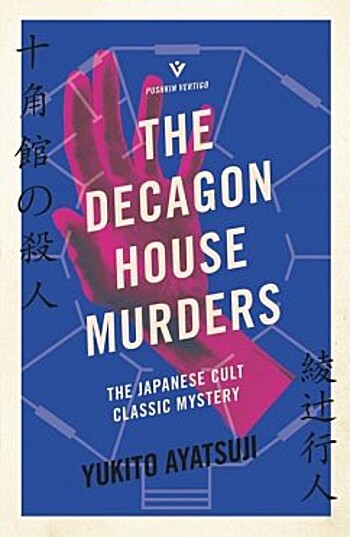
78. The Decagon House Murders by Yukito Ayatsuji
Type: Novel
Original Language: Japanese; translated by Hong-Li Wong
Original Publication: 1987 (Japanese as 十角館の殺人)/ 2015 (English). This translation first published in December 2020.
Genre: Crime, Mystery
Format: ebook
Publisher: Pushkin Press, Pushkin Vertigo series (32)
Reading dates: 30 June 2021 - 1 July 2021
In a Japanese city, there is a university. In the university, there is a mystery club. And in the club, there is a core group of club members who decide to spend a few days on an island where some not so good things happened awhile back.
A few months earlier, the previous occupants of the island died in tragic circumstances. Now our 7 mystery lovers move into the decagon house, believing to be isolated from the world and before long the first one of them is dead.
Meanwhile on the mainland, people start receiving letters from a dead man - the father of the family that died on the island.
The books weaves between the two stories - the island one where it starts looking as if everyone is doomed and the mainland where we start learning more about the island and some of the people on it (past and present). Except that connecting the dots on who is who is impossible until later - the island occupants use their nicknames, taken from the mystery world's famous authors (Ellery, Carr, Leroux, Poe, Van, Agatha and Orczy), and the mainland story uses real names.
Ayatsuji's love letter to the Golden Age of Mysteries (French, American and British) starts like a classical locked room mystery with a bit of a twist - there are people on an island, noone can get to the island so when people start dying, the murderer should be on the island. And it stays close to the genre - there are a lot of misdirection but the author never cheats or comes up with a detective who pulls a solution out of nowhere.
The final solution is unexpected - not because it was not getting clear who must be the killer by then but because of the logistics of the crime. It was cleverly done - and if you read the book knowing where it is going, it actually makes sense and does not feel rushed. Which is how most Golden Age mysteries work. And as with the better of them, it ended up being satisfying.
8AnnieMod
>6 BLBera: Well, if you look at May and June up in >2 AnnieMod:, this is when things went sideways :) For the last few weeks it was mostly laziness.
And yeah - I am getting back to normal.:)
And yeah - I am getting back to normal.:)
9AnnieMod
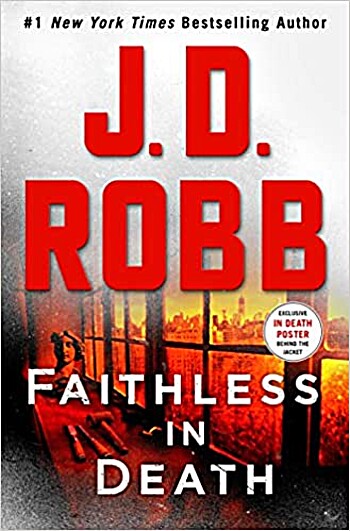
79. Faithless in Death by J. D. Robb
Type: Novel
Original Language: English
Original Publication: 2021
Series: In Death (52)
Genre: Crime, Science Fiction, Romance
Format: hardcover
Publisher: St. Martin's Press
Reading dates: 1 July 2021 - 2 July 2021
52 books into a series, you either like it or you are reading for something specific. Whichever it is, this one delivers. The last few installments, while not bad series books, had been somewhat weaker on their own. This one probably can even stand on its own - if you filter some of the secondary characters (or maybe even with them - we do get a reminder of Mavis's story).
The novel starts as usual - someone is dead and Eve needs to find justice for them. Before long, it starts looking like a cult is somehow related to the death - and to some other weird happenings in the city. Before long everyone is involved - the police department, the media (in Nadine's shoes), Roarke (because he is there). People keep dying - which never sits well with our heroine. And what sits even worse with her is abuse - which she finds plenty of in the case.
For a bit I was worried that Robb will get back into the "Eve sees something that reminds her of her past and has terrible nightmares" mode. While for a few books it made sense, Eve had grown out of it and healed some of those old scars - and thankfully Robb acknowledged that and decided not to go there.
Overall, another good addition to the series, stronger than the last few.
10AnnieMod
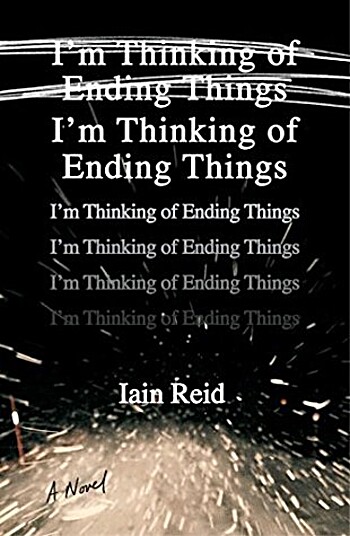
80. I'm Thinking of Ending Things by Iain Reid
Type: Novel
Original Language: English
Original Publication: 2016
Genre: Psychological horror
Format: paperback
Publisher: Gallery/Scout Press
Reading dates: 30 June 2021 - 3 July 2021
That was one weird novel. A new couple is traveling to the farm of the boyfriend to meet his family. The conversation in the car is interspersed with the girl's memories - of meeting Jake, of how the relationship progressed and of a mysterious caller who she prefers not to talk about - and intentions - because she is considering ending the relationship, despite traveling to meet the family. Things get even weirder in the farm and then on the road back.
And throughout the whole story, something just does not add up. While the different actions seem to be logically ordered, something is just off and in places laughably unrealistic. I almost gave up on the novel a few times - it was getting progressively weird and not in a good way. What kept me reading were the short interludes between the parts of the novel - a secondary story about a dead person, written exclusively in dialog, which seemed to be unrelated. But of course, it could not be so unrelated so I wanted to know where and how these stories will meet. Reid did a wonderful work with the stories merging - making the reader see things that may or may not be there.
By the end of the novel, all of those weird impossible moments in the main story are explained - using the secondary story to make you realize what is going on first and then catching up in the main story. It was a gimmicky novel in a way that probably will work for some but I felt it too clever - it felt like the writer was more concerned with the puzzle and being clever than with the story. Not my cup of tea.
12LolaWalser
Sorry to hear you were ill, I hope the recovery is complete!
Interesting to see Pushkin Press delve into crime, I wasn't aware of their Vertigo imprint before. Looks promising.
Interesting to see Pushkin Press delve into crime, I wasn't aware of their Vertigo imprint before. Looks promising.
13AnnieMod
>11 NanaCC: Much :)
>12 LolaWalser: Getting there with the recovery - but close enough to call it almost normal.:)
The Vertigo imprint is pretty diverse: https://www.librarything.com/nseries/311312/Pushkin-Vertigo and had been going for awhile
I've read Augusto De Angelis back in 2016, Emma Viskic in the last couple of years (the third one came out earlier this year so I am patiently waiting for my library to get it...) and some of their Japanese translations (the one above and The Master Key which I still need to review and they are all interesting (and different). Some are classics in their respective languages, some are new ones (Viskic for example). I need to track down the rest of them. :)
>12 LolaWalser: Getting there with the recovery - but close enough to call it almost normal.:)
The Vertigo imprint is pretty diverse: https://www.librarything.com/nseries/311312/Pushkin-Vertigo and had been going for awhile
I've read Augusto De Angelis back in 2016, Emma Viskic in the last couple of years (the third one came out earlier this year so I am patiently waiting for my library to get it...) and some of their Japanese translations (the one above and The Master Key which I still need to review and they are all interesting (and different). Some are classics in their respective languages, some are new ones (Viskic for example). I need to track down the rest of them. :)
14RidgewayGirl
Good to see you back, Annie. And The Decagon House Murders sounds fantastic. I've added it to my list.
15AnnieMod
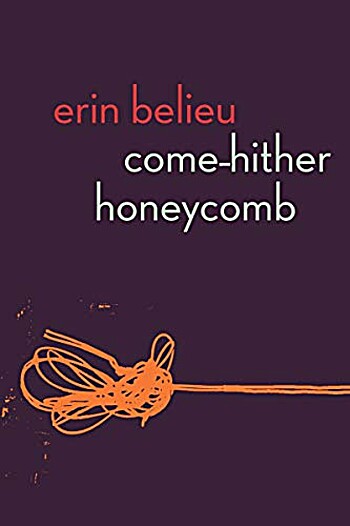
81. Come-Hither Honeycomb by Erin Belieu
Type: Poetry Collection
Original Language: English
Original Publication: 2021
Genre: Poetry
Format: paperback
Publisher: Copper Canyon Press
Reading dates: 1 July 2021 - 4 July 2021
Modern poetry can be challenging - I probably miss a lot of the subtlety in it but I usually need it to either paint a picture for me or to evoke an emotion. And for some reason, none of the 14 poems by Belieu in this volume did.
Some were incomprehensible to the point where I had to reread them a few times to make sure I am not misplacing words and lines (or worse). Some (the opening "Instructions for the Hostage" and the closing "She Returns to the Water") came close to actually working but something was still off.
I am not sure if I was in the wrong mood for the book or if Erin Belieu's style just does not work for me. I probably will try another one of her books before I give up on her completely but I doubt that it will be anytime soon.
16AnnieMod
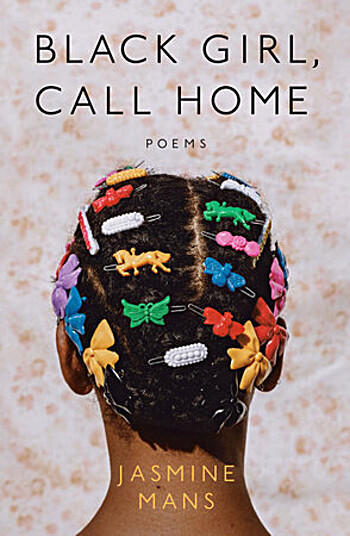
84. Black Girl, Call Home by Jasmine Mans
Type: Poetry Collection
Original Language: English
Original Publication: 2021
Genre: Poetry
Format: paperback
Publisher: Berkley
Reading dates: 5 July 2021 - 5 July 2021
There are two ways to read this collection - as individual poems collected for publication or as a whole work, split into pieces. If you go the first route, it will be an enjoyable read but you will miss a lot of the connections that flow between the pieces (and some of them will be incomprehensible). Taken as a whole, the collection sparkles.
Home is safe. Home is where the memories are. Home is where you always return. Mans weaves a collection around these simple truths, pulling from personal history and the history of the United States (from slavery to the innocents dying these days) and somehow manages to make it sound almost hopeful and positive.
It is an oddly structured collection of poems - the book is not split into sections so you read about a girl getting her hair fixed and a second later you are on a ship carrying slaves; you read about missing girls followed by a lament about the boys that never come back home alive; she even managed to include a word search puzzle which actually fits and somehow makes sense in the whole.
And at the very end of the book are two diagrams - connecting the pieces and showing their relativity to the main topic - home. You do not need them to understand the connections but they enforce one more time the structure of the book. Were they done before the assembly of the book or were they done as the book got assembled? Who knows. They can serve as a blueprint or as compilation notes.
Highly recommended.
17AnnieMod
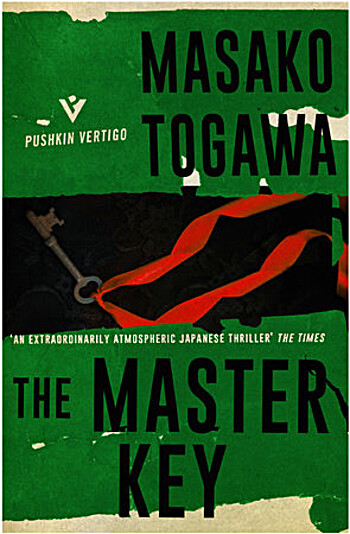
82. The Master Key by Masako Togawa
Type: Novel
Original Language: Japanese; translated by Simon Grove
Original Publication: 1962 (Japanese as 大いなる幻影)/ 1984 (English).
Genre: Crime, Mystery
Format: ebook
Publisher: Pushkin Press, Pushkin Vertigo series (17)
Reading dates: 2 July 2021 - 4 July 2021
A stolen violin. A missing boy. A manuscript which may not exist. A boy buried under a building. A man dying in woman's clothes. A missing key. A cult. A moving building. A letter. A death. Pieces of a puzzle.
The novel never runs linearly - we see different characters at different times adding different pieces of information that do not make sense on their own but can be connected into a whole puzzle. Until a piece does no fit and you need to go back and figure out which piece is not where it belongs and rebuild the puzzle again and again. And just when you catch a glimpse of the whole picture, you find yourself with a piece that does not fit again - and the whole thing shifts.
It is a cleverly designed puzzle mystery centered around an apartment building that was once used for young ladies and that had grown old, together with its occupants. As the years passed, secrets and eccentricities grew and evolved and when we finally meet the occupants of the building, they seem to have their own motives for their silences. Add an unreliable narrator and the puzzle gets even harder.
And just when you think you know what happened, the epilogue closes the last open thread, removing the last piece of the puzzle - the one that would have never fit because it did not belong to start with.
I enjoyed this novel more than I expected to - I am not a big fan of clever designs and it is different from most mysteries I had read but it has its internal logic that actually worked and the glimpses of post-WWII Japan are fascinating and add a layer to the whole story. And once you are given the key to unravel the whole story, things fall into place neatly.
18AnnieMod
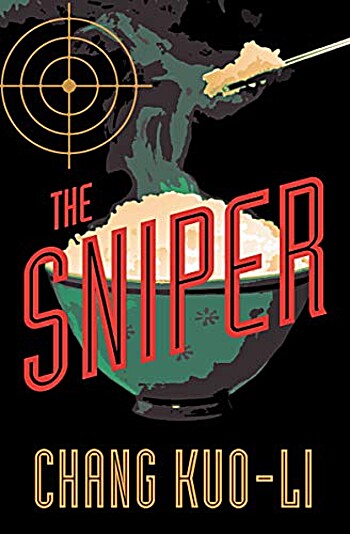
83. The Sniper by Kuo-Li Chang
Type: Novel
Original Language: Chinese; translated by Roddy Flagg
Original Publication: 2019 (Chinese/Taiwan as 炒飯狙擊手)/ 2021 (English).
Genre: Crime
Format: ebook
Publisher: Spiderline (2021)
Reading dates: 2 July 2021 - 5 July 2021
Detective Wu has only 12 days left before his retirement as one of the leading detectives in Taipei's homicide squad. So when a sailor is found dead, he hopes it to turn out to be an easy case - a suicide or a clear murder. And so it seems initially - until Wu looks closer and really dislikes what he sees. And does not appreciate the Navy pushing him to declare it a suicide. It gets even worse when another sailor is found dead and the homicide squad gets ordered to keep the two investigations separate.
And while sailors die in Taiwan, a Taiwanese government advisor is shot in Rome by a sniper. And then someone tries to kill the sniper.
The novel has two main characters - Wu and Alex - the sniper who took that shot in Rome. Except that the roles are not what one would expect.
Alex is Taiwanese, ex-military and when he shot the man he believed that he was ordered to do it by his old commander and that he did it for Taiwan. And then he saw the men he served with trying to kill him - which made no sense. So the hunter became the hunted and Alex started running across Europe.
Meanwhile in Taiwan, things do not look very well for our retiring detective - he will hate to leave a case unsolved but the case(s) do not seem to want to get solved. And before long a link is found between Rome and the Navy and things get even more complicated.
And somewhere alongside all the action, the picture of Taiwan also emerges - a corrupted Taiwan and probably a lot more exotic to my eyes than to someone who lives there but still different enough to become a character on its own.
The end is predictable - even if some of the details are not. The novel had nowhere else to go unless the author wanted to kill everyone. As it was, a lot of people died. And while I was reading the novel, I was thinking that it will work nicely as a movie - it had enough action and exotic locales to make it almost tangible.
An enjoyable novel overall.
19lisapeet
>17 AnnieMod: That sounds gimmicky but cool, and at 160 pages worth my time as a fun read, I think. Wishlisted, just to let my library hold list run its course for a week or two. I'm glad to hear you're recovering well; may it continue to be so.
20AnnieMod
>19 lisapeet: Thanks! :)
It is gimmicky - but in a good way. It may be a bit confusing and almost weird early on but it works. Keep in mind when it was written though. :)
It is gimmicky - but in a good way. It may be a bit confusing and almost weird early on but it works. Keep in mind when it was written though. :)
21AnnieMod
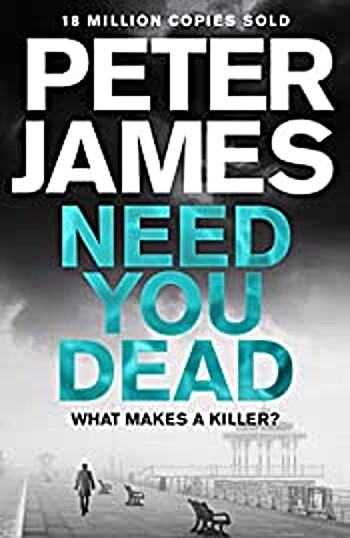
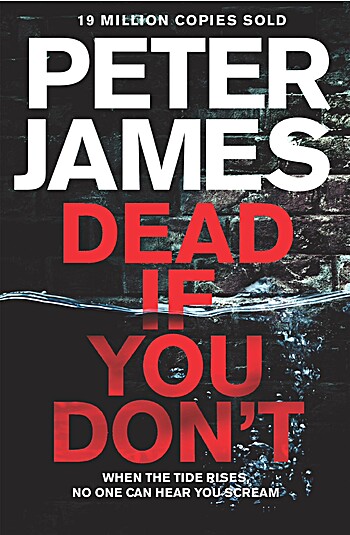
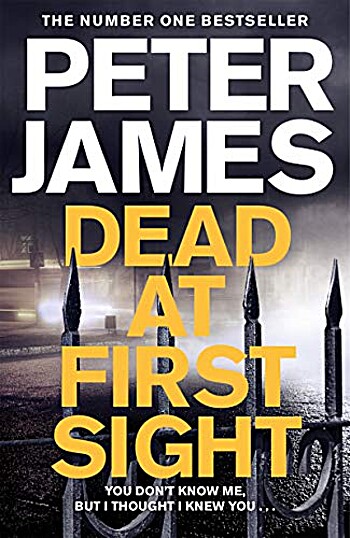
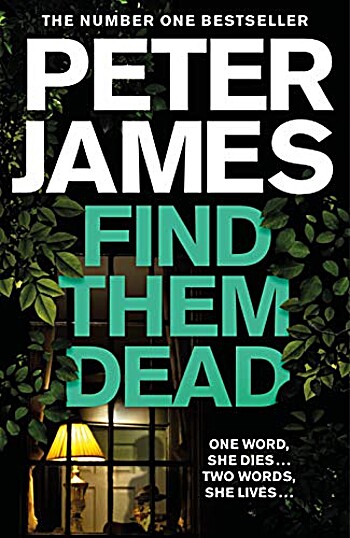
77. Need You Dead by Peter James - 2017; read 2021-06-29 - 2021-06-30; Roy Grace (13)
85. Dead If You Don't by Peter James - 2018; read 2021-07-05 - 2021-07-06; Roy Grace (14)
89. Dead at First Sight by Peter James - 2019; read 2021-07-09 - 2021-07-10; Roy Grace (15)
91. Find Them Dead by Peter James - 2020; 2021-07-11 - 2021-07-12; ; Roy Grace (16)
I had been rationing the Roy Grace series. I tend to do that with series - read a book, give it a few months, read another one, then wait again. Until I decide that I want to read a few of them in a row (or almost in a row) - as it happened here when I emerged out from my reading slump. In most cases I will read 2 or 3 books and then have to give it some time - most modern authors write with the idea that you read their books once a year so they add enough repetitions for that to work. Which becomes a problem when you go after them one after another. And then I ran out of books before I needed to stop :)
Need You Dead, the 13th novel in the series, starts with a murder. That's not unusual for the series but there is something different - we see what happens, we see who dies, we see the killer but we do not know who the killer is - but there are chapters showing the thoughts of the killer. Besides that, it is a straightforward mystery with the team working on it and things slowly falling into place. Except when they don't - while the ending was not exactly surprising by the time it actually came, it was not where I expected the novel (or the series) to go. And in Roy Grace's private world, his son Bruno is now here to stay.
Dead If You Don't, the 14th novel in the series, explores the Albanian community in Brighton while also dealing with a bomb scare at the stadium (during the first game for the local team in Premier League) and the kidnapping of a young man. As usual nothing is exactly what it seems to be and Roy Grace end up risking his life more than once - something we had not seen since the early books in the series. And the repercussions from the end of the previous book are still with the team. I'd admit that I was not sure how this one will finish - we had seen the final scenario play in a different form before - with both positive and negative ends. Which is always good in a series - if it can still be unpredictable after 14 books, the writer is doing something right.
Dead at First Sight, the 15th novel in the series, tackles internet crime - and the business of lonely hearts (and online dating). It all starts with a murder of course - although this time it is not in Brighton but in Germany. The connection is the victim - she is from the seaside town and that pulls Roy Grace in. When the second body turns up in his own town, the existing investigation of the online scammers and the murders merge into one - despite all the attempts of the killers, the connections are there for everyone to see. Add Tooth who is free again and is back for more fun (albeit a bit incapacitated) and the book has a lot more action in it than you would expect from an investigation into online scams. The end promises a bit of a change for the series - Roy Grace decides to accept a temporary posting in London - partially because he thinks he can help and partially to escape Cassian Pewe who continues to be a sorry excuse for a human being and a boss.
Find Them Dead, the 16th novel in the series, was supposed to be different. And it was - but not in the expected way. We see Roy in London but the bulk of the novel happens after he comes back from his assignment. And while there is technically a crime through the whole book, it does not get really solved - instead we get a legal thriller and get to see how the courts work in England - through the eyes of a juror - who has a big problem. The investigating team is there as supporting actors - showing the less glamorous part of being a policeman - the part after the hand over the accused. We had seen shades of that in earlier books but here it is on full display. Of course there are murders and the team has to solve a pretty gruesome one but it is connected to the trial in more than one way and its solution is tied to what is happening in the courtroom. And Bruno is really getting on my nerves - I am not sure where we are going with his character but something is very off and I expect we will get some "fun" in a later book... And the very end is hinting at some additional Cassian Pewe-related action in a later book as well - which will be very welcome - Pewe is almost cartoonish in the later books.
While most of the books in the series can work on their own, they will lose a lot if not read in order. So if you plan on reading the series, start with the first.
And then I ran out of books. The next novel is coming out later this year. Now the long wait can start - it is a good thing that I have other series to catch up on.
22NanaCC
>21 AnnieMod: Uh, oh! I think you’ve added another series to my list.
23AnnieMod
>22 NanaCC: Oops. :) It is a very nice police procedural series with a very local taste - Grace's Brighton will feel familiar after a few novels - and even if Grace is the lead, the team stays the same through the series and all of them evolve and change as normal human beings. I am considering tackling his non-series books next - while waiting for a series one to be published... Plus there are only 16 of them (although admittedly they are on the longer side, especially early on).
24AnnieMod
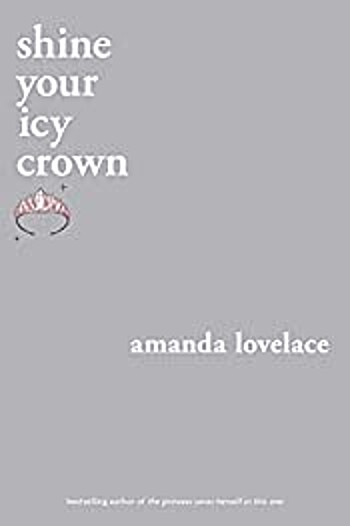
86. shine your icy crown by Amanda Lovelace
Type: Poetry Collection
Original Language: English
Original Publication: 2021
Genre: Poetry
Format: paperback
Publisher: Andrews McMeel Publishing
Reading dates: 7 July 2021 - 7 July 2021
Apparently part of a series ("you are your own fairy tale") - although it stands on its own.
More a self-help book than a poetry collection - the bulk of the book is essentially a dialog between sisters in poetic form about life and hope and how to go through life with your head held high. Add the allusions to fairy tales (conventional and not) and it can be charming in places. It is not a bad book - most of the poems are lovely and one cannot argue with them but... it felt a bit too preachy in places and I may not be the audience for the book - a teenager, especially a girl, will probably get a lot more of the book than I did.
Still I am not sorry that I read it.
25AnnieMod
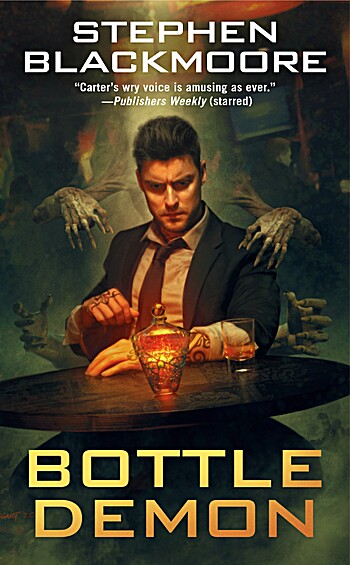
87. Bottle Demon by Stephen Blackmoore
Type: Novel
Original Language: English
Original Publication: 2021
Series: Eric Carter (6)
Genre: Urban Fantasy
Format: mass market paperback
Publisher: DAW
Reading dates: 7 July 2021 - 8 July 2021
Last time we saw Eric, he died. As he is also Mictlantecuhtli these days, it was clear that it was not the end of the story for him but it was unclear where the series is going to go - moving into Mictlan would have been interesting but losing LA as the main venue was not something I was looking forward to.
Blackmoore managed to find a way to get Eric back where he belongs - our world (well... magical LA anyway). The novel starts with Eric waking up with a headache and amnesia. As that's not the first time he woke up missing days (he is a necromancer after all and he has a knack for getting in trouble). But things just do not add up - he is missing a lot of scars, his tattoos had changed and the city looks different - until he remembers that he did die and then realized that he had been dead for a few years. Which causes a few issues - even in this world, people do not come back from dead. Except that Eric has one thing that everyone needs - control over the bottle that keeps Darius (or so everyone thinks anyway) and that seems to be enough for a lot of people to need him back. Which shortly becomes the focus of the novel (just in case the title was not making that clear).
Darius wants out, everyone else wants him to stay in his bottle (things really do not go well when he is out). And in the middle is Eric who alternates between being confused and being really pissed off. Joe Sunday (from City of the Lost) appears, tying that novel into the series despite the few discrepancies between the worlds and expanding the world of the series.
By the end of the book, Eric's life is changed again - Santa Muerte seems to be done with him after the way he was pulled back into the land of the living, Darius may or may not be a solved issue (it is magical LA - who knows what really will happen next) and the series is back on track to allow for a lot more books.
If you liked the previous books, you will probably like this one. It may not be high literature but if you do not mind the violence, it is a pretty good urban fantasy series. Now the long wait for the next book.
26AnnieMod
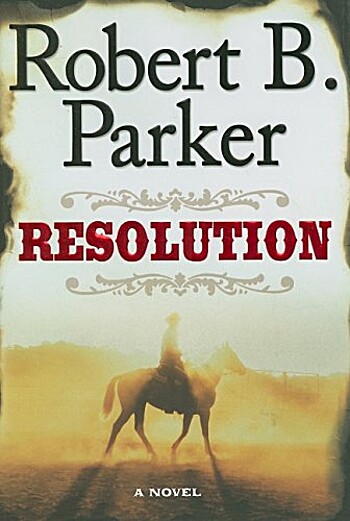
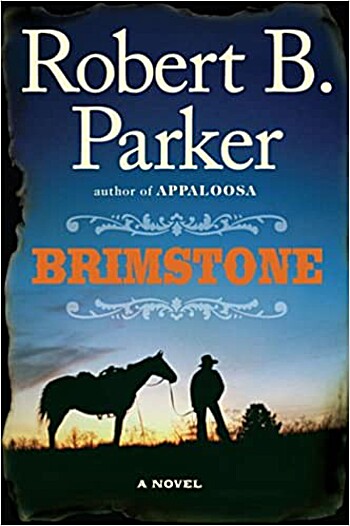
72. Resolution by Robert B. Parker -- 2008; read 2021-05-22 - 2021-05-24; Virgil Cole and Everett Hitch (2)
88. Brimstone by Robert B. Parker -- 2009; read 2021-07-09 - 2021-07-09; Virgil Cole and Everett Hitch (3)
The next 2 in Parker's western series about Virgil Cole and Everett Hitch. For anyone who is interested and missed it, my review of the first one with notes on Parker and the series and what's not is here: https://www.librarything.com/work/74050/reviews/195611084
At the end of the first novel in the series, Everett Hitch left Appaloosa after killing a man while Virgil Cole remained there with Allie - the woman who stole his heart (and reason) and who was responsible for a lot of the things that happened in Appaloosa - including Hitch's actions at the end.
Hitch ended up in the town of Resolution, working as a lookout in a bar and minding his own business (mostly). Then Virgil Cole shows up - apparently Allie ran away and he is off chasing her - which requires money, especially now that he knows that she is in Texas. So Cole gets himself hired as a lookout as well - at least temporarily and before long everything goes wrong - a local mine owner really wants the town for himself and our heroes cannot allow that - despite not being the law anymore, their moral compasses still work. And just as in Appaloosa, things go western very fast. People die, people run and everyone gets what they deserve (more or less). It is an western novel and you cannot mistake it for something else but it is also clearly related to Parker's detective stories - in some ways the pair of Hitch and Cole together are Parker's other detectives moved it time. Which makes the series even more familiar if one had read these earlier.
At the end of the novel, after solving Resolution's problems, our heroes leave for Texas - to find Allie.
It is a late book for Parker and it shows - his usually concise dialog is there but it is missing something - it almost sound laughable in places and the usual crispness is missing in most of it. Not bad enough for it to put me off the book or the series but I wish he had started the series much earlier in his career.
The third novel in the series, Brimstone, starts on the road - Cole and Hitch are chasing after Allie. Once they locate her, they have some issues extracting her from her circumstances (and Allie being Allie does not help much) and after a few local disagreements, the 3 of them end up in the town of Brimstone, looking for a new life and for a place for Allie to get better. It looks like a quiet place - if you ignore the big church which seems to be employing some quite questionable characters and which is on the warpath with the local saloons - except for one. The fact that Cole recognizes well known gunslingers both in the church deacons' list and in the saloon that does not get chased does not make anyone feel safe.
When the church manages to close all the saloons but one and then decides to go after that one as well, things get weird. Everyone has something to win, most people have something to lose and before long our heroes are in the middle of yet another border disagreement and the guns come out. And someone in the middle of it, Allie manages to create a lot more problems - and Cole still sticks by her. It is somewhat practical - there is a young woman who needs a mother figure after being saved from abduction but Cole seems to have the same obsessive focus on his love as Spencer or Jesse Stone in the other series. Which is somewhat expected - Parker's series male leads are alike.
Whatever was ailing the dialog in the second book seems to be solved here - this one was a lot crisper that the previous book. It is not Parker at his best but it is highly readable. Onto the next one.
27AnnieMod
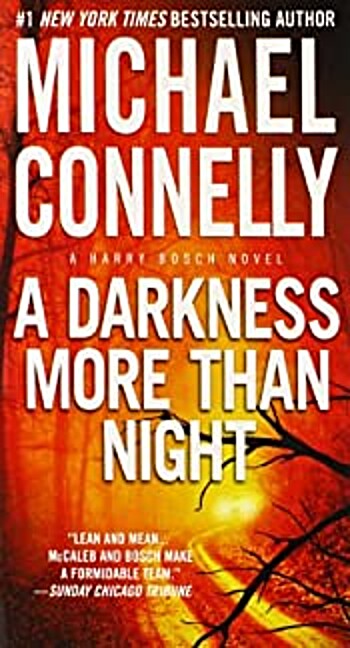
90. A Darkness More Than Night by Michael Connelly
Type: Novel
Original Language: English
Original Publication: 2001
Series: Terry McCaleb (2), Harry Bosch (7), Jack McEvoy (1.2)
Genre: Crime, Police, Thriller
Format: tall mass market paperback
Publisher: Grand Central Publishing
Reading dates: 10 July 2021 - 11 July 2021
Terry McCaleb is done with his profiling days - he lives on Catalina island, has a daughter now and he is running fishing tours out from Catalina and he does not want to hear about serial killers anymore. Except that the universe and his old colleagues missed the memo - so he gets asked to just look at a case, almost for old times sake. Which is the last thing you do to a man who used to love his job.
Meanwhile, in LA proper, Harry Bosch is stuck in a courtroom, trying to assist the prosecution win its case against a murderer. The trial is in the news - the accused is a famous movie director, the victim is a wannabe actress and that makes everyone in tinsel town pay attention - one way or another, Hollywood will find a way to thrive on that.
The two cases do not seem to have anything in common at the start but then they would not be in the same book if they did not - and before long McCaleb builds a profile that matches Bosch. And with Harry being everyone's favorite in the police department (not), it comes down to the accused himself to try to clear his own name.
It is a tightly plotted novel and the "detective is accused in the crime" trope appears in most detective series sooner or later. This one was done well - using McCaleb made it look less as a hatchet job and more of a real possibility for awhile. The fact that it did not seem to be connected to Bosch's case also helped although if one had read enough novels in the genre, it was obvious that they must intersect somewhere. The appearance of Jack McEvoy and his role in the whole thing reinforced the idea that all of Connelly's series are essentially part of a mega-series and a shared universe and you can expect anyone to pop up in any of the novels.
While the end of the case was expected (even of how we got there was somewhat unorthodox), the end of the novel threw yet another curve ball at the reader. As is often the case, white and black do not exist when people are concerned and even if Bosch was not a killer, he was not entirely innocent either.
Another strong novel in the Bosch mega-series.
28avaland
Glad to see you back and posting!
>4 AnnieMod: I have a list like your 'waiting for the next book" list in the notes on my iphone. But in early summer I stockpiles several volumes ahead Ragnar Jonasson, Ausma Zehanet Kahn, Karin Fossum and Sara Parentsky. You know, just in case.
Frankenstein in Baghdad by Ahmed Saadawi, sounds fetching...any good?
>4 AnnieMod: I have a list like your 'waiting for the next book" list in the notes on my iphone. But in early summer I stockpiles several volumes ahead Ragnar Jonasson, Ausma Zehanet Kahn, Karin Fossum and Sara Parentsky. You know, just in case.
Frankenstein in Baghdad by Ahmed Saadawi, sounds fetching...any good?
29AnnieMod
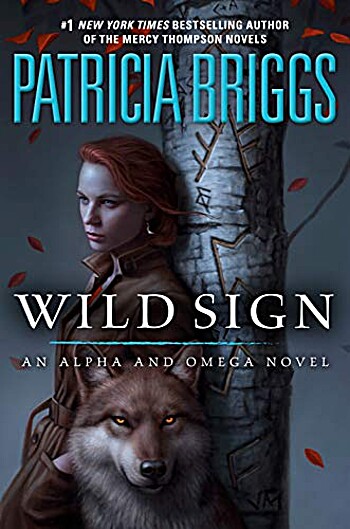
92. Wild Sign by Patricia Briggs
Type: Novel
Original Language: English
Original Publication: 2021
Series: Alpha and Omega (6), World of the Marrok (29)
Genre: Urban Fantasy
Format: Hardcover
Publisher: Ace
Reading dates: 14 July 2021 - 15 July 2021
Leah had been the werewolf to hate in both subseries of the Marrok world but we never got her backstory. In the 6th "Alpha and Omega" book, Briggs finally gets around to that story - and as usual, that ends up changing pretty much everything.
An old Evil seems to have awakened in California and Anna and Charles are sent to try to solve the problem (with the berserk Colin Taggart tagging along). The reason why the werewolves get involved is two-fold - FBI ask them to and the disaster happened on land owed by Bran (or by Leah really). And the solution requires the old history to be steered and all painful memories to be brought back to the fore.
A few random observations:
- Briggs is using music more and more in this series - which makes sense considering who Anna is.
- The world of the Marrok is brutal at the best of days and all the women we meet seem to have tragic histories. While it works for these characters and may be partially due to the type of pack Bran leads, it is a bit on the nose...
- Bran can be cruel. Not that we did not know that but we had not seen him in that light in the series before.
- Sage's betrayal is still being felt sharply.
- Charles being kept asleep while Anna is being abducted is getting a bit old - it had happened before. On the other hand, with so much magic all over the place, it is not unexpected...
Now with Leah and Bran in a different place mentally, I really want to see where we are going to go next in this series.
If you had read the previous books from the series (and from its sister series), this one will probably work for you. But it does not stand as a standalone in any way or form so do not start here - or a lot of the stuff that carries the emotional load of the book will just not work and that will probably leave the book feeling flat.
30AnnieMod
>28 avaland: Frankenstein in Baghdad - it is one of those "yes but" situations. It is one of the books I definitely plan on writing a review about soon :)
As for the series - see the much longer "catch up list" - this is where I am spending my time while waiting on the other series and authors ;) Ragnar Jonasson is on my "waiting for a new book/translation" list for example - I tracked down and read all that was already out... Which reminds me that I need to work on my Authors list up in >5 AnnieMod:. Never heard of Ausma Zehanat Khan - need to see if the library has anything from her... Plus I have a few series where I am either not tracking (because I had not touched them in awhile) or I am planning to restart (Sue Grafton *ahem*) so it is not like I have nothing to read. And yet - can they write a bit faster? :)
As for the series - see the much longer "catch up list" - this is where I am spending my time while waiting on the other series and authors ;) Ragnar Jonasson is on my "waiting for a new book/translation" list for example - I tracked down and read all that was already out... Which reminds me that I need to work on my Authors list up in >5 AnnieMod:. Never heard of Ausma Zehanat Khan - need to see if the library has anything from her... Plus I have a few series where I am either not tracking (because I had not touched them in awhile) or I am planning to restart (Sue Grafton *ahem*) so it is not like I have nothing to read. And yet - can they write a bit faster? :)
31AnnieMod
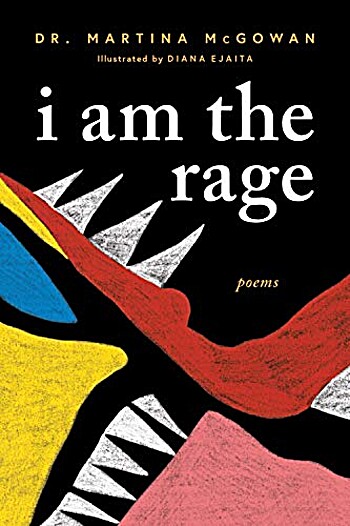
93. I am The Rage by Martina McGowan
Type: Poetry Collection
Original Language: English
Original Publication: 2021
Genre: Poetry
Format: paperback
Publisher: Sourcebooks
Reading dates: 10 July 2021 - 16 July 2021
Anger. This poetry collection radiates anger in ways that a book should not be able to. Anger towards the American society. Anger towards history. Anger towards the world. But at the same time there are glimpses of hope and something else - love and belonging; longing to belong and hope to exist.
If you are trying to escape from the news, this is not the book for you - the news are in the middle of most of the poems - from the named victims to the unnamed ones and back; sometimes in clean text, sometimes just as a hint.
It is current events commentary in a poetic form and poetry about the days we live in. And I found it impossible to read through the whole book in one sitting - 30 poems on 90 pages do not sound as much but the words and the emotions make you stop and think. Or at least they did for me.
I also could not stop comparing this collection with Jasmine Mans' Black Girl, Call Home which I read a few days earlier. They do cover some similar topics in some of their poems but they do it in different styles and inside of different frameworks. McGowan lets her rage show; Mans seems to be calmer. But the anger and disappointment is in both. And yet both styles work.
I still prefer Mans' book - but I would still recommend this one as well - as long as you know what you are walking into - there are no happy stories here.
32AnnieMod
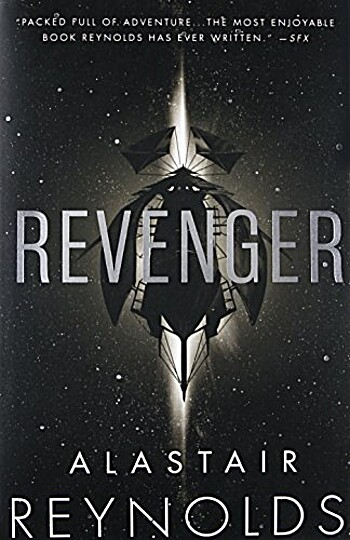
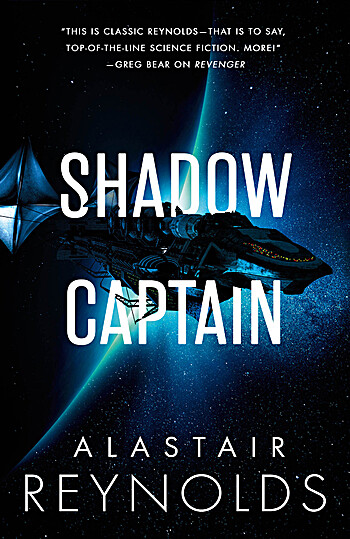
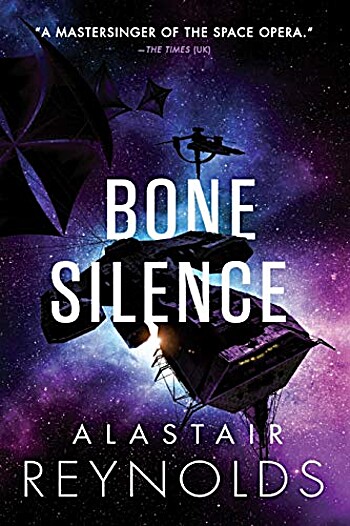
44. Revenger by Alastair Reynolds -- Revenger (1); 2016; read 2021-03-10 - 2021-03-13
94. Shadow Captain by Alastair Reynolds -- Revenger (2); 2019; read 2021-07-12 - 2021-07-17
99. Bone Silence by Alastair Reynolds -- Revenger (3); 2020; read 2021-07-19 - 2021-07-21
A complete trilogy for a change - not that it could not have at least a few continuations but according to the author it is done so... we count it as complete. It starts as YA but I will be very hard pressed to call the last book YA.
Meet Arafura and Adrana Ness - the 17 and 18 year old sisters who are bored from their live on Mazarile and really want to help their father through some financial difficulties. As it turns out they have an ability that is sought after from space ship captains - they can read the bones which are used for communication between ships - and that is their ticket to the stars and adventure.
The Universe built by Reynolds is mysterious in this first book of the trilogy - partially because we are actually reading Arafura's story told in her own voice (we even learn how that account got to be at the end of the book) and partially because there are a lot of secrets in the universe that noone really knows. Humanity is still around although it lives on 20,000 small worlds orbiting a single sun and they had been doing it for awhile - disappearing and reappearing in Occupations - short periods of a few thousand years when there is civilization, interspersed with much longer periods where there is none. And then there are the aliens and the weird currency which keeps the economy going.
The two innocent girls end up way over their heads when their ship is targeted by a pirate, Adrana is taken and Arafura manages to escape and decides to rescue her sister. It is a coming of age story wrapped into a pirate envelope and tied together with a space opera ribbon. Arafura has to grow up and lose her innocence so she can save her older sister - and she does.
It should have sounded tired and old-style but somehow Reynolds pulls it off - the book is very readable and you really want to know what happens next. Technically this first book can stand alone - while almost no details of the world are revealed, most of the questions are not even asked.
The second book of the trilogy, Shadow Captain, starts where the first ended - with Arafura (now going under the name Fura) and Adrana in command of the ex-pirate ship and still hoping that they have a chance at a normal life. The narrator also shifts - the second book is told by Adrana and that changes both the perspective and what we know about the world. The big problem for the two sisters is that the ship they got is recognizable and that noone believes anything coming from that ship - the pirate had used all tricks and lies so no matter what they say, they are considered to be the pirate herself.
And still they try - using only baubles (the dead rocks which contain treasure and can only be reached in certain times) and stay away from other ships and worlds, trying to find a way to convince the world that they are innocent. But of course thing go from bad to worse - while they try not to kill a ship that is shooting at them they manage to destroy another one and they need to land on a world for provisions and to take care of a wounded crewmate. They even manage to get tangled with zombie-like creatures and a lot of old technology. And just because that's how luck usually works, they even manage to destroy the economy of the whole universe while trying to find the pirate's treasure.
The language and the topics are still YA enough for this to count as YA but the novel reads a lot more adult than the first - even if the sisters had grown less than a year, they are different people after what they lived through. And while they travel and are chased by everyone, some more information is revealed about the universe they live in - some of it known to them from before, some of it being learned together with the reader.
It is a middle book in a trilogy and as such it cannot stand on its own - it needs the first one to be understood and it leaves so many open questions that it is obvious that an additional book is needed.
The last book in the trilogy, Bone Silence, is in some ways the weakest while also being the strongest in others. It is longer than the previous ones and it could have been even longer - and yet it has some plot holes that were surprising - almost as if Reynolds was planning to do something there and forgot.
The narrator shifts again - it goes into the 3rd and as such the unreliable narrators of the first 2 volumes are gone. That allows different stories to run in parallel - this allowing the story to work a lot smoother and without us losing half the story as with Adrana's part in the first book. On the other hand, that also allows the biggest plot hole - the sisters needed two ships for their plans to work so they managed to get a second one but it feels like magic - the ship was under attack by the fleet after the sisters (after the sisters attacked it before that) but as soon as the sisters came back to help it, the fleet disappeared somewhere despite having the exact location of the ship. But let's ignore that - maybe one of the storms helped... or something caused the fleet to move away and not strike and get them...
After the second book the sisters finally accept that they are going to always be considered pirates so they decide to embrace it, albeit a less cruel form of it. Which does not really help them in people's eyes and before long a squadron is sent to catch them, led by a boy who can also read the bones - but who also seems to be a sorry excuse for a human being.
And while the sisters try to stay alive, first together with a single ship, then with two ships, they also keep on their research of how their universe came to be and how things work in it. Early in the book we finally get the confirmation that they are in our Solar system and the old existing planets were destroyed on purpose to build the Congregation, the collection of worlds used by the human civilization during the last few million years.
And here is where another big plot hole shows up - after destroying the economy by changing the value of money in a random way (not on purpose but still) in the previous book, it was explained that even if your money are in the bank, you were still screwed up because your quions (the currency) are saved as they are so they were reevaluated. But then now we learn that the banks collect them so that they can be sent elsewhere implying that if they in the banks, they cannot be reevaluated. Which was a bit sloppy.
But even with all the sloppiness, the explanation of the world which the sisters finally manage to reveal is fascinating and interesting and that saves the book and the trilogy - as the story of the Ness sisters. It could have been a lot more - there are way too many threads left open, there are a lot more things we may have learned. But the story started with the sisters and finished their story and as such, the trilogy works - even if one hoped to get more in that final book.
I really hope that Reynolds will decide to return to this world (despite his statements in the negative) - while I am not sure I want to see more of Adrana and Fura, the world itself can support a lot more stories.
33LolaWalser
>13 AnnieMod:
Ah, I hadn't noted that The Honjin Murders was Pushkin Press--so I did come across one--but now I bookmarked the whole line and requested Lernet-Holenia (I was Jack Mortimer).
>31 AnnieMod:
I'm interested.
Ah, I hadn't noted that The Honjin Murders was Pushkin Press--so I did come across one--but now I bookmarked the whole line and requested Lernet-Holenia (I was Jack Mortimer).
>31 AnnieMod:
I'm interested.
34AnnieMod
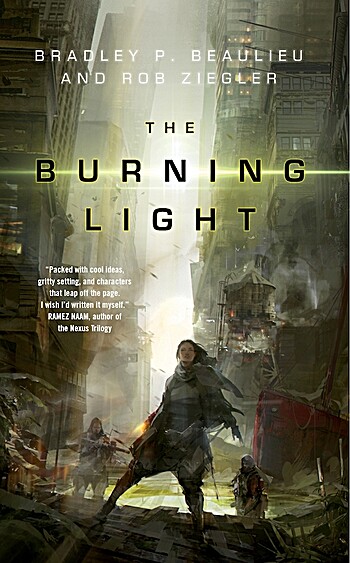
95. The Burning Light by Bradley P. Beaulieu and Rob Ziegler
Type: Novella
Original Language: English
Original Publication: 2016
Genre: Science Fiction
Format: paperback
Publisher: Tor.com
Reading dates: 17 July 2021 - 17 July 2021
This novella requires patience - it takes awhile to figure out what is going on and to realize how the world ended up how it did - and in places the writing can be a bit rough.
Some time in the future, huge parts of USA (and probably the world) are under water and humanity had developed a wait of people to stay connected mentally (it is never made clear if it was genetics or implants) and had split into small groups, fully connected inside of these groups, even growing babies to do the jobs needed. And then the Light showed up - burning a person's connection to the world but being addictive enough to actually make people crave it.
Two women get caught into the Light - one of them lost everything but escaped and is now chasing the Light and its influence as part of a military operation and the other decided to give up and live with it. Except that nothing is that easy.
The big mystery is what the Light is - a drug or a religion or something else completely. And we get the answer at the end - not entirely surprising but not disappointing either. The characters and the world details serve as a background to that big question - which makes the novella less character-driven than it could have been (even if at least a few of the characters are developed enough to make someone care about them).
I was not sure what to expect from this novella - it is obviously a science fiction one while Beaulieu is a fantasy author. So I kept wondering of it will go into something else - but it stays strictly science fiction (and post apocalyptic). It won't be for everyone but I quite enjoyed it.
35avaland
>30 AnnieMod: Will be interested in your review then! No hurry.
The latest I picked up for Jonasson was The Girl Who Died in hardcover this year. It's in the vacation pile along with the previous one.
Ausma Khan is a Canadian author; her main detective is a Muslim so of course he is sent to investigate any problems within the Muslim community in Toronto. The stories thus far are intelligent and interesting.
The latest I picked up for Jonasson was The Girl Who Died in hardcover this year. It's in the vacation pile along with the previous one.
Ausma Khan is a Canadian author; her main detective is a Muslim so of course he is sent to investigate any problems within the Muslim community in Toronto. The stories thus far are intelligent and interesting.
36AnnieMod
>35 avaland: Ah, that one is out now - so there is a new Jónasson out there I am yet to read. Yey! :) And my library has it (although all copies are out now) so on the holds list it went. And apparently I got but never read Winterkill earlier this year so even if I was all caught up back in March or something, that had changed...
I am always looking for new mystery/detective series so The unquiet dead is coming to me this weekend. :)
I am always looking for new mystery/detective series so The unquiet dead is coming to me this weekend. :)
37AnnieMod
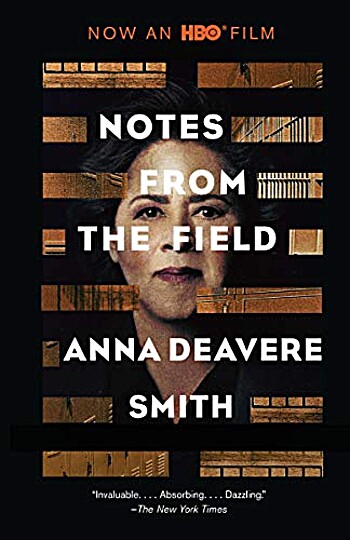
96. Notes from the Field by Anna Deavere Smith
World Premiere run: Berkeley Repertory Theatre (2015) in a different form
Length: Full Length Play.
Format: Paperback
Publisher: Anchor, 2019
Reading dates: 17 July 2021
The published version of this play is a combination of the original play, later revisions and scenes from the 2018 movie based on it. The play is somewhere between a play and a non-fiction journalistic research - the words used are the ones of real people but they are told by a single actor. I have half a mind checking the movie - I cannot imagine this actually working properly but who knows.
The play is part of a bigger project by the author - her series of plays "On the Road: A Search for American Character" had been started in the 1980s. This is the first play by her that I had ever read - and while I am not sure I want to see it, reading it actually works.
The main topic of the play is the school-to-prison pipeline in the US educational system - a topic that cannot be discussed if you do not incorporate the topics of race, mass incarceration and everything around them. Reading it in mid-2021 adds another layer to the whole thing - it made me wonder what else would the author add to this play if it was created today.
As it is, the play covers people from all walks of life - from a high school student who get arrested (for nothing) to a Native American man who finally got released from jail, from activists to judges, from a European teacher to social workers and James Baldwin, closing with the late John Lewis. It is a series of interviews without questions; real speeches and interviews (some published, some not), collected together into a narrative that looks disjointed but somehow manages to become a complete piece at the end.
The format is unconventional and I am still not sure it was the most effective one - I would have preferred a complete book, containing the same images and words but also containing some analysis. It it somehow works - it makes you stop and think and consider - and maybe as with most social commentary plays, that's what makes it powerful.
I wish that this play will read dated and irrelevant in less than a decade. Unfortunately I suspect that even decades from now, it will sound fresh and topical. And that is a shame.
Highly recommended.
38NanaCC
>37 AnnieMod: I love her. I’ve not read anything by her, but I’ve seen her on tv, both as an actress, and on talk shows. I might take a peek at this.
39AnnieMod
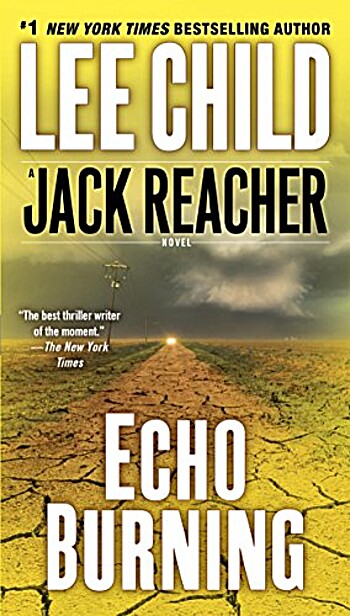
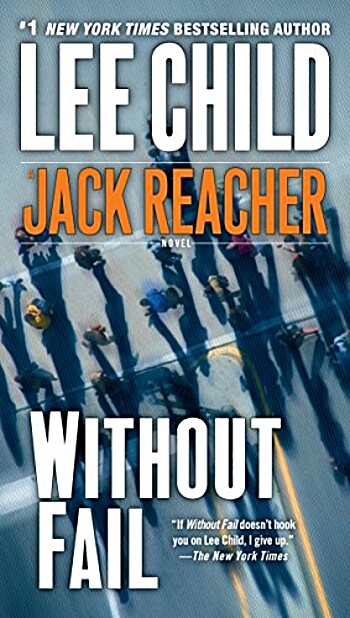
39. Echo Burning by Lee Child -- Jack Reacher (5); 2001; read 2021-03-02 - 2021-03-04
97. Without Fail by Lee Child -- Jack Reacher (6); 2002; read 2021-07-17 - 2021-07-19
I've read some of the early Lee Child novels almost 2 decades ago - he was popular enough for his books to get translations within the same year they were published in English so staying up to date with the series was not hard. Finding them in the correct order when I finally started reading them (there were 7 or 8 out at this point) was not that easy so I was reading what I could find. Which does not mean I remember much from them - I had been slowly rereading them in order and even though some flashes of memory occasionally warn me of where the book is going or I recognize a surprise turn, they still read as new novels to me.
Echo Burning is probably the weakest of the early novels. The story itself is actually pretty good but the characterization of almost everyone besides Reacher is so cliched that it goes into the realm of the cartoonish. Yes, cliches exist for a reason but even that does not help make some of the characters 3-dimensional.
The novel opens with Reacher getting in trouble - after a bar fight, he realizes that he managed to hit a cop so he needs to clear out fast. So when a young woman picks him up, he does not question his luck too much and just goes with her - until she asks him to help her kill her husband. The story the young woman tells is chilling and after some consideration (and almost interrogation), Reacher decides to help - not to kill the man (his honor won't allow it) but at least to help. And off them go to Small Town, Texas where everything looks as if it just came out from the set of Dallas.
And then things get weird - Reacher starts catching lies everywhere and it seems like everyone who opens their mouth is lying - for one reason or another. So it is up to our hero to find the truth - hopefully before more people die (because as usual, as soon as Jack is in the vicinity, the are bodies falling down).
It is not a bad novel - its mystery and its story work. It just feels a bit overdone (although there is an argument to be made that it is on purpose and that it is supposed to look like that for appearance's sake).
Without Fail gets Reacher back to D. C. - although just as with the previous installment, the novel opens with him being asked to kill someone - another plea to help. Although this time it could not have been different - the offer comes from the Secret Service - they need Reacher to do an audit and find out if the Vice President can be killed. Which he discovers really quickly - and the news are not good at all - and it looks like there may be someone internal working with the people who had sent some treats.
So Reacher and his ex-Army coworker Frances Neagley are hired to try to get to the bottom of the story - which turns out to be a lot more complicated and a lot more dangerous than anyone expected.
One of the things I like about this series is that Reacher does not just get everything immediately - he makes mistakes (some pretty visible, some not) and he works his way into finding them and figuring out not only why they were mistakes but also why he made them. Sometimes they cost lives. Sometimes they don't.
The novel is set in the world of politics but it is not a political thriller - even if politics play a role, the story revolves around people and their secrets - which is true for all the Reacher novels. Being written in 2002 makes this a different novel from what it would have been even an year earlier - the shadows of 9/11 are starting to show up and considering what Reacher is, I expect that to happen a lot more in the next books.
By the end of the novel Reacher had lost yet another woman and is ready to hit the road again. Which seems to be the way a lot of his novels finish. But then this is how he chooses to live his life.
40AnnieMod
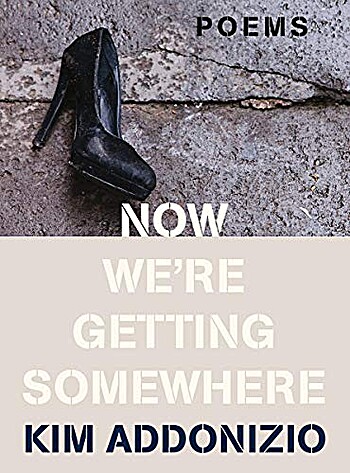
98. Now We're Getting Somewhere: Poems by Kim Addonizio
Type: Poetry Collection
Original Language: English
Original Publication: 2021
Genre: Poetry
Format: hardcover
Publisher: W. W. Norton & Company
Reading dates: 20 July 2021 - 20 July 2021
If you expect lyrical poetry, look elsewhere. Addonizio's language is rough, almost vulgar in places. Some of the poems sound autobiographical; some seem to draw from real experiences to draw a fictional picture; most of them are liberally watered with alcohol. There are powerful images and emotions and yet... they left me almost cold.
In her autobiography, Addonizio compares herself to Bukowski and this collection proves that - Bukowski's style had always been alien to me and Addonizio's work reminded me of some of his - more feminine, more contemporary, more relatable but still a bit away from the style of poetry I like.
I am still happy that I read it - some of the images she created were worth working through the language but I am not sure that I will be looking for any more of her collections.
41AnnieMod
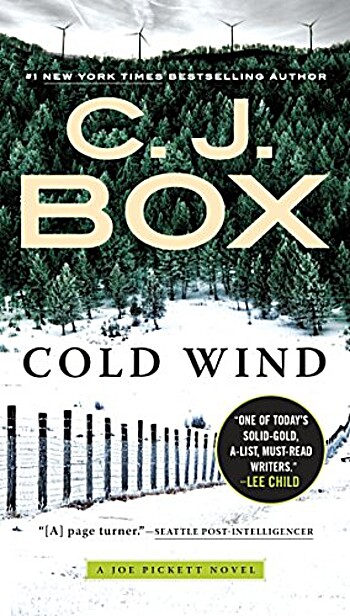
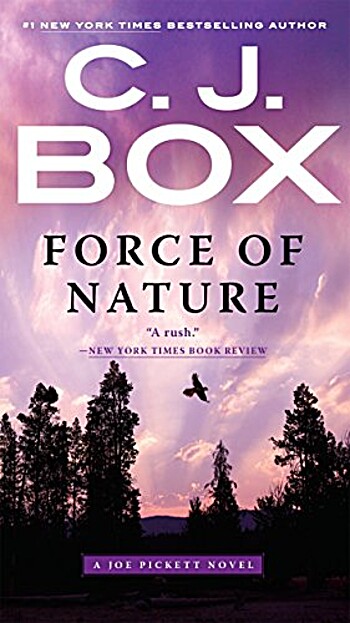
45. Cold Wind by C. J. Box -- Joe Pickett (11); 2011; read 2021-03-13 - 2021-03-14
100. Force of Nature by C. J. Box -- Joe Pickett (12); 2012; read 2021-07-21 - 2021-07-22
Another one of the series I am trying to get to the top of so I can go into "wait for the next one" mode...
In Cold Wind, game warden Joe Pickett is finally back home in Saddlestring with his wife and daughters, no special projects for the governor or being sent to some else's territory. Except that with his usual knack for getting in trouble, he ends up finding a body tied to a wind turbine. As gruesome as this is, it shortly becomes a nightmare - the dead man is Earl Alden, Joe's mother-in-law's husband and before long Missy becomes the main suspect, not without the help of her ex-husband Bud Longbrake.
As much as Joe does not like Missy (ok, that is probably the understatement of the year), even he cannot believe that she can be the killer - or that she could have ordered it. The problem is that everyone in the county can and does believe it - Missy had not made any friends with her behavior towards Bud or her general demeanor. The sheriff office and the prosecution is sure they have their murderer so Joe needs to find the truth.
As with a lot of the Pickett novels, there is also a back story - in this case the development of wind turbines in Wyoming and how that influences the local communities and nature. As usual C. J. Box uses the real-life laws and actions to build his narrative and ties it into his fictional world, using the novel for a commentary of the politics of DC and the state in real life.
And while dealing with Missy's issue, Joe also reconnects with Nate - after the Joe's betrayal (of a type) in an earlier book, Nate is now back - but so are his enemies. Before long Nate's life is shattered and a lot of the mellowing that we had seen in his character since he was introduced is gone.
By the end of the novel, the murder is solved and Nate gets yet another reminder of his past.
Force of Nature opens a few weeks after the previous novel closed. In a way it is the second part of Cold Wind. Nate's story was the secondary story in the previous novel; he takes the leading role here. After losing Alisha and Big Merle, Nate now knows that his old commander is after him - the three local men who try to kill him kinda make it clearer than ever. So he goes on the run - trying to stay a step ahead of the elite team after him. As it turns out that becomes even more of a problem when the sheriff of Saddlestring also wants him - not that this ever stopped (Nate is a Federal fugitive after all) but 3 dead bodies make it a local matter as well.
Meanwhile Joe Pickett has a trainee and is really trying to teach the young man, Luke Brueggmann, how to be a game warden. Except that a triple murder means that all law enforcing agencies are helping the sheriff's office (regardless of the sheriff's desires).
We rarely see Joe in this novel - it is really a Nate novel and we finally get his backstory - including the reason why he left the army abruptly and why now everyone seems to want him dead. The explanation was a bit under-whelming - while I can see why it can mess with someone's head, it seems almost mild compared to what I expected based on some of the dropped clues and Nate's behavior. The novel is also tied to falconry and C. J. Box uses the birds and the hobby to enhance the story.
As the novel progresses, the two stories merge (as usual) and Joe manages to get in trouble (again). He never learns Nate's story (because he does not want to know it) and as with a lot of these novels, the solution does not come almost to the end.
It will be interesting to see where this series goes next. Nate is a fugitive again (or more than before anyway - he is wanted for a few murders in additional to the older charges) and Joe will probably end up being blamed for a lot of what happened with Luke - even if as usual he has nothing to do with it.
42AnnieMod
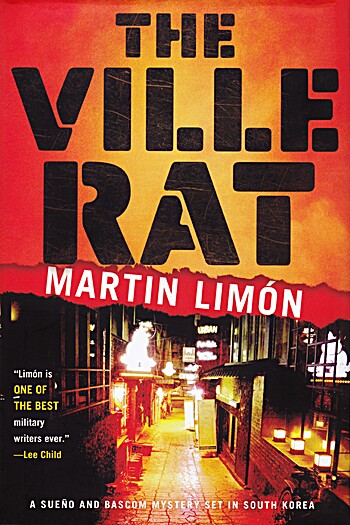
101. The Ville Rat by Martin Limón
Type: Novel
Original Language: English
Original Publication: 2015
Series: Sueño and Bascom (10)
Genre: crime, military, South Korea
Format: hardcover
Publisher: Soho Crime
Reading dates: 22 July 2021 - 23 July 2021
When a young woman is found dead in a river, Mr. Kill requests Sueño and Bascom to help with the investigation - the body washed out just under the Division compound so the US army will be involved anyway so he can at least get the best possible team. Which does not sit very well with either Division or with the big bosses down in Seoul.
And yet, the investigation is theirs. Before long it gets tangled with the black market which seems to be everywhere in Korea. And just so our guys are not bored, they also get asked to investigate an internal matter - a soldier shot at another (with a higher rank) and is getting court marshaled.
We learn some more about the Korean culture (the kisaeng tradition and its revival post WWII for example) but the novel is more concerned with the internal relationship inside of the army - the segregation (which technically does not exist anymore but seems to be alive and well) and the army's and the common soldiers' views towards homosexuality. It is the 70s and most of the commanding staff is from another generation - which makes them uncomfortable with the latter and even worse with the first. Add the Division commander who is trying to convince everyone that everything is ok in Division and some parts were almost cringe-worthy - the 70s is another country in a lot of ways.
And somewhere between all of the running around the country, Sueño's new love is blooming, he does not get beaten for a change (but someone tries to kill him a few times) and Ernie Bascom is... Ernie Bascom.
Not a good novel to get introduced to the series - while the mystery can work as a standalone, a lot of the secondary characters rely on knowing them (there are introductions but they are very concise). But if you had been reading the series, it is a good addition to it.
43AnnieMod
>38 NanaCC:
I am not sure that I had ever seen her outside of movies and TV - I kinda recognize her as an actress.
Technically, she is just the editor of the book - she collected the stories and compiled the actual words from what the people had really said. So not sure how close it will be to her appearances as herself but I think it is worth reading (or I guess watching the movie or the play - although as I said, I think it actually may work better on paper)...
I am not sure that I had ever seen her outside of movies and TV - I kinda recognize her as an actress.
Technically, she is just the editor of the book - she collected the stories and compiled the actual words from what the people had really said. So not sure how close it will be to her appearances as herself but I think it is worth reading (or I guess watching the movie or the play - although as I said, I think it actually may work better on paper)...
44AnnieMod
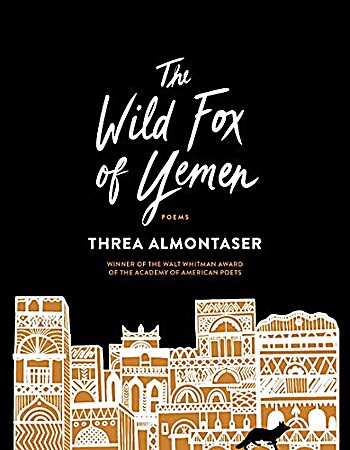
102. The Wild Fox of Yemen: Poems by Threa Almontaser
Type: Poetry Collection
Original Language: English
Original Publication: 2021
Genre: Poetry
Format: paperback
Publisher: Graywolf Press
Reading dates: 23 July 2021 - 23 July 2021
Just as Monica Sok in her A Nail the Evening Hangs On which I read earlier this year, Threa Almontaser uses her immigrant parents' history and her own family upbringing as half American, half something else to create a powerful collection. In this case the something else is Yemeni - a Muslim black woman, growing up in a country that can be challenging for anyone who is different.
The collection is split into three parts - the first is mostly set in USA, the second in Yemen and the third goes pretty much anywhere. In between there are dreams and the nightmares, the Yemen of today and yesterday, the horrors of war and the hope of a girl in USA, the post 9/11 changes for the Muslim communities and the craft a woman who knows who she is. The poetry is peppered with Arabic words - some in English letters, some in Arabic ones - none of them has a translation and while a lot of them can be figured out from the context, looking them up can surprise you sometimes.
Almontaser uses a mix of Arabic and English numerals to separate the parts of her poems and the mix is not random. Each of the three parts of the collection (Arabic numerals are used for these) are prefixed with photos, with the eyes of the people on them scratched out. I am not sure why and the book does not say anything about it (there are notes on some of the poetry but none on the images) but they are haunting...
In addition to her own poetry, Almontaser includes also two translations - two poems by the Yemeni poet Abdullah Al-Baradouni, translated by Almontaser herself. The styles of the two poets are very different - Al-Baradouni is a lot more lyrical and a lot more poetic and has an almost classical feeling. Almontaser on the other hand is more modern and feels more like an American poet who has roots in the Arabic language and world than an Arabic language poet (as little as I had read poetry which was initially written in Arabic). Which is normal after all - she is born in America.
The collection is a love letter to Yemen and an attempt to show what it is to be Yemeni abroad. It can be rough in places and not all poems work with the same power but as a whole, it makes you pay attention and never let you walk away.
One of the two translations and one of Almontaser poems the can be read here: https://theoffingmag.com/translation/why-i-am-silent-about-the-lament/
45AnnieMod

103. Gloria by Branden Jacobs-Jenkins
World Premiere run: Off-Broadway at the Vineyard Theatre on June 17, 2015
Length: Full Length Play
Format: Paperback
Publisher: Theatre Communications Group (2020)
Awards: Pulitzer (2016; nomination) and other nominations.
Reading dates: 23 July 2021
Gloria came out in a very strong year for plays: "Hamilton" won the Pulitzer; the third finalist for the award was the Tony winner "The Humans" (Gloria was Off Broadway so it was not eligible for the Tony).
In the office of a Manhattan magazine, 3 editorial assistants and an intern, are trying to figure out how to do their jobs and still find a future - none of them plans to be 30 and still an assistant and yet they may end up doing exactly that. Their banter is somewhere between cruel and playful - and they have nothing but contempt for anyone who had been around for a long time and had not progressed and become a someone.
Before this day is over, 2 of the 4 will be dead and the other 2 will need to find a way to live with the reality of what happened.
The second act of the play deals with the aftermath of the tragedy - and how different people take it. One is shattered; the other one is still looking for a way to make a name for herself. It is not hard to figure out who will do what - people do not really change.
It is a satire of an industry which had needed to change and reinvent itself a few times. But as all good satires, it is hard sometimes to see the line between reality and satire, between fact and fiction. It is also a well-written examination of what a person have to be to succeed in that world - and of what someone is ready to give up in order to become famous. The end almost makes you laugh - because it almost feels like starting all over again - a different industry, a different town... and yet...
I really enjoyed this play.
46AnnieMod
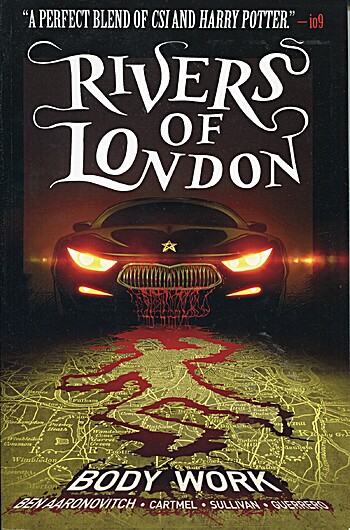
104. Body Work by Ben Aaronovitch and Andrew Cartmel; Art: Lee Sullivan; Colors: Luis Guerrero, Lettering: Rona Simpson and Janice Chiang
Type: Collected Comics
Original Language: English
Original Publication: 2015
Series: Rivers of London (4.5 - GN1)
Genre: Urban Fantasy, Comics
Format: paperback
Publisher: Titan Comics
Reading dates: 23 July 2021 - 24 July 2021
While this can work for someone who had never read the Rivers of London series, it works a lot better if you are reading the non-graphic series as well. Sitting between novels 4 (Broken Homes) and 5 (Foxglove Summer), "Body Work" is an original story and not an adaptation. Its scope is smaller than that of a novel in the series but it is still an enjoyable story.
A man drives his car into the river. When the police arrives, they do not suspect anything unusual - until Peter shows up and tells them that not everything is what it looks like. The car is haunted - not with a ghost (they do not exist after all) but it is still haunted by something and unless someone does something about it, more people will die. And one of the victims can be Peter.
The 5 issues of the limited series do not allow for a lot of depth to the story but it is not entirely shallow either - there are twists and turns and we even get a glimpse in Nightingale's history. And in the last panels made me smile - the magicians may think they know everything but Molly is Molly after all :)
At the end of the collection are included 6 short stories (5 of them are a page long; the 6th is 5 pages). They are quick snapshots of life in the universe and I really enjoyed them being added here.
47ELiz_M
>37 AnnieMod: I've seen her perform one of her documentary plays..... (Let Me Down Easy, apparently)... and while the play itself wasn't memorable, watching her transform herself into the different characters, before your eyes, was incredibly impressive.
48avaland
>44 AnnieMod: I did see that volume in the Graywolf catalog; I always check out their forthcoming stuff. Great review.
49AnnieMod
>47 ELiz_M: I think it is another one of same series of plays. I was reading a comment in one of the other reviews to the one that I read that it seems to be more powerful on paper. I don't usually enjoy one-man/woman shows - they seem artificial more often than not. But who knows...
>48 avaland: My library seems to get a lot of theirs - I tend to just look at what new Poetry had arrived and just try it. Not everything works for me but some are gems :)
>48 avaland: My library seems to get a lot of theirs - I tend to just look at what new Poetry had arrived and just try it. Not everything works for me but some are gems :)
50AnnieMod
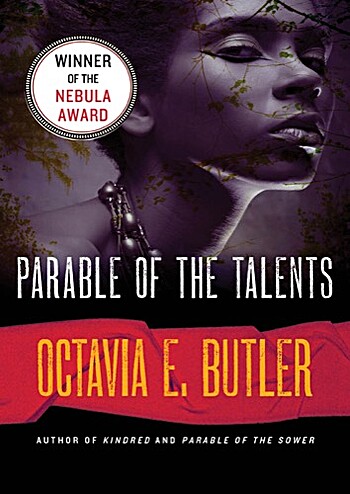
105. Parable of the Talents by Octavia E. Butler
Type: Novel
Original Language: English
Original Publication: 1998
Series: Earthseed (2)
Genre: science fiction, dystopia
Format: ebook
Publisher: Open Road Media Sci-Fi & Fantasy
Reading dates: 23 July 2021 - 25 July 2021
I wanted to love this book - I loved the first part of the duology and I came to this one with high expectations. And I almost did not finish it - not because it was a bad book but because it was so unimpressive at the beginning that I wondered if it may me better off to stay with the first book only. Once you go through the first 1/4th of the book, the pace and the story picks up and I am happy that I read it - even I did not like it as much as the first one, it is still a good book. And the two novels combined together are impressive - despite the beginning of this one.
The novel structure is similar to the first one - we are reading the journals of Lauren Olamina but we also get some entries from Bankole and a few more people and the entries we are getting are not selected by Lauren but by her daughter, at some point in the future, who also adds her own story and commentary at the start of each chapter. It is a slow start - the daughter story comes in pieces, not to spoil the story coming from the journals. And that's where something with the pacing seems to fall apart - the first quarter of the book sounds like the first book, except slower and more boring, as if Lauren herself selects what to publish/show.
The story picks up in 2032, 5 years after we left Acorn and its inhabitants. They had somehow survived and even if they are not exactly thriving, they had managed to make a life for themselves. After slogging through them surviving, living through an election that should not have finished as it did (reading this in 2021 makes me wonder what kind of crystal ball did Butler have...) and through more of the new religion Earthseed, the story finally picks up when Acorn is destroyed. While I can see why we needed that first part, it could have been a lot shorter and concise - the first book had most of it already and did it better... And then Larkin is born, Acorn falls and Butler finally gets to writing the story of Earthseed and Lauren Olamina.
Suffering, betrayals, people coming back after being considered dead, people dying when you least expect it and a lot of misery and heartbreak. The United States of the 2030s is anything but a happy place. But people survive and fight for their future and families. It is a cruel world, ran by zealots and idiots and it does not seem to be getting any better. But there is always a hope somewhere in there - as long as people can see future for their children, they will keep fighting.
And then there is the cult/religion Earthseed. We know that it did not die - Larkin knows about it and considers it her mother's favorite child. It is unclear early on if it is because it got widespread or because she is writing a paper about something in the past but the hints are all there. And despite it driving the story and is the point of the story, it still did not sit well with me - Lauren was getting almost zealot-ish in places, carrying more about an idea than about a person (despite what she was writing/saying, her actions showed something different). I disliked her in the first novel and I am not sure I liked her here either.
We get most of the story post-2035 only in the last chapter - I kept reading because I wanted that story. It did not disappoint but it kinda highlighted the pacing issue.
I wonder how much of my opinion of the book got colored by my expectations. I usually do not have issues with slow moving books but something here was off from the start. It felt like a book that should move faster but somehow failed to as opposed to being designed to be slow.
Still, it was worth reading. But I still find the first one to be the better book.
51AnnieMod
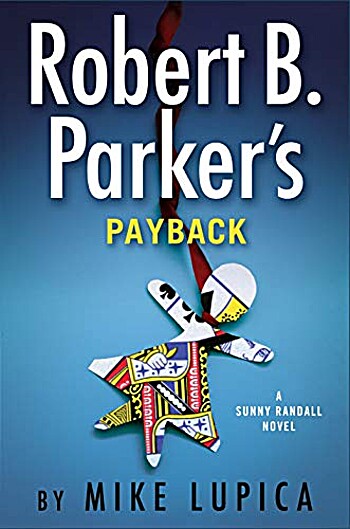
106. Robert B. Parker's Payback by Mike Lupica
Type: Novel
Original Language: English
Original Publication: 2021
Series: Sunny Randall (9)
Genre: detective
Format: hardcover
Publisher: G. P. Putnam's Sons
Reading dates: 25 July 2021 - 26 July 2021
With Lupica now writing both the Sunny Randall and the Jesse Stone series, the crossovers were expected. He gets both characters' voices quite well but the writing is still nowhere near Parker's.
This is the first novel in any of the series I am reading that deals with the post-COVID world. The timing is a bit wonky - the novel is supposedly set in October (2020?), with the pandemic sounding as being all but done and it sounds like it lasted longer than this timeline will allow for but it is fiction so that can be ignored - for all I know, it can be 2021 :)
With the pandemic raging, Spike was about to lose his restaurant so he accepted the help of a friend - signing papers he should not have. So now, with the world reopening and the restaurant finally getting back to normal, he finds himself in a big trouble - according to those papers, he does not own his restaurant anymore. So he asks Sunny for help - not that is is clear what she can do but if there is something to be done, she probably can do it.
Meanwhile, Lee Farrell's niece is beaten up and refuses to talk to anyone about it. So Lee asks Sunny to talk to her. And not very unexpectedly before long the two cases turn out to be connected - and Sunny manages to annoy yet another big group of gangsters - the Russian Mob (or parts of it anyway) and to tangle with the world of high stakes poker. Having a few bodies to deal with just makes her even less likely to drop the case - even when everyone she loves gets threatened.
In his attempt to ground the series in the shared universe, Lupica ends up with too many secondary characters - some show up for a chapter or two (Tony Marcus, the producer from LA who Sunny dated earlier), some are part of the story (Susan, Belson, Rita Fiore, Phil Randall, Lee Farrell, Jesse Stone (who also goes away for a bit), all the still living Burkes) , some are just name checked (Molly Crane in a memory, Vinnie is in Miami, Brian Lundquist checks some fingerprints without making an appearance, even Gino is mentioned a few times). It also feels like a checklist that needs to be covered - and even with the ones who make it to the story, it sometimes felt as if they were there just because they had to be.
And then there is Lupuca's style - he is still too worried to go for long dialogs so he will break them up by using "he said, I said" in non dialog form. Parker's novels were subtly using current events to make them current but without making them dated within a few years. Lupica's current events comparisons will date this one very quickly.
Despite the style issues, I actually enjoyed the book. The story works and I like the shared universe. The books are getting a bit formulaic but sometimes that's exactly what one needs. Don't start here if you had never read the Sunny novels but if you had read them (and the Spencer and Jesse Stone ones), this one will feel like an old friend.
52AlisonY
Now that's a serious effort at catching up on reviews! Glad to hear you're on the road to recovery.
I noticed a couple of Lucy Caldwell plays. What did you think of them? I've read one of her short story collections and a novel. The novel was enjoyable enough but lacking in a few areas - the short stories I enjoyed more.
I noticed a couple of Lucy Caldwell plays. What did you think of them? I've read one of her short story collections and a novel. The novel was enjoyable enough but lacking in a few areas - the short stories I enjoyed more.
53AnnieMod
>52 AlisonY: I still have 35 (if I counted correctly) left (plus 7 radio plays) in the March-June period but I will get to them as well :)
The three Caldwell plays are all radio-plays - which tend to be a bit different from plays. I liked them a lot but they are heavy plays - they are part of an (unofficial?) trilogy of plays about families saying goodbye (for different reasons). 2 of the 3 are still available on BBC: https://www.bbc.co.uk/programmes/m000sync, https://www.bbc.co.uk/programmes/m000sz8r (the one missing is Martians: https://www.bbc.co.uk/programmes/m0002hyg - as it is an older play, it stayed there only for 30 days this time). I had been planning on checking some of her other writings - need to see what the library has.
The three Caldwell plays are all radio-plays - which tend to be a bit different from plays. I liked them a lot but they are heavy plays - they are part of an (unofficial?) trilogy of plays about families saying goodbye (for different reasons). 2 of the 3 are still available on BBC: https://www.bbc.co.uk/programmes/m000sync, https://www.bbc.co.uk/programmes/m000sz8r (the one missing is Martians: https://www.bbc.co.uk/programmes/m0002hyg - as it is an older play, it stayed there only for 30 days this time). I had been planning on checking some of her other writings - need to see what the library has.
54stretch
I must have gotten stuck on Part 1. So much catching up to do. I've already added several books to my want list. Excellent reviews as always!
Just added everything I could of Anna Deavere Smith, I knew about these shows from videos, but never knew they were collected in one place before.
Just added everything I could of Anna Deavere Smith, I knew about these shows from videos, but never knew they were collected in one place before.
55AnnieMod
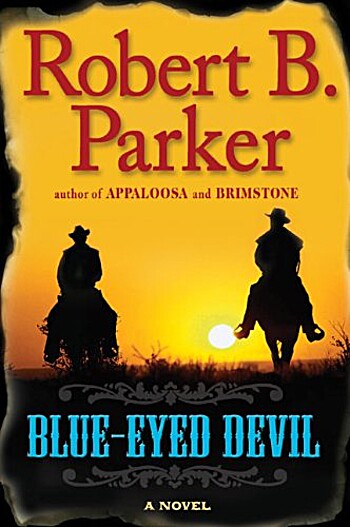
107. Blue-Eyed Devil by Robert B. Parker
Type: Novel
Original Language: English
Original Publication: 2010
Series: Virgil Cole and Everett Hitch (4)
Genre: Western
Format: Hardcover
Publisher: G.P. Putnam's Sons
Reading dates: 26 July 2021 - 27 July 2021
And after a few years of traveling (mainly chasing Allie), Cole and Hitch are back in Appaloosa when we first met them. While they were away, the town ha grown and now it has a police department (with a lot of employees) and the police chief Amos Callico seems to be keeping the peace well enough. At least on the surface that is.
Before long the truth emerges - Callico and his police department are indeed very good - as long as you pay them to protect you. The business owners who do not want to be pay are on their own - so they decide to hire Cole and Hitch instead - which the police chief really dislikes.
Then Pony Flores, the half-Mexican, half-Indian who helped to save Laurel and her mother back in Brimstone shows up with his half-brother who is in a bit of a trouble - a "killing a few people and robbing a train" kind of trouble. Staying in town is not possible but Cato and Rose are still in Resolution so Pony and his brother hide there for awhile. Until someone talks too much (and if you had been reading the series, you know that the someone is Allie).
Appaloosa burns - Callico is so sure that he knows better that he decides not to listen to Cole and lets Indians attack the town. But that fact does not stop the police chief for taking credit for the saved lives and things get complicated. Add a young man who dies because he is too drunk to realize that pulling a gun on Virgil Cole is a bad idea and a grieving father who hires a gunman to revenge the death and there are way too many people with guns and different agendas. Except that agendas shift.
The novel feels like a series wrap up - we see again pretty much everyone from the previous books, the story of Laurel finds a sort of a resolution and at the end Cole and Hitch are exactly where they started at the beginning of the first book (except for Allie - she is here to stay despite all of her shortcomings; as usual for Parker, once one of his leads falls in love, they get obsessed).
And somewhere in the middle of all the action and returning heroes, there is an underlying conversation about what law is in the territories and if justice and law are the same. Parker's books are often called simplistic and they can be viewed that way but there is usually some depth in them, even in these late books.
It is written in the usual Parker style - a lot of dialog, short sentences and quick action. And it made me wonder again what this series could have become if he had started it when he was at his best. But still - the 4 novels in this series are worth a read - not sure how well it will work for western fans but if you are coming from the other Parker's series, you may be pleasantly surprised.
The series is continued by Robert Knott. I am rarely enthusiastic for this kind of continuations but some of the other writers who continued the other Parker series had been pretty good at that so I plan to check at least the first books.
56AnnieMod
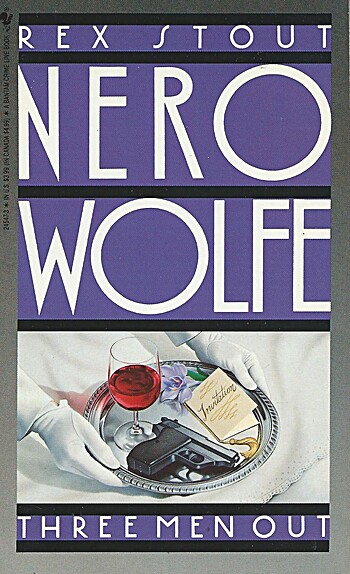
108. Three Men Out by Rex Stout
Type: Collection
Original Language: English
Original Publication: 1954; individual stories: 1952 and 1953
Series: Nero Wolfe (23)
Genre: Detective
Format: ebook
Publisher: Crimeline
Reading dates: 26 July 2021 - 28 July 2021
The 23rd Nero Wolfe book is a collection of 3 stories with varying quality.
"Invitation to Murder" (August 1953, The American Magazine, as "Will to Murder") is annoying. It could have been a great story but for some reason neither Archie, nor Nero Wolfe even suspect the obvious solution to the problem and while this is not the first time for that to happen, not having Archie even hint that they missed something while narrating the story makes it almost unforgivable. Admittedly, had they seen it earlier, the story would have been a lot shorter but still...
A man hires Nero Wolfe to investigate the death of his sister which happened 2 years ago. Of course, that is not the story he starts with and the only reason why he wants the investigation is because he is about to lose the money he expected to get. Archie is dispatched to the house of the brother-in-law and before long a body shows up. And somehow Archie misses all the obvious clues. On the other hand he manages to get Nero Wolfe to leave his own house and come to the house where the murder happened - which is not that easy.
"The Zero Clue" (December 1953, The American Magazine, as "Scared to Death") on the other hand is much better. Archie misses something again but he knows it and his narration accounts for it. A matematician, Leo Heller, had been using his knowledge of math and statistics to predict events. There is some bad blood between him and Wolfe because of an old case where they clashed so when he calls to ask for help, he is sent packing. Archie disagrees so decides to visit Heller. The two never meet and before long the mathematician is dead and Inspector Cramer manages to annoy Nero enough to ensure that the detective will try to solve the case. The solution can be considered a bit tricky but I enjoyed it - partially because I knew the fact that provided the key to the solution (math history is always fun) and partially because the pacing of the story actually worked well for its length.
"This Won't Kill You" (September 1952, The American Magazine, as "This Will Kill You") is set on the Giants stadium where they are playing their last game in the World series - the winner takes the trophy. Nero is out of the house again and ends up being uncomfortable and unhappy - and not only because of the baseball game.
The first chapter of the story is so heavy on baseball references that it is almost unreadable if you do not understand the game (I don't). But once this chapter is over, the game becomes irrelevant - doping a few players and killing another does not require any game knowledge; the investigation and the end solution also do not depend on knowledge of baseball. There is a woman involved (of course) and Archie ends up dealing with her (not surprisingly); Nero Wolfe uses a clue that everyone knows to actually solve the case (or cases - he is hired to investigate the doping and not the murder technically but keeping them separately proves to be hard). It is a nice story overall - despite the first chapter.
Overall a decent entry in the series.
57AnnieMod
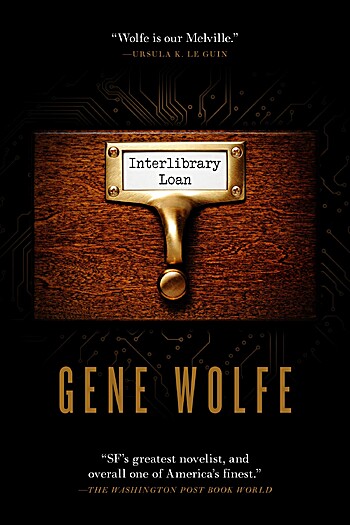
109. Interlibrary Loan by Gene Wolfe
Type: Novel
Original Language: English
Original Publication: 2020
Series: Reclones (2)
Genre: Science Fiction
Format: Hardcover
Publisher: Tor
Reading dates: 27 July 2021 - 28 July 2021
The continued adventures of Ern A. Smithe, a reclone of a mystery writer. Some time in the future, libraries do not contain only books - they also contain reclones - clones created from the DNA and recorded memories of authors and artists who can be checked out. These reclones have no rights - they are not considered human so they can be destroyed and abused if so the library patron wants (and they can be even bought by individuals).
In the first novel of the series we met Ern A. Smithe - a mystery writer who was checked out so he can solve a mystery. This time he and 2 more reclones are shipped to a different library on interlibrary loan. Once there, he is again asked to solve a mystery although this time it is even weirder than before. Some patience is needed at the early stages of the novel because half of the time it sounds as if the author keeps forgetting what the story is. The explanation for it will come - if you do no give up on the story.
And then there is the end of the novel. The key to what really happens is in the very last sentence - unless one wants to believe that the whole novel is full of plot holes and actions that cannot be reconciled. I wish that this part was developed a bit more (and I wonder if there was a third novel planned eventually to deal with that).
Just as with the first novel, behind the action there is a commentary on the publishing industry and the shelf-lives of books (in this case literally). It does not really put these in your face and one can read the story as an adventure one only (there is a sea travel and caves and dead people coming to live after all) if one wants. The doctor that tries to revive people while talking to the reclones should make one think about how life is seen in this future...
This is the last novel by Wolfe, submitted to the publisher shortly before the author's death and that probably means that the novel was not edited as much as usual. You can see some roughness but it is still readable if you do not forget that it is Smithe's voice that we are reading and that we are explained more than once why he sounds the way he does. It is not the best novel by Wolfe by a lot but I still enjoyed it a lot more than some of the publicity around it made me believe I would.
58AnnieMod
>54 stretch: Thanks. Well, the thread is a week old - I was just missing for awhile. And oops... sorry about the want list (nah, not really) :)
Anna Deavere Smith - I am not sure that all of them are published as books but more than one is. Unfortunately my library does not have any of the others and my ILL list waiting to be submitted is long enough as it is... But who knows - I may end up asking for a few at some point.
Even if I do not like everything I get, monitoring the Drama and Poetry subjects in my library had introduced me to quite a lot of things I would not even had known of otherwise.
Anna Deavere Smith - I am not sure that all of them are published as books but more than one is. Unfortunately my library does not have any of the others and my ILL list waiting to be submitted is long enough as it is... But who knows - I may end up asking for a few at some point.
Even if I do not like everything I get, monitoring the Drama and Poetry subjects in my library had introduced me to quite a lot of things I would not even had known of otherwise.
59AnnieMod
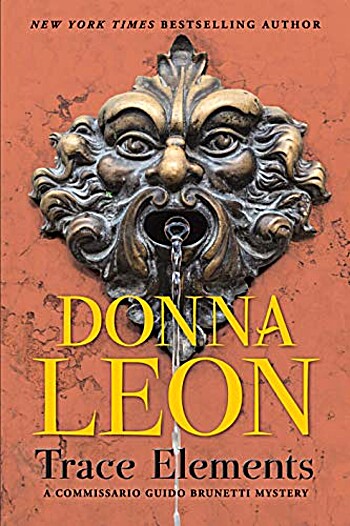
110. Trace Elements by Donna Leon
Type: Novel
Original Language: English
Original Publication: 2020
Series: Commissario Brunetti (29)
Genre: Crime, Police
Format: Hardcover
Publisher: Atlantic Monthly Press
Reading dates: 28 July 2021 - 29 July 2021
A dying woman asks the doctors in the hospice where she is spending her last days to call the police for her - she has a secret she does not want to die with. So Guido Brunetti and Claudia Griffoni go to talk to her but by the time finally have a conversation, all the woman can do is to give them a few utterances - "bad money" and "they killed him". None of them is actionable but the two detectives are intrigued so they decide to try to find out what is going on.
That's how the 29th novel in the Commissario Brunetti series starts. Before long a body shows up (ruled to be an accident initially) and the two detectives start connecting the dots. The husband of Benedetta Toso, the sick woman, had died a few weeks earlier in a motorcycle accident. But the more the police digs, the more things do not add up.
And then the story ties to the water supply of Venice - and its control. Knowing the title of the novel, you know where this novel is heading - the man who died was taking probes from water, looking for contaminants. So for the reader it becomes a question of following Brunetti and Griffoni until they realize the connection and find a way to explore it and find a killer.
While the murder and the water contamination are the main stories, the story of the corruption of the Venice police is also there - from the story of the two Rom girls to the final decision that Brunetti needs to make. Patta is his usual self-protecting self, we learn a bit more about Claudia Griffoni than before and we get to see Venice in the middle of a hot summer when everyone tries to escape the city - except for the tourists.
The novels in the series, especially the later ones, had been getting into grey areas often. Brunetti has his own code of behavior that sometimes does not match the laws exactly as existing - and this novel pushes that even more than usual. And he starts exploring his own reactions to people who are not originally from the area. While the topic is interesting, I do wonder if this self-examination is caused by the times we live in and if Leon felt like she had to go there so she does get accused of not doing it. Brunetti had always had his opinions but they had never been expressed as strongly as they were here when he finally started to explore his own thinking.
It is a decent addition to the series but it is not my favorite novel - I like the dynamics of Griffoni being paired with Brunetti more often than not and the topics it allows to explore in the Italian culture and society but sometimes it seems to be way too much in your face - both because she is a woman and Neapolitan - she is treated more like a slogan and not a real woman. But then it may be needed. Off to the next book now.
60rocketjk
>40 AnnieMod: I enjoyed catching up with your reviews this morning! If you ever do decide to Kim Addonizio's poetry another try, I highly recommend her collection, Tell Me. I can't find the touchstone, but the book's Main Page is here: https://www.librarything.com/work/4047526/summary/26952921
(Full disclosure: Addonizio is a friend of mine from grad school days.)
(Full disclosure: Addonizio is a friend of mine from grad school days.)
61AnnieMod
>60 rocketjk: I'll note it down. Not available from the library (the new one I just read is the only collection they have from her) but I will keep an eye for it.
Modern poetry can be... complicated. :)
Modern poetry can be... complicated. :)
63kidzdoc
Black Girl, Call Home sounds great, so I've added it to my wish list.
I bought a ticket to see Notes from the Field by Anna Deavere Smith during the 2018 Edinburgh International Festival, but unfortunately she decided to cancel her appearance there.
I bought a ticket to see Notes from the Field by Anna Deavere Smith during the 2018 Edinburgh International Festival, but unfortunately she decided to cancel her appearance there.
64baswood
Good to catchup with your reading especially when you comment on a series that I have dipped into, like Donna Leone's Commissario Brunetti and Rex Stout's Nero Wolfe.
65AnnieMod
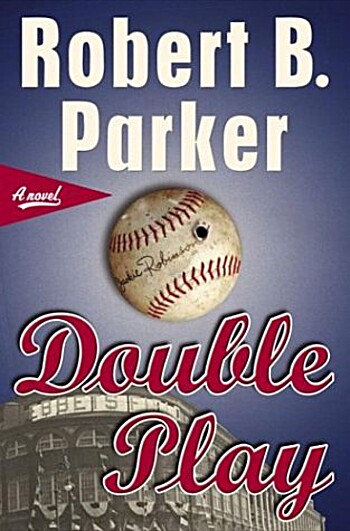
111. Double Play by Robert B. Parker
Type: Novel
Original Language: English
Original Publication: 2004
Series: N/A
Genre: Crime, Sports
Format: ebook
Publisher: G.P. Putnam's Sons
Reading dates: 29 July 2021 - 30 July 2021
Joseph Burke is a broken man - the war spat him out with a lot of damage, his wife found someone else while he was in the hospital. So he just stopped feeling and closed up.
It is 1947 and USA is recovering from the war. Burke finds random jobs in New York and by being tough and impossible to scare makes him the perfect bodyguard for a wild girl with a connected father and even more connected boyfriend. Until he kills someone protecting her and gets himself fired and hired by the dodgers to guard their newest player - Jackie Robinson.
If you are expecting a baseball book, look elsewhere. If you are expecting a Jackie Robinson book, look elsewhere - even if Jackie is part of the book, he is the secondary character and the introduction makes clear that the whole story is fictional.
Instead Parker uses the setup to tell a story about racism and acceptance. There are gangsters and dames, there are crowds and women who want to sleep with anyone famous. And someone under all that Burke slowly finds a way to feel and even love again.
While the baseball parts of the novel did nothing for me (including score cards and so on), they did not really bother me. They mostly fit into the story and it did not really distract from the story. What really boggled down were the "Bobby" chapters - a (semi-?)autobiographical stories of Parker himself - growing up loving baseball, becoming a teenager and being very proud of not being racist. They served no purpose except to pad the pages and they tasted like over-sugared drink - a grown up vision of what his past had been and using his grown up understanding to highlight things. Don't get me wrong, all of that may even have been true but... it neither belonged in this novel, nor sounded sincere.
This is one of the standalone novels by Parker. He used them to try new genres and styles. Burke's story actually works - it may be over-exaggerated in some places but it works in the same way the radio drama of the period works. And a lot of what it has to say and show is relevant. But it gets boggled into the rest, making the whole a lot weaker novel than it could have been.
66AnnieMod
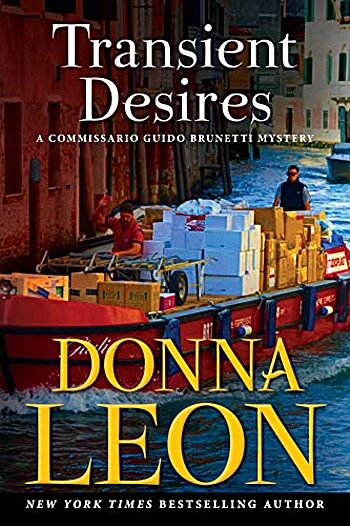
112. Transient Desires by Donna Leon
Type: Novel
Original Language: English
Original Publication: 2021
Series: Commissario Brunetti (30)
Genre: Crime, Police
Format: Hardcover
Publisher: Atlantic Monthly Press
Reading dates: 29 July 2021 - 31 July 2021
Two girls are left on the deck behind a hospital and only a chance (and a smoking habit) makes sure that they are found quickly - both are beaten up and require medical assistance. Brunetti and Griffoni try to find out what happened and before long they find the boys/young men who left the girls. And as is usually the case, not everything is how it looks.
Before long, this almost innocent occurrence gets tied to a harrowing tale of human trafficking, the Nigerian mafia and death. And for the first time in the series, Claudia Griffoni's home town becomes important - first when they meet someone else from the same place and then when not being from Venice makes it easier to figure out how to track down someone's history.
Usually in the series the Questura's detectives and policemen work on their own - they may leave Venice for the neighborhood towns but the stories tend to stay local. This time they get help both from the Carabinieri and the Coast Guard - despite starting in Venice and involving Venice citizens, the crime is a bit wider-scoped and there is a need for the special knowledge and skills of all the groups.
All that made this a different novel in a lot of ways but even with the differences, it is a Brunetti story - with the family and the HQ dynamics; with Venice's canals and tourists.
It is a post-COVID novel without being obvious about it - there are a few throw-away thoughts and utterances to tell you so (a thought about seeing what the city was without tourists, someone mentioning that they hoped that the cruise ships had all died and the thought about the retired doctors and nurses which came back to help despite knowing that their colleagues had died were the three I caught; there may have been more). Venice is almost back to normal but not completely. It may be a bit too early in the real world but I like how Leon handled the whole situation.
I liked this one more than I liked the previous one - even though it has a lot of us vs. them (some of it leading to Brunetti considering if he can even trust Claudia), it actually belonged in the novel - and the resolution of most of it should make it almost impossible to get back to the weirdness of it in the next novel. Or so one hopes.
67AnnieMod
And that's all for July:
Total books: 35
Novels: 24
Poetry collections: 6
Plays: 2
Collected comics: 1
Collections: 1 (3 stories)
Novellas: 1
Which is more than I usually read in a month - recovering from the previous two months of almost not reading got me into over-reading I guess. :)
Most of my reading was in the series I like - which is not unusual.
Total books: 35
Novels: 24
Poetry collections: 6
Plays: 2
Collected comics: 1
Collections: 1 (3 stories)
Novellas: 1
Which is more than I usually read in a month - recovering from the previous two months of almost not reading got me into over-reading I guess. :)
Most of my reading was in the series I like - which is not unusual.
68AnnieMod
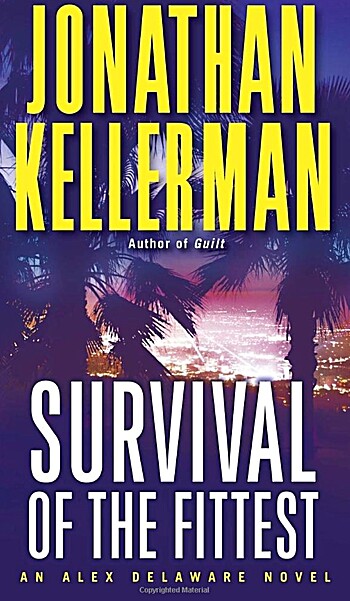
113. Survival of the Fittest by Jonathan Kellerman
Type: Novel
Original Language: English
Original Publication: 1997
Series: Alex Delaware (12)
Genre: Crime, Police, Thriller
Format: ebook
Publisher: Ballantine Books
Reading dates: 31 July 2021 - 1 August 2021
First a young policeman kills himself in a diner and Alex is asked to talk to the young man's sister. Then Milo gets handed a cold case - a disabled Israeli teenager had been killed. Both cases do not seem to have anything in common - except knowing how Kellerman tends to build his novels, a reader of the series knows that the stories will connect.
But before that happens, another teenager dies - and before long it seems like a very unusual serial killer had been praying on the disabled of the city. The book is written in 1997 and its language shows it - the term retarded is almost impossible to be heard now while back then that was the preferred term, clinically and otherwise.
And Alex and Milo are off trying to find out who is killing some of the most vulnerable people in LA. Before long they get unexpected help - the now retired Gene and his Israeli friend Detective David Shadravi (both from "The Butcher's Theater" - there are also a lot of spoilers and an update about some of the people in Israel so if you had not read this one yet and plan to, you may want to do that before you continue with the current book), the young Petra Connor (who is about to get her own series which will often weave through the main series) and a few more experienced detectives; even Rick and Robin get bigger roles than usual. And Milo mentions Decker - Faye Kellerman's series detective thus making it clear that the two series exist in the same LA.
It should be an overcrowded book but it is not - everyone fits and everyone seems to contribute in a way that noone can.
When the truth start emerging, it appears to be almost unbelievable. And yet - humans can be cruel and that's exactly what happens here. The very end keeps you reading - just when you think that everything is sorted out and all remaining is to catch the bad guy, things get complicated - not everyone had been dealing honestly and that leads to Alex getting in real trouble.
Despite the dated language, it is a good addition to the series. It won't be for everyone - it is as bloody and gory as most of the books in the series but if one likes the series, it should work.
69AnnieMod
>63 kidzdoc: I will be interested to see what you think of Black Girl, Call Home if you get around to it. And apparently I was the last person to hear of these plays by Anna Deavere Smith :)
>64 baswood: Stay tuned - Nero Wolfe should be a a regular visitor in the next months :)
>64 baswood: Stay tuned - Nero Wolfe should be a a regular visitor in the next months :)
70kidzdoc
>69 AnnieMod: Ha! You're definitely not the last person.
71AnnieMod
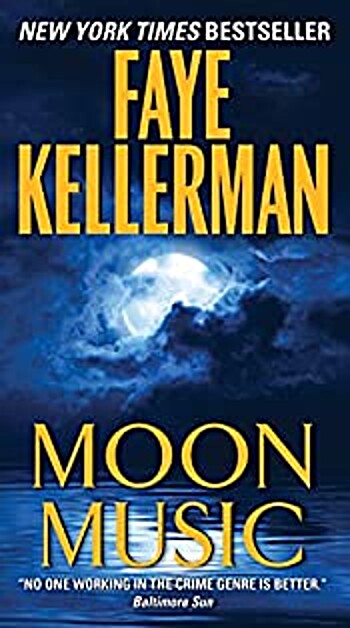
114. Moon Music by Faye Kellerman
Type: Novel
Original Language: English
Original Publication: 1998
Series: N/A
Genre: Crime, Supernatural
Format: ebook
Publisher: William Morrow
Reading dates: 1 August 2021 - 2 August 2021
That was one mess of a novel.
The horribly mutilated body of a young woman is found in the desert around Las Vegas. The lead detective on the case, Romulus Poe, soon realizes that the victim is a known call girl who had been a one-time fling of Steve Jensen, his colleague, but as Steve seems to have slept with everyone in Vegas, he decides to keep him on the case. And for most of the novel, this is the most rational of his decisions.
Another body follows, a 25-years old unsolved murder rears its head and a powerful man seems to be somehow related. And then there is Alison - Romulus Poe's old love, now Steve Jensen's wife, who is pretty disturbed mentally. Throw in NTS (Nevada Test Site), Native American believes (Poe is part-Native American), dust storms, love stories and a lot of sex.
The story of the murders is interconnected with the slow deterioration of Alison's mind. There are some hints through the novel that there is something supernatural going on although there is also the very real possibility that it is all in Alison's head. That ambiguity is there to the very end... except that without the supernatural elements, the story does not work. And that is the main problem in the novel.
I like supernatural novels. I even like the borderline ones which can be read either way. Here it felt almost as a cheat - there was no other way for the novel to work but the author was not ready to make it a supernatural novel. Which is always annoying.
Despite a lot of questionable decisions (both personal and professional), the characters mostly work - people are messy, noone is perfect. Some elements may be a bit on the nose and even cliched but even they do not annoy too much. And where the story ends is almost satisfying (despite that last ambiguity of normal world vs. the supernatural - and even that is also explored in those last pages - the characters actually comment and explore the ambiguity).
If one expects anything close to the Decker series, they will be disappointed - this could not have been further away. Kellerman uses the standalone to play with different style and language and not to successfully at that.
72AnnieMod
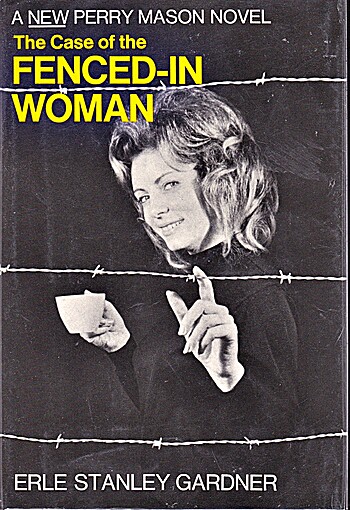
115. The Case of the Fenced-In Woman by Erle Stanley Gardner
Type: Novel
Original Language: English
Original Publication: 1972
Series: Perry Mason (81)
Genre: Mystery, Legal
Format: hardcover
Publisher: William Morrow
Reading dates: 1 August 2021 - 3 August 2021
After Erle Stanley Gardner died, two complete Perry Mason novels were found in his papers. His publishers decided to publish them anyway - with a warning about the lack of editing and checks that Gardner usually did before publication.
This is the first of those 2 novels and the 81st Perry Mason novel to be published. It is unclear when exactly the novel was written - it was set aside at at unmentioned time so it could have been an earlier novel. The lack of editing shows in places - both in Mason's character (while he had always had an appreciation of the female form, some of his remarks here are borderline disturbing) and in the dialogue (I wonder if some of it would not have ended up cut or reassigned - Mason explaining the intricacies of a certain law provision to Della and Paul in the middle of a courtroom is a bit out of character for example). But despite the somewhat rough beginning and some weirdness later in the book, the story is actually interesting.
Morley Eden buys two plots from the same man, Loring Carson, and hires him to build a house straddling both lots. Except that it turns out that one of the lots did not belong to the developer - a divorce judge awarded it to his ex-wife, Vivian after Carson smeared her name publicly by having a private detective follow a different woman and using what he found in his divorce paper (why he did not even look at the pictures before submitting them is unclear and makes you strongly believe that the mix-up was intentional). Vivian decides to annoy Loring and cause issues with him so she takes possession of half of the house - after stringing barbed wire across the whole property - driveway, house, pool and all.
That's how the novel opens - Eden comes to Perry Mason to ask him to file a suit against Loring for deceiving him about the property's ownership. Perry decides to get involved and before long he is called to defend Morley Eden in court - Loring Carson is killed and the suspicion falls on our unfortunate house-buyer.
There are more beautiful women than you count - both in Los Angeles and in Las Vegas where a lot of the action happens, Lt. Tragg ends up chasing Mason across state lines and somewhere in there the truth starts emerging - everyone seems to have wanted to kill the man - frauds and concealing his wealth had apparently been normal for him.
The only one missing from the usual cast is Hamilton Burger - he sends a deputy instead (which as usual means that there will be a big blunder somewhere in the courtroom - not that Burger did not make a lot of blunders but his were rarely as spectacular as the ones of his deputies).
It is one of the novels where a reader can actually figure out the solution - there are no legal tricks or crazy ideas that pay off. It is not obvious but the clues are all there.
Overall a good addition to the series, despite the somewhat weird beginning of the story. And that leaves only one novel in the complete series (if we do not count the two in Thomas Chastain continuation 2 decades later).
73AnnieMod
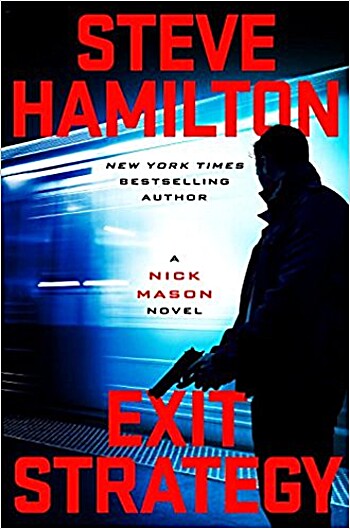
116. Exit Strategy by Steve Hamilton
Type: Novel
Original Language: English
Original Publication: 2017
Series: Nick Mason (2)
Genre: Crime
Format: hardcover
Publisher: G.P. Putnam's Sons
Reading dates: 3 August 2021 - 4 August 2021
Nominations: Barry Award (Best Novel)
Nick Mason is still trapped in the deal he made - get out of prison as a free man but spend the next 20 years as the killer for a Chicago drug boss. Nick is not an angel but he still has a conscience so even if he goes around and kills everyone who is pointed to him, he tries to just incapacitate anyone else who gets caught in the crossfire.
The first novel never revealed while exactly the drug boss, Darius Cole, needed Nick specifically - while he is good at what he does, one would imagine that there were a lot of other people who could do the job. Having Mason's daughter and ex-wife to keep him obedient did not really made it enough. This novel finally gets to what the long term plan was - killing minor rivals and annoyances was never the point.
Cole is in prison for life - unless he manages to overturn his sentence. And that's exactly what he had been working on - with legal (and extra-legal) means until he is granted and retrial - and then with Nick there to kill everyone who can keep him in jail.
And Nick does what he is asked to - even when he understands what that may mean, he cannot afford not to. The chase and murders are almost cinematographic, even the choppy structure of the chapters adds to that feeling. But somewhere in the middle of all that, Nick finally rebels - and start looking at the ways he can escape his bonds.
A lot of people die - some killed by Nick, some go down while trying to deal with an unwilling witness, some as just being in the wrong place at the wrong time. Every time you can see the noose slipping from Nick's neck, something puts it back - tighter than ever. Being around Mason is a lethal business - and if you get too close, you need to run or you die. Especially if you are a woman.
And then the end pulls the rug from under everyone's feet. When I read the first book in this series, it was built as a standalone, allowing for a continuation. This second novel does not even pretend that it is not a series book - the story itself is closed but this ending is an opening for the next book and for a new direction for the series.
The third book in the series was scheduled for 2019 but never came out. I had not seen a new date for this book so it is unclear if it is still in the works or if Hamilton gave up on it. I hope it comes out one day.
===
And with this I am done with all the Hamilton novels - I still have a few stories to read but that was the last of the novels I had not read. He really needs to get to writing a new one...
74AnnieMod
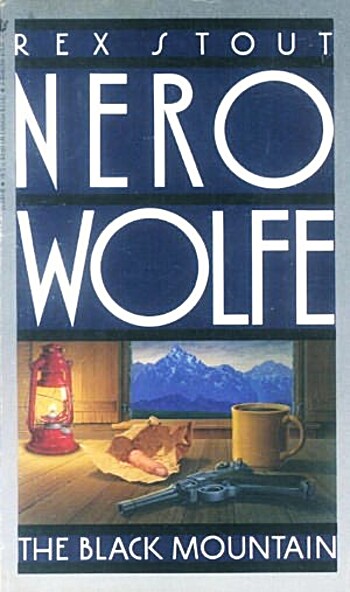
117. The Black Mountain by Rex Stout
Type: Novel
Original Language: English
Original Publication: 1954
Series: Nero Wolfe (24)
Genre: Mystery
Format: ebook
Publisher: Crimeline
Reading dates: 5 August 2021 - 6 August 2021
In most Nero Wolfe stories and novels, Nero does not leave his house. When he does, it is usually either because of his orchids, food or Archie - and even then, he goes somewhere, finds a place to sit and just does what he usually does in his office. And then there is this novel.
Marko Vukcic, the restaurant owner and Wolfe's best friend since they were boys in Montenegro, is killed. Once Nero Wolfe gets the news, he surprises everyone by showing up at the scene and then even going to the morgue for the first time in his life. Unfortunately, none allows him to even start figuring out what happened so he returns home - to a visit of a woman he had not seen for a long time - his adopted daughter. Before long it starts looking very likely that the murder is tied to Marko's work with an illegal organization back in Montenegro. Once a second death is reported, Nero is off, with Archie of course, to Italy and from there illegally into Montenegro.
It is a frustrating novel in more than one way - from Archie belly-aching every second page about how he cannot understand a word and needs Nero to translate or how unusually Wolfe behaves to characters which reads more like caricatures than real people. Traipsing around the mountains of Albania and Montenegro is not what you expect in this series - and the solution of the mystery almost falls into out laps (and Nero's) out of nowhere. We get to learn a lot more about Nero's past but that does not really help the novel much.
Maybe if the narration had shifted to Nero, it would have worked a lot better - the novel is upside down on who does what - with Archie not speaking anything but English (and he even has issues with the announcements in London where he asks what language they were in just to be told that it was English) but the narration stays with Archie and his reports based on what Nero translates (or does not). With Archie narrating, things just get annoying - his style works in New York but here his cleverness and puns misfire more often than not and the constant grumbling starts to get on one's nerves.
Definitely not my favorite book from the series.
75AnnieMod
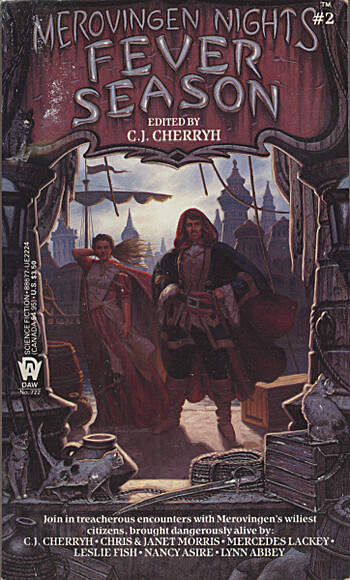
118. Fever Season edited by C. J. Cherryh
Type: Anthology (kinda)
Original Language: English
Original Publication: 1987
Series: Merovingen Nights (2), Alliance-Union Universe: Publishing order (19)
Genre: science fiction
Format: mass market paperback
Publisher: DAW
Reading dates: 4 August 2021 - 6 August 2021
The books in this series are credited as anthologies so I will keep to it although they also can easily be considered multi-author novels - the story flows almost cleanly from story to story - in a lot of cases you actually need to remind yourself who wrote a story.
The second anthology (and third book overall) in the Merovingen Nights series starts shortly after the previous one closed. If you had not read the novel that started it all and the previous anthology, this book will be quite annoying (not to mention that it will spoil the previous 2 books for you). If you read the previous 2 and liked them, you will probably like this one as well.
Generations ago an alien race, the sharrh, defeated the human inhabitants of the planet of Merovin and left them stranded and away from the human civilizations of the Union and the Alliance, without the technology used to get them there. Humanity survived - it split into factions (which got more and more different with time) and built its world, forgetting the stars and that they are not alone. Even the sharrh are only a myth, one that most people do not believe in. By the time the series opens, the aliens are used only to keep people in line - at least in most of the the planet cities - some religions still believe in them. The whole series is a political thriller in the middle of a planet like no other.
In this anthology, we pick up where the previous one left off - after the Sword of God attacked the rulers of Merovingen and used the opportunity to get their spies inside of the city, the machinations of all the groups just continued. It is the season of the Plague - every year people die from the malady coming from the river. Merovingen, the city where the story is based in, is similar to Venice - with the canals at the bottom - except that a whole city is literally built on top of them - the more money you have, the higher you live.
One of the plot-points of the first anthology was the Janes (one of the three main groups) trying to eradicate the Plague in Merovingen. It may have worked - but that does not mean that people do not get sick - and this time one of them is Tom Mondragon - the assassin/spy who is at the center of the story. Being sick and trying to do your job is hard regardless of what you do - doing this kind of a job is impossible. So things get a bit complicated.
The first anthology introduced a lot of new characters, each of them connected to someone we knew from the first novel or to someone introduced earlier. Except that this is a very small city - so before long the lines started to cross and people who were parts of different stories got mixed together. I suspect that by the end of the series, the lines will be so thick and the connections so complete that it will be just a big blob in the middle, with everyone connected to everyone.
The political machinations continue, everyone seems to have at least 2 different agendas (except for the ruling family, the Kalugin, who seem to have only one goal - staying at the top for the father; getting to the top for the children), Rif and the Janes seem to try to continue with their cleaning job (although as it turns out, they are not shy to use some bio-terrorism elsewhere, a few minor characters get snagged into the action and the love story in the middle of it all had almost settled down into normalcy (even if Altair Jones seems to still not believe it most of the time). And some of the mysteries from the previous book are still not resolved.
It is an adventure story with things changing and getting more tangled with every page. I am really enjoying the whole series - a lot more than I expected to. I was worried how the anthology format will work but you sometimes forget you are in an anthology - the styles are a bit different but they blend well together and the story flows through the book, with Cherryh's fragments connecting them and weaving them together. But the separate stories also reuse the same characters with continuity and characteristics and the whole story reads more like a novel than an anthology.
76AnnieMod
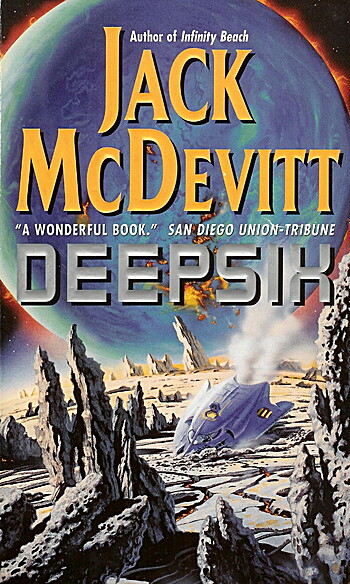
119. Deepsix by Jack McDevitt
Type: Novel
Original Language: English
Original Publication: 2001
Series: The Academy: Priscilla Hutchins (2)
Genre: Science Fiction
Format: hardcover
Publisher: Harper Voyager
Reading dates: 6 August 2021 - 7 August 2021
Maleiva III is one very unlucky planet - another world, Morgan's World, ejected from its own star system a long time ago is on a collision course with it - and due to the sizes of the two planets, Maleiva III is about to be annihilated while the much bigger gas giant will just pass and continue on its part, grabbing some dust along the line.
Of course the problems on this planet did not start with Morgan. Three thousand years earlier, the whole star system ended up inside of a dust field which caused the previously Earth-like planet to enter a severe Ice Age. Had it not been for the disaster about to hit it, it would have exited the dust a few hundred years in the future, making it possible for humanity to terraform it. As it is, the Academy dispatches a team to look for signs of civilization - just to lose most of it to the local fauna. As neither the people on the ground, nor the scans showed any intelligence, the politics of the Academy took over and the planet was never revisited. And now, 20 years or so later, the collision is about to happen and for the first time since that fateful expedition in the last years of the 21st century, the world looks again at Maleiva III. A ship full of scientists is in the area to observe the collision and learn a lot more about the universe.
Except that the first thing they discover are signs of civilization - under the ice, big cities start becoming obvious, with weeks left before being lost forever. They seem to be medieval-level - so it seems like the inhabitants of Deepsix (also known as Maleiva III) never made it to the stars. And the ship of scientists has no archeologists - noone expected to find anything ON the ground. So Priscilla Hutchins gets rerouted and declared an archeologist (despite being just a pilot - but at least she has an idea what she is doing) and sent on the ground to investigate. Before long a ship full of tourists also show up and one of them, an author who is everything you would have hoped to not exist in the 22nd century in his attitudes towards women, decides that he is important enough and flies down to the ground. And disaster strikes - although things do not look too bad - help is on the way.
While all this is happening on the planet, things get even more complicated - the scientists find an object in orbit which appears to belong to a civilization which does not match what is on the ground and a sorry excuse for a human being puts corporate interest ahead of human life and the disaster turns lethal. Hutchins and the team on the ground goes on a long march to try to save themselves - and everyone up in orbit decides to work on a plan B - McGyver would have been really proud of them. And even knowing that there are later Hutchins novels, due to the difference in time between the two novels, the rescue was not really guaranteed. Which made the end of the novel better. And while everyone is working on rescuing the remaining 4 humans, we slowly learn the story of the planet and what happened to the people who called it home.
McDevitt's style is not for everyone - he gets extremely technical and spends more time on technology, natural sciences and archeology than on characters. An yet, he made me care about everyone on the ground - even if some of them were cartoonish in their descriptions and more types than people, the action carries the story.
The novel is the second in the Academy series but it only mentions the Omega clouds which were found in the first novel - Deepsix and its issues are not related to the clouds in any way or form. It technically contains spoilers for the first novel (so it is not a good idea to read it if you plan to read the first) but it is a standalone story which does not need the first novel. I hope that later novels will get back to the clouds.
Another enjoyable novel by McDevitt - as long as you are ok with his style.
77AnnieMod
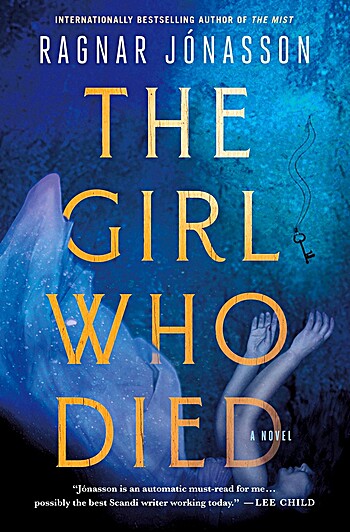
120. The Girl Who Died by Ragnar Jónasson, translated by Victoria Cribb
Type: Novel
Original Language: Icelandic
Original Publication: 2021 in English; 2018 in Icelandic (as Þorpið)
Series: N/A
Genre: Crime, Ghost
Format: hardcover
Publisher: Minotaur Books
Reading dates: 7 August 2021 - 7 August 2021
The first standalone novel by Ragnar Jónasson translated into English is a bit different from his series books.
Skálar is a small village on the tip of the Langanes Peninsula in the far northwest side of Iceland. There are only 10 people living there but as there are two little girl, they decide that they need a teacher and advertise for one. The story is set in the mid-1980s - pre-internet and with Iceland still being mostly an isolated country and not the tourist attraction it had become lately.
Una grew up in Reykjavík but her life had not been going the way she expected. So she decides to respond to the ad and to go to Skálar for the school year. She expected the cold (and lack of snow) but as she had never lived outside of the big city, she really did not realize how connected small places are, especially such small communities. The locals are not exactly welcoming for the most part - even if some of them seem to be, she feels more and more isolated. Until one of the residents die just before Christmas and things get even worse. Una's drinking does not help matters - not easy to hide it in a small village - and it is unclear if her visions of ghosts are real - or caused by the red wine she liberally uses to calm herself.
Alongside Una's story, we also get flashes from a different story - a murder which does not seem to be related in any way or form to the story in Skálar. It is clear that it will get connected but it takes most of the book to finally connect them and allow for the stories to merge.
And under the whole story of ghosts and solitude is a story of acceptance and what makes a community. The locals can sound a bit exaggerated in places but surviving in the wildness makes one's oddities odder so they sound believable.
By the end we get solutions for more murders than we actually have in the book - and Una's story makes a full circle.
Even if the novel is a crime one (and there are killed people), it is also a portrait of solitude and community. The "Dark Iceland" series explored the topic of the outsider in a small community but the Ari Thór Arason's world is a lot bigger - Skálar is a very different story. I am not entirely sure about the very end of the novel - its implications can send the novel into the supernatural realm if one wants to read it that way - but even with it, it was a satisfying novel.
78AnnieMod
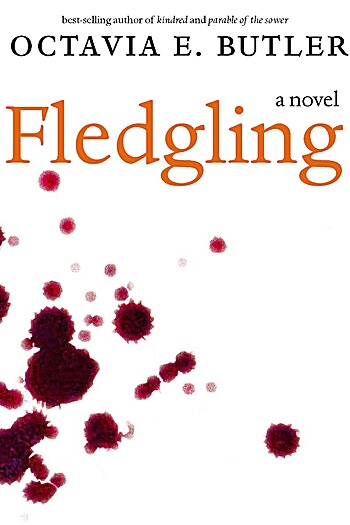
121. Fledgling by Octavia E. Butler
Type: Novel
Original Language: English
Original Publication: 2005
Series: N/A
Genre: Science Fiction
Format: hardcover
Publisher: Seven Stories Press
Reading dates: 8 August 2021 - 8 August 2021
The Ina had always been here alongside humanity. They have longer written records than us and they can pass for us - except that they cannot survive under the sun and they need human blood to survive. Yes, they are the vampires of all the mythologies of the world - except as usual things are not exactly as myths will make you believe them to be.
We do not know this when the novel starts - we are in the head of a creature who can reason but has no memories of what happened. She is badly hurt but seems to be recovering. No memories come back but some feelings and knowledge occasionally filters in and allows our narrator to find some security for awhile. She is the only survivor of her household - everyone else died in the fires that destroyed her home - and when she finally finds someone else who knows her and give her back her own name, Shori Matthews, they get destroyed as well. And she is off, trying to find what happened to everyone and why and hot to survive and keep her people safe.
Shori is different - she is black in a race consisting of pale white people. Her family had been playing with genetics after they realized that the answer to the biggest problem for the Ina is melanin - while Shori still burns under the sun, she can stay awake during the day and she can even survive in the light for awhile if needed (although she blisters a bit). And it becomes clear before long that this is the reason for the violence that engulfed the Ina - they may be a different species but they seem to have learned racism from their human companions.
The novel can be disturbing in places - Shori is 53 but he body is that of a 10 years old girl and that makes all of the sexual scenes very disturbing - none of them is really explicit but they are in there. It is an exploration of the difference - you need to remember what she is (even when we did not know what the Ina are, we knew she was different and that she can control people we her bites). It is a coming of age story for an amnesiac child (even if she is old enough in human years, she is still an Ina child - even if that means something else for them) and it is an exploration of a race which looks like us but is not human. The latter part of the novel deals with the politics of the Ina and that's where you start realizing just how different they are - from keeping symbionts (humans tied to Ina) to their understanding of personal freedoms and choices.
This is the last novel published by Butler and it may have become the beginning of another series - the story itself has a good ending in the book but it could have easily been continued. She does not shy from bringing in various vampire lore and myths - sometimes confirming them in her story, sometimes ridiculing them. The Ina are not Dracula and yet they come from the same region and some of their stories match - every myth has a kernel of truth.
Using the vampires to explore gender roles and racism is not something you will see every day. In less capable hands, it could have become a joke. Butler pulls it off - it is not a perfect novel but it is a very good one. And just like Lauren in the Earthseed series, Shori is a flawed young woman who is trying to keep the people she feels responsible for safe. And while doing that, she makes mistakes, people die but ultimately she follows her own path, learning about the world and herself in the process.
PS: Vampires tend to be automatically fantasy but these ones are closer to Science Fiction than to Fantasy IMO.
79BLBera
Great comments on the Butler, Annie. I've loved the books by her I've read, and even though vampires are not really my thing, this sounds intriguing.
80AnnieMod
>79 BLBera: You may actually like the book more than someone who thinks that vampires are their thing really - Butler turned a lot of the lore on its head (the different species means that humans cannot become vampires but they get to live longer as symbionts for example) and she almost makes fun of the more ridiculous parts of it. Plus staying in the head of Shori who had forgotten everything and learning about the world together with her is a marvelous choice. It gets you really unsettled intro you get it in your head that she is not human and even then, your brain occasionally insists that she is a 10 years old child and this is not normal. Then you snap out of it. Not that other authors had not played with vampires who look physically like children but this one feels different.
81AnnieMod
Back to June to fill in some missing reviews:
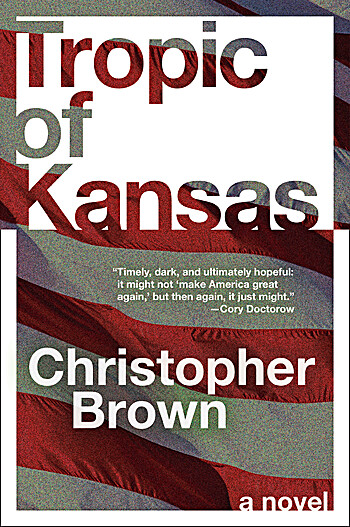
73. Tropic of Kansas by Christopher Brown (aka Chris Nakashima-Brown)
Type: Novel
Original Language: English
Original Publication: 2017
Series: N/A although there are later novels in the same world
Genre: Dystopia, Alternative History
Format: paperback
Publisher: Harper Voyager
Reading dates: 7 June 2021 - 13 June 2021
In a near-future alternative America, the country had turned into an authoritative state with drones and a government monitoring and controlling everything and everyone. When the novel starts, it appears that it is a future America as it is now but the clues keep adding up - some small and easy to miss, other much bigger (if nothing else clues you in, the assassination of Ronald Reagan in 1981 will get your attention when it is mentioned). It is an alternative history without getting too away from where we are - some things happened different but the main storyline survived thus allowing current politics and trends to still be valid and in play - with a bit of a twist. Nothing extremely bad happened - but the small changes tipped the country in one too many wars, added more stress to the internal issues and tipped the whole country into something new.
The novel alternates between two viewpoints - Sig, a young teenager who does what he needs to so he can keep alive, and Tania, a government employee with somewhat unorthodox connections who is asked to track him down due to her past connection with him - Sig used to live with her family for awhile so she considers him a brother. The story can get almost choppy at parts - the chapters are usually very short and you get yanked out from the story just when it starts picking up. On the other hand that structure mirrors the fractured country so it actually makes sense. Their meeting is inevitable, Tania's reluctance to work inside of the system she belongs to is obvious from the start so there is never even a hint of this novel not going where it is going.
At the heart of the novel is a rebellion - Americans finally trying to get back the freedom which was lost in the last decades. The country is bleak and it is not just the political system that had changed - the changes had allowed the devastation of the land as well, leaving only pockets of people and land that looks almost normal. We learn what happened slowly - sometimes with a character explaining it, sometimes just with a hint and sometimes just because some of the story parallels ours and you can draw your own conclusions (sometimes wrongly).
It is not an easy novel to read - between the story itself and the style, it can get almost tedious in places and especially towards the middle it feels like a slog. But then again, that mirrors the history it is being shown to us and as such it is logical. The lack of exact time markers for most of the story can add to the confusion but they can be worked out from the story and their lack is intentional - time moves differently depending on what you are doing and history is written in larger increments.
Even if you do not like the style, the story should make you think. Just because our history was a bit different does not mean that we cannot end up in similar situations. Plus seeing the collapse not because nature or a war devastated the country but because history led to it almost naturally is a bit scary. Even scarier when you realize how little it can take for history to go that way. Or how easy is for some of it to happen.
The author refuses to really give America a happy ending - it would not belong in the novel. But through the novel there is hope - and that will need to be enough.

73. Tropic of Kansas by Christopher Brown (aka Chris Nakashima-Brown)
Type: Novel
Original Language: English
Original Publication: 2017
Series: N/A although there are later novels in the same world
Genre: Dystopia, Alternative History
Format: paperback
Publisher: Harper Voyager
Reading dates: 7 June 2021 - 13 June 2021
In a near-future alternative America, the country had turned into an authoritative state with drones and a government monitoring and controlling everything and everyone. When the novel starts, it appears that it is a future America as it is now but the clues keep adding up - some small and easy to miss, other much bigger (if nothing else clues you in, the assassination of Ronald Reagan in 1981 will get your attention when it is mentioned). It is an alternative history without getting too away from where we are - some things happened different but the main storyline survived thus allowing current politics and trends to still be valid and in play - with a bit of a twist. Nothing extremely bad happened - but the small changes tipped the country in one too many wars, added more stress to the internal issues and tipped the whole country into something new.
The novel alternates between two viewpoints - Sig, a young teenager who does what he needs to so he can keep alive, and Tania, a government employee with somewhat unorthodox connections who is asked to track him down due to her past connection with him - Sig used to live with her family for awhile so she considers him a brother. The story can get almost choppy at parts - the chapters are usually very short and you get yanked out from the story just when it starts picking up. On the other hand that structure mirrors the fractured country so it actually makes sense. Their meeting is inevitable, Tania's reluctance to work inside of the system she belongs to is obvious from the start so there is never even a hint of this novel not going where it is going.
At the heart of the novel is a rebellion - Americans finally trying to get back the freedom which was lost in the last decades. The country is bleak and it is not just the political system that had changed - the changes had allowed the devastation of the land as well, leaving only pockets of people and land that looks almost normal. We learn what happened slowly - sometimes with a character explaining it, sometimes just with a hint and sometimes just because some of the story parallels ours and you can draw your own conclusions (sometimes wrongly).
It is not an easy novel to read - between the story itself and the style, it can get almost tedious in places and especially towards the middle it feels like a slog. But then again, that mirrors the history it is being shown to us and as such it is logical. The lack of exact time markers for most of the story can add to the confusion but they can be worked out from the story and their lack is intentional - time moves differently depending on what you are doing and history is written in larger increments.
Even if you do not like the style, the story should make you think. Just because our history was a bit different does not mean that we cannot end up in similar situations. Plus seeing the collapse not because nature or a war devastated the country but because history led to it almost naturally is a bit scary. Even scarier when you realize how little it can take for history to go that way. Or how easy is for some of it to happen.
The author refuses to really give America a happy ending - it would not belong in the novel. But through the novel there is hope - and that will need to be enough.
82AnnieMod
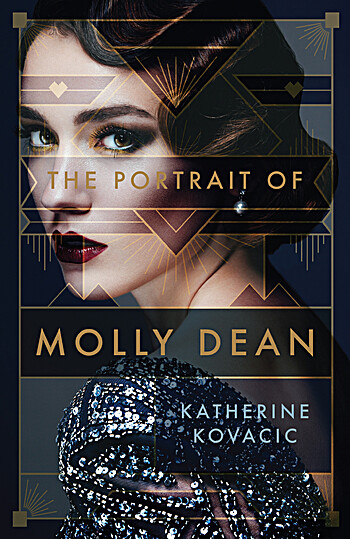
74. The Portrait of Molly Dean by Katherine Kovacic
Type: Novel
Original Language: English/Australia
Original Publication: 2018
Series: Alex Clayton (1)
Genre: Detective, Art, True Crime Based Fiction
Format: paperback
Publisher: Echo / Bonier Publishing
Reading dates: 17 June 2021 - 21 June 2021
Taking a real life crime and weaving a novel around it is a popular way to build a novel but it can backfire badly - either by being too close to reality to be interesting or by veering so far off that you start wondering why the real crime was used at all. Katherine Kovacic's debut novel manages to stay in between the two extremes and to create a novel that can stand on its own while still being tied to a real crime (the Ned Kelly Awards acknowledged that - she did not win the First Novel award in her year but she got on the short list).
Alex Clayton is an art dealer in Melbourne with a knack of finding neglected canvases and recognizing the hand of masters when noone else does. That allows her to live pretty comfortably and makes her pretty popular with her customers. The novel opens in 1999 when Alex finds another of those undervalued art pieces and recognizes it as the portrait of Molly Dean - a young woman who had been brutally killed in the 1930s when she was the muse of a major local artist. She buys the canvas, goes home with it and before long weird things start happening - someone seems to really want the picture - and is not very choosy in the manner of acquiring it. Which makes Alex decide to keep the picture a lot longer than she usually would have - with predictable results.
The novel runs in two timelines - the 1999 story of Alex, trying not to get killed for the portrait, and 1930 - the last days of Molly Dean. I know next to nothing about the art scene in Melbourne (in the 30s or nowadays) but the sections set in the 30s paint a picture that makes you feel like you know them - the characters come alive to the point where the ones in 1999 seem less developed than they really are. While Alex is looking for clues about what happened and what causes her issues almost 7 decades later, we see the actual story in the past. I had some issues with how the author ordered the novel - in some cases in an attempt not to spoil the old story, we do not get enough of a connection to the current times but overall the structure works.
Setting the current times in 1999 (despite being written in 2018) is intentional - it forces Alex to do proper research (or somewhat proper) - as much as I like our world, a lot of what happened cannot really happen in 2018. Plus the number of years between the two times is important - 1999 allows for some of the people who were alive to still be around; 2018 will be pushing it.
I looked up some of the facts used by Kovacic to build the Melbourne art world in both timelines and they check out - she adds some new characters in the past (and explains some of her creative changes in the real facts in her afterword) but the rest is historically true. The Molly Dean murder was never solved in real life; in Kovacic's story not only we know (and see) the murderer but we also find why it was done. It is not an attempt to claim a solution for the real life mystery - it is a novel after all (a biography of Molly Dean was published around the same time as well by Gideon Haigh).
And if the art story and the double timeline is not enough, Kovacic introduces us to the art conservator John Porter and her dog, Hogarth - the secondary characters who make the 1999 timeline feel like a real one and not just a basis for the 1930 one to run in.
Apparently this novel is the beginning of a series and I am planning to check the next novels. Looking at the author's site, she just published a non-fiction book as well - a true crime record of another Melbourne historical murder which was mentioned in the novel (as it had some connection to the investigation of Molly's at the time).
PS: And just look at that cover :)
83AnnieMod
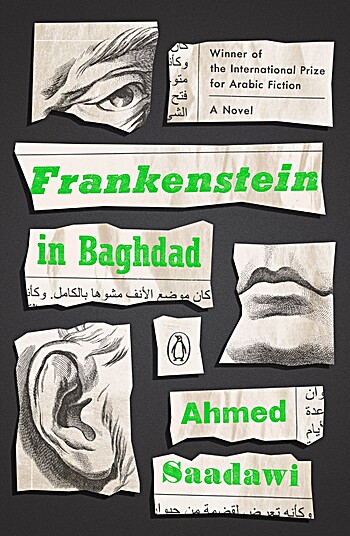
75. Frankenstein in Baghdad by Ahmed Saadawi, translated by Jonathan Wright
Type: Novel
Original Language: Arabic
Original Publication: 2018 in English; 2013 in Arabic (as فرانكشتاين في بغداد)
Series: N/A
Genre: Gothic, Speculative, Horror, Contemporary
Format: paperback
Publisher: Penguin Books
Reading dates: 21 June 2021 - 27 June 2021
Awards: International Prize for Arabic Fiction (2014); Arthur C. Clarke Award Shortlist (2019); Man Booker International Prize Shortlist (2018) (among others)
If the list of genres above does not tell you how confusing this novel's description can be, nothing will... :)
Hadi is a Junk Dealer in US-occupied Baghdad in early 2000s (we get a dateline from the first chapter but I will get to it in a bit). His job is to buy (or find) things people do not want and sell them to people who do. And while he deals with people's junk, he realizes that human parts are treated as trash - the violence of the street often ends up with human parts all over the place and these are just swept with the rest of the trash. So he decides to start collecting them, making complete people out of it and then selling (or giving away) the resulting complete corpse to the hospitals - so they can be properly buried.
He lives in part of the city where you can see everything that the country has to offer - the madwoman Elishva, a Christian widow who lost her son in one of the wars earlier, a coffee shop on the corner, a hotel owner, trying and failing to keep his business afloat, a real estate dealer who seems to be the only one who actually is doing well (how honestly he does that is a different story). But because he is always on the road (his business requires it), he manages to be everywhere else - including close to the US embassy. Add to that a young journalist with his own dark history and his boss (who seems to have his own agenda) and the very driven lead of the Tracking and Pursuit Department. Which brings us back to the beginning of the novel and how the whole book is presented - it starts with a final secret report which orders for the author and the book to be essentially disappeared.
With this opening and the cast of characters, the book would have had enough going. But then there is Whatitsname. Remember the body parts that Hadi was collecting? By some chance, at the moment when the body is complete, a young man dies and his soul ends up in the new body. And Whatitsname is born - and he needs to avenge the death of everyone who had become a part of him. Except that dead parts don't survive long so he needs to repair himself, adding more parts... adding more revenge. And the department responsible for tracking him is the Tracking and Pursuit Department - the guys who deal with the unusual.
The realism of the story of Baghdad at the time merges with the Whatitsname's story to give the whole novel a Gothic feeling with an Eastern flavor. There are two different stories - one rooted into reality and that could have been and one in the speculative realm which if you squint can be dismissed as hallucinations I guess (leaving this as a realistic novel and finding a way to make the fantastical elements as metaphors) but that will be a disservice to the novel. It weaves the two together on purpose and makes them a whole without throwing the story out from reality. And somewhere in there, while Whatitsname starts finding his own humanity, other characters lose theirs (or show that they never had it). At some points Whatitsname is the most humane of all characters in a chapter and that gives you a pause. The title is not random - and not just on the surface.
The story was never going to be a happy one - there are way too many broken people and the constant violence in Iraq does not help much. That beginning already tells you that the powers that be will manage to suppress the knowledge of Whatitsname. But we still get to see the collapsed society and the wounded pride of an old city.
How much one wants to read that as an allegory is up to the reader. It is easy to find parallels if you want to - and even if you do not, the story makes you stop and think more often than not. It has a Scheherazade's quality to it, even in the story of Whatitsname - the same way how she always needs to keep telling stories to live, Whatitsname needs to keep revenging and adding new pieces so he can live. Strip that story and you still have a portrait of a city and its people - at a time where being good is almost dangerous and trust will cause you issues.
It is not an easy novel and it can be disorienting in places - it can feel like it is going on and on in places where you want it to speed and then it speeds through a part where you want it to linger. And yet, I dare you to not finish it (if you do not leave it after the first pages - the style can take somewhat of a getting used to and the initial chapters are almost mundane). Enjoying it is probably not the word I would use for it - the novel is bleak and foreboding. But I would recommend it to anyone who reads cross-genres - I suspect that it won't work very well for people that read only speculative fiction or just realistic one - the mix of them is what makes the novel and what makes it stay in your mind of a long time after you finish it.
84AnnieMod
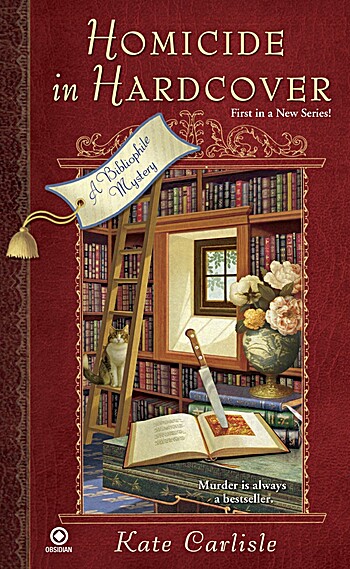
76. Homicide in Hardcover by Kate Carlisle
Type: Novel
Original Language: English
Original Publication: 2009
Series: Bibliophile Mysteries (1)
Genre: Cozy Mystery
Format: mass market paperback
Publisher: Berkley
Reading dates: 25 June 2021 - 29 June 2021
There is a subgenre of cozy mysteries series which picks up a hobby (usually art or craft) or business and sets the series around it - coffee-shops, baking, bookstores... you name it, it probably exists. Most of them are formulaic to some extent (there is a love interest, whoever runs the business/has the hobby becomes a reluctant detective, the police seems to always think they did at least the first murder at least for awhile and so on) but they tend to have enough details and difference to actually work on their own.
This novel is the first in one of these series. Brooklyn Wainwright restores old books and is one of the best in the business, albeit very young. A rare collection, being restored by her old mentor Abraham Karastovsky, is about to be shown in a local museum but he does not live long enough to see it - during a celebration in the museum he is killed. And it seems like Brooklyn and people she cares about are in the frame for it. So she resolves to do two things: find the murderer and finish Abraham's work with the collection.
There is an old love interest, there is an old foe (almost Cruella de Vil level cartoonish in her hate) and then there is the security consultant which makes Brooklyn's knees week. All that was the usual formula. Then there are the details - the commune where Brooklyn grew up (and met Abraham), all the book binding and restoring details and Brooklyn's personality which after a bit of a stumble early on (way too... formulaic) actually evens out and even shines.
But what really carries the book is the mystery itself - the murder and its resolution. With old books all over the place it was bound to be ties to the past and it is. But it was handled properly, without sudden jumps or surprises.
A good start for a new cozy mystery series - if you are in the mood for the style. I plan to read at least a few more from the series - they are a wonderful palate cleanser after heavier books.
====
And that is it for the month of June.
Books read: 5 (all novels). Way lower than the usual and most of them towards the end of the month.
85AnnieMod
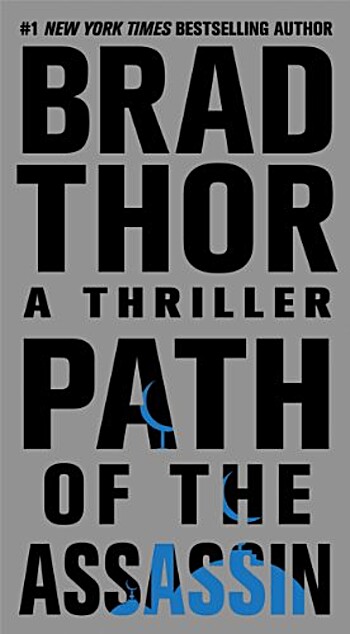
122. Path of the Assassin by Brad Thor
Type: Novel
Original Language: English
Original Publication: 2003
Series: Scot Harvath (2)
Genre: Thriller, international thriller
Format: tall mass market paperback
Publisher: Pocket Books
Reading dates: 7 August 2021 - 9 August 2021
At the end of the first novel of the series, Scot Harvath swore that he will find everyone responsible for the kidnapping of the president and the death of the Secret Service agents who tried to protect the president's family. That's where this novel opens - with Scot still chasing the last remaining member of the Lions of Lucerne - the shadow group that executed the kidnapping and was responsible for most of the misery after that.
After the tragedy, Scot had been promoted to Director of the Secret Service for the White House but he still had not taken up his new post - he is on a special assignment for the president, doing exactly what he swore he will do. Except that he is not the only one interested in the two remaining members of the group - one in jail in Switzerland, and one still free. And before long both of them are dead and the shadow of the Abu Nidal and his terror organization is back (Thor uses a mix of real and invented names and organizations although even the invented ones are easily mapped to one or more real ones). Scot and Claudia decide to call it quits (careers and blah blah - plus unattached Scot is much more interesting on the field) and Scot teams up with CIA (in a way) to try to track down the revived organization.
Before long, the Hand of God organization starts killing Arabs all over the place, causing everyone to look at Israel (except that we know who the responsible killer is and things seem to be different from what they look to be).
Scot and the assassin chase each other across the world, a hijacked plane gets into the action (causing a lot of grief for everyone and introducing Meg who refuses to be a victim) and the globe spanning adventure heats up.
Thrillers are a dime a dozen these days. Good ones are a lot rarer and Brad Thor is one of the better authors out there. His style can be a bit too technical (some chapters read like weapons porn...) and Scot Harvath can come out as arrogant (mostly for good reasons but still) but the novels work as a whole. It is also one of the series which is set completely after 9/11 (the first novel came out in 2002) - a lot of the older figures had to change the way their series were going and what was possible and doable when 9/11 happened (or they had to stay pre-21st century). That helps it being consistent - Scot and his environment have a better continuity.
If high-speed chases across the world (and in well known cities) and consistories are your thing, this series will probably work for you (but start with the first one - this novel is the conclusion of the first book in more ways than one). The end sets the series cleanly - Scot is not going back to the Secret Service, he has a new job so the series will remain international.
86AnnieMod
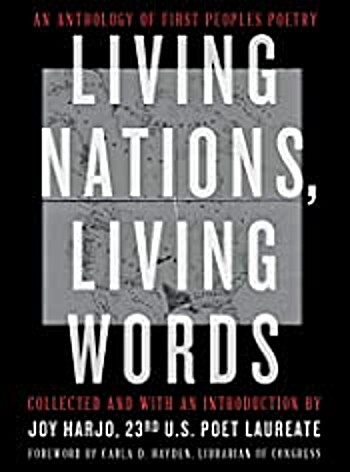
123. Living Nations, Living Words: An Anthology of First Peoples Poetry edited by Joy Harjo
Type: Poetry Anthology
Original Language: English
Original Publication: 2021
Genre: Poetry
Format: paperback
Publisher: W. W. Norton & Company
Reading dates: 2 August 2021 - 10 August 2021
It all started as a map: https://www.loc.gov/programs/poetry-and-literature/poet-laureate/poet-laureate-p... - Joy Harjo decited to map the U.S. with Native Nations poets and poems. There was one condition - they had to be still living, showing the modern state of the art (one of the authors died while the project was in progress). The result was a selection of 47 poets, covering the map (including Alaska and all the Pacific islands (including Guam)) and showing the diversity of the genre. The map was built based on where a poet wanted to be shown - where their tribe is, where their tribe used to be or where the poet feels at home. Then the 47 poets recorded their poems, added commentary (available to listen to or as a transcript) about the poem, their connection to poetry and a lot more things in between and someone added short biographies. And the online project was complete.
Then came the anthology - the book that actually made me realize that this project existed. It reprints the 47 poems - and the biographies - bu leaves out the commentaries. And unlike a map where you can pick your own order through it, a book had to order the poems somehow. A few of the poems are bilingual, a few are in English but they are using so many native words that you need internet to figure out what happens if you do not speak the language (a couple of poems have translations in footnotes, most don't). The order appears to be geographical on the surface but if you read the introduction, you will realize that the map directions are used as a base for a topic - beginning and endings - and if you are still not sure, a Hawaiian poem in the middle section drives that home.
The poems are steeped into the cultures they are coming from - some of them retell legends, some of them talk about the reality of their people now; some go back in time into history, some seem to look forward. Coming from different cultures, they are discordant and different - there is no overall tradition that ties them together as happens with most anthologies - except for Earth, suffering and hope.
I did not like every single poem, I did not understand quite a few of them (for some the commentaries helped, for others, even that did not help much). Most are modern (with all the mess that comes from modern poetry) although there are a few traditional styles. A few of them sound like chants, a few are almost crossing into prose. Some are a few lines long, some are 18 pages (ok... only one is 18 pages). Some use the page to almost draw a picture with the positioning of the words, others allow the words to talk for themselves.
But what all of them end up is creating pictures and make you think and feel. And that's what good poetry does.
Even if the whole project was just this anthology, I would still have liked it. Add the online portions and it becomes a lot more.
87arubabookwoman
I read several books by Jack McDevitt many years ago and remember liking them a lot. Deepsix sounds like something I want to immerse myself in now, and it wasn't too expensive for Kindle ($6.99) so I bought it. (One-click makes it way too easy). Hope to get to it soon. However, Amazon says it is second in a series--do you need to read the first before reading Deepsix?
I have Frankenstein in Baghdad on the shelf-your review makes me want to get to it sooner rather than later.
I have Frankenstein in Baghdad on the shelf-your review makes me want to get to it sooner rather than later.
88AnnieMod
>87 arubabookwoman: Deepsix - nope. It will spoil the first one when/if you decide to read it later a bit (but then so will reading anything about this series) - and even then, the big reveal in the first one is not the only reason for me liking the first book anyway (it is the journey) so... go ahead and read this one first, then if you like it, go back for the first. Or don't. As I understand it, the later books in the series get more connected but these two share the single character and the aftermath of the first book does not come to play here.
Don't get me wrong. I loved the first (see my review: https://www.librarything.com/work/49215/reviews/130902156) but you can start with this one with no issues.
Don't get me wrong. I loved the first (see my review: https://www.librarything.com/work/49215/reviews/130902156) but you can start with this one with no issues.
89AnnieMod
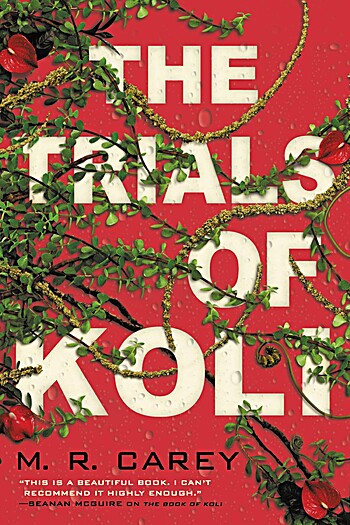
124. The Trials of Koli by M. R. Carey
Type: Novel
Original Language: English
Original Publication: 2020
Series: Rampart Trilogy (2)
Genre: science fiction, post apocalyptic
Format: paperback
Publisher: Orbit (US)
Reading dates: 9 August 2021 - 11 August 2021
Last time we saw Koli, he had decided to go to London in an attempt to try to find more people to expand the gene pool (and thus helping humanity survive). Not that he really understands how things work but that much he understands.
The second book in the trilogy opens where the first stopped - Koli, Ursala, Cup (who is about to hit puberty and that will be a big problem considering that it is the wrong type of puberty), Monono (who is now a complete AI) and the drudge are on their way south, Koli chasing his plan, Ursala trying to find the source of the signal that keeps coming from somewhere in the London area.
And off they are. But England is not a park - between the beasts, the people and trees, it is a dangerous place. We get to see a lot more of the countryside, learn a lot about what happened and how everything ended up like that. Trying to figure out what exactly they are seeing and where exactly they are is a part of the story for the reader - it is irrelevant for the understanding of the story but it grounds the story into its location. Plus it is fun working it out.
It is a rough journey - the Half-Ax soldiers really do not like people crossing their territory, the roads are all but gone and the trees are always there, ready to eat anyone who gets anywhere near them while the sun is shining (it is a good thing that it is already autumn and that it is England after all - a bit sunnier than it is now but still, England is England). And then our travelers find a village, Many Fishes, on the edge of the ocean - with the waters going higher, the Thames valley looks a bit differently from how anyone expected. But the signal is still there - somewhere in the water so the next stage of the trip is all set.
Many Fishes is different from Mythen Rood in a lot of ways - but it has the same problems - babies are not being born as often as before and it barely survives against nature. And even in these conditions, just as back in Mythen Rood, the rulers are ready to cheat and worse to keep their power. Humanity can be on the brink of extinction but human nature had not changed much.
While the first book was Koli's diary (written years later), this one adds a new narrator - Spinner, the childhood friend of Koli who we last saw in Mythen Rood, on her wedding day, when Koli decided to show the tech he managed to get to work (and in the process became a problem for the ruling family). She spends a few chapters catching up on the days before the wedding (and while we know the story, it is a bit different - Koli had always been an unreliable narrator but so is Spinner so the differences probably need to split in the middle) and then moves into the story we never saw - what happened after Koli was first incarcerated and then kicked out.
I'd admit that I did not think about what happened to the village once Koli was out of there - it was Koli's story and it looked like a stage for setting it, not really a place one should care about. But there were a lot more people there besides Koli so catching up with them actually helps the story - it shows even more clearly how shielded Koli had been and how different the walled village is from the world. Especially in the later chapters, where we see Many Fishes and Mythen Rood in subsequent parts, you can see how humanity still tries to survive - despite the world trying to kill them all. Plus seeing some of the same places that Koli saw on his path from Spinner's eyes adds another layer to the story.
A few more random things:
- There are no books. None at all. And the population had forgotten how to read and write. This did not strike me as unusual but it should have - no matter what happened, something should have survived. It took Monono to mention it for it to click for me - someone must have made a conscious effort for that to happen.
- Spinner's storytelling voice, especially with all the extra knowledge that she gets (it is confusing at the start because she should be talking in a style closer to Koli's than she does but the story does explain how and why the style is different) contrasted with Koli's (and was a lot easier to read - my brain is still trying to correct any sentence that Koli writes). Not that Spinner's is clean from oddities but it is still much closer to English of today.
Off to the next book. As seem to be the case lately, the third one is longer than the previous 2 books. I really hope that Carey manages to pull it off and close the story cleanly. It is a fascinating world.
PS: Don't even try to read one before you read the first one.
90AnnieMod
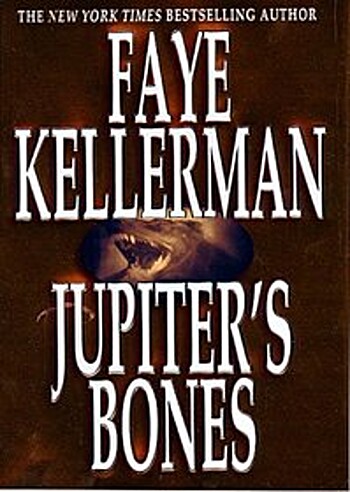
125. Jupiter's Bones by Faye Kellerman
Type: Novel
Original Language: English
Original Publication: 1999
Series: Decker & Lazarus (11)
Genre: detective, police
Format: hardcover
Publisher: William Morrow
Reading dates: 11 August 2021 - 12 August 2021
25 years ago Dr. Emil Euler Ganz disappeared. He used to be one of the best cosmologists in the world before his ideas got a bit crazy and by the time he disappeared, he was almost considered a washout and a hack. He resurfaced 10 years later, with no explanation of where he had been. But he never got back to science, instead he called himself Father Jupiter and started a cult.
The story opens when his daughter gets a call Ganz/Jupiter is dead in the cult's compound and the cult does not plan to call the police - and whoever called Europa Ganz thinks that she should. So she calls and Peter is assigned to the case - after all Emil Ganz is a celebrity, in both of his lives.
It looks like a suicide and everyone seems to like the idea. But then things get out of hand - a woman disappears from the compound, then a child is discovered to be missing and while investigating the missing people, Marge and Oliver stumble upon yet another dead body. And then things get really complicated when one of the remaining leaders of the cult start shooting at the police and closes the compound down, with all 200+ members inside, including children, and a lot of firepower. Everyone's nightmares are playing in real life again - the comparisons with Waco are writing themselves and Kellerman is not shying from them.
Meanwhile, back in Peter and Rina's household, things are a bit tense - the shadows of 8 years ago, the days when the two of them met and fell in love, catch up with the family - while we know what happened with Rina, the boys did not escape unscathed either - and it was about time for them to act out enough to finally pull that story back in the light.
Peter Decker is not a perfect man - he is short tempered and he does make mistakes. That's part of his charm. His handling of both the case of the cult and of the repercussions of what his sons reveal show that his heart is in what he does - even when he is unsure of what he can do or when he realizes the mistakes he had done. I missed Rina a bit in this book - she is there in the house, keeping everything going (including the extremely spoiled Hannah, now 5 years old) but she is not part of the crime investigation (and she is kept in the dark about the family drama).
It is a dark novel (and people can be idiots). If you are claustrophobic, some parts of the novel may be a bit of a problem. The "crazy cult leader" gets a bit of a spin here although it falls back to where it expect it to fall which is to be expected but still. A lot of people die and there are heart breaking moments but there are also survivors. By the end of the novel, Peter manages to solve even the problem he was never asked to - he figures out where Ganz had been for the 10 years he was missing.
We even get to see Alex Delaware from the other Kellerman series - well, hear about him anyway. He is not called by name but if you are reading both series, you will recognize his professional description when you read it.
It is not my favorite novel from the series but it is a solid novel albeit a bit cliched. I do wonder how much of the cliches are there because of all the true crime series we had been bombarded with in the last decade - this novel is from 1999 after all.
91BLBera
I started the Kellerman books years ago; I'll have to look back and see how far I got. I know I didn't make it to 11! I should try picking the series up again.
The Portrait of Molly Dean looks interesting. I'll have to look for that one. Frankenstein in Baghdad has been on my shelf for a while. Great comments -- I will read it one of these days.
Your comments really give me a good idea of the books, Annie.
The Portrait of Molly Dean looks interesting. I'll have to look for that one. Frankenstein in Baghdad has been on my shelf for a while. Great comments -- I will read it one of these days.
Your comments really give me a good idea of the books, Annie.
92AnnieMod
>91 BLBera: She is up to 26 now (plus a short stories collection) :)
I am not sure if the Molly Dean is published in the States (or if it ever will be) - it is from the Ned Kelly First novels list and the publisher is Australian. So may be a bit harder (but not impossible) to find.
I am trying to walk the line between spoilers and enough notes so when I look at the review, I actually can remember what the book is all about. Easier to do in works which do not rely on last minute reveals and changes in the story ;)
I am not sure if the Molly Dean is published in the States (or if it ever will be) - it is from the Ned Kelly First novels list and the publisher is Australian. So may be a bit harder (but not impossible) to find.
I am trying to walk the line between spoilers and enough notes so when I look at the review, I actually can remember what the book is all about. Easier to do in works which do not rely on last minute reveals and changes in the story ;)
93AnnieMod
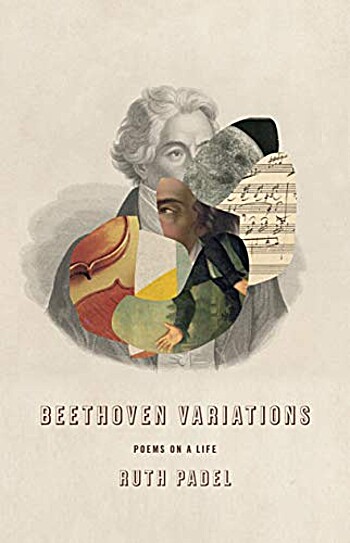
126. Beethoven Variations: Poems on a Life by Ruth Padel
Type: Poetry Collection
Original Language: English
Original Publication: 2020 (UK); 2021 (USA)
Genre: Poetry
Format: Hardcover
Publisher: Knopf
Reading dates: 11 August 2021 - 13 August 2021
How much do you know about Beethoven's life? Most people had heard at least some of his compositions and probably know that he lost his hearing but the rest had usually been reserved for music historians (and people who just happen to read a biography).
Ruth Padel grew up with Beethoven. Not literally - she is not that old but she grew up in a musician family, playing the viola and Beethoven was part of her life (plus there is a a grandfather with personal history with the composer). She splits his life into 4 periods (as most historians do) and writes 12 poems for each of them. Some are about the composer's life or music. Some are about Padel's own history with his music and about a trip through the places he lived in. And some are somewhere in the middle - mixing the history with the personal. A lot of the poems start with a quote - from one of Beethoven's books or from a biography or another book about him.
You do not need to know much about Beethoven - Padel's poetry does a pretty good job in guiding you through his life. Although the more you know, the more you will see in some of those poems. But you do not need to go and find another biography - at the end of the book, the poet adds a coda: Life-Notes (I am not sure if this section is supposed to be poetry or prose - I consider it prose but modern poetry can be weird and there is something poetic in the notes and especially the format).
If you are looking for an insightful biography, this book is not for you. But it actually works as a biography - marrying poetry and music is not new although usually it is the other way around - music describes and elevates poetry. Here it is the other way around.
It is a very personal book - while the history is all there, the personal connection is the guiding principle through the collection. Which makes it a stronger one than it would have been if it had tried to go for the history only - poetry without feelings cannot work.
One thing to be careful about if you read this as a biography - due to the format, the scholarly debates are only lightly touched on (for example Für Elise had always been a bit of a mystery - scholars are not entirely sure who it was written for. Padel thinks it was Therese Malfatti - despite the title of the work - and does not even touch on the other options. Historians have had different opinions through the centuries and the question is wide-open - together with the fact that this Elise may have been a transcription error some time back in the days...). And if you want to read more about the composer, Padel added a pretty good Further Reading at the end of the book (together with a list of selected works from the composer).
My biggest issue with this book is that now I cannot stop listening to recordings of Beethoven's music - I am partial to piano works at the best of days and he was a master of the form. Which is not such a hardship after all.
94avaland
>76 AnnieMod:, >78 AnnieMod:, I read and enjoyed the McDevitt and the Butler ages ago, enjoyed them both. It was fun to revisit them though your reviews!
95AnnieMod
>94 avaland: Both are novels I should have read a lot earlier but oh well :) More to follow from both authors - as different as they are, I quite enjoy both styles (or maybe I am just easy to please with a good story).
96lisapeet
>93 AnnieMod: Ohhh that looks neat, and my library has it. I'm tempted to hold out for a physical book rather than e, though, because that is a fabulous cover. I don't know a lot about Beethoven's life, but this seems like a fine gateway—I don't need an exhaustive biography.
97AnnieMod
>96 lisapeet: She does not play with the typographical form of her poems (no weird white spaces and so on which seem to be showing up a lot in modern poetry) so it can work as an ebook. :) It is a nice cover indeed.
I’ve read another biography years ago but if things do not make sense, the coda is right there, separated into the same parts as the poems so if one wants they can read that first. Or let the poetry work on its own first - the context is there, in those quotes, for most of it. :)
I’ve read another biography years ago but if things do not make sense, the coda is right there, separated into the same parts as the poems so if one wants they can read that first. Or let the poetry work on its own first - the context is there, in those quotes, for most of it. :)
98AnnieMod
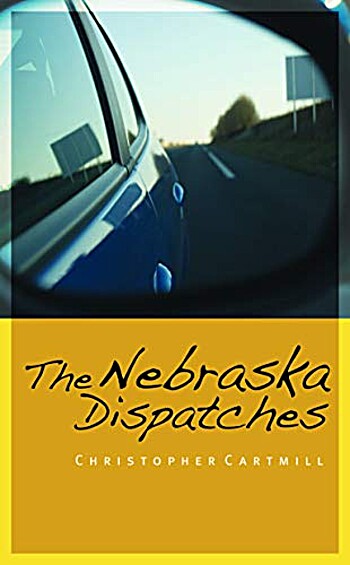
127. The Nebraska Dispatches by Christopher Cartmill
Type: Non-fiction
Original Language: English
Original Publication: 2010
Genre: Journal
Format: Hardcover
Publisher: University of Nebraska Press
Reading dates: 12 August 2021 - 13 August 2021
In 2006 Nebraska's Lied Center for the Performing Arts commissioned Christopher Cartmill to write a play about Standing Bear, the Ponca chief who sued the United States in 1879 and won with the judge declaring "an Indian is a person" (and thus entitled to its rights and protection under the law - which led to part of the Ponca tribe coming back to its previous lands after being walked to Oklahoma/Indian Territory a few years earlier). The play was named "Home Land" (not available in printed form) but Cartmill did not produce just the one play - he created a few solo performances about the writing of the play which then turned into this book which was then used for a solo performance - all of them based on the notes and messages (dispatches) he wrote (and sent sometimes) while researching Standing Bear - he tried to interview as many people as he could in Nebraska, both Native and white.
This book is an edited version of these dispatches - excerpts of a diary of a type, interspersed with sections needed to connect the story. There is story in there (Standing Bear's story) but even if that is always at the center of the book, the main focus is different.
Cartmill used to live in Nebraska so in a way he was going home - a home where noone was waiting for him anymore. He went there to write a play about an Indian tribe going home and ended up trying to understand what home is actually. The path to that goes through understanding the locals, their connection with the old times (including sifting through stories that merge different historical figures together) and their current lives and traditions. And somewhere in there emerges the focus of the book: can someone own a story and who has the write to tell a story.
These days it is almost modern to discuss cultural appropriation (and disagree with it). This diary does not go all the way there but the topics are similar - if there is a famous person who had lived in your neighborhood, do you have the right to tell their story? Can you control who told the story? Or do the story belong to the people from the same tribe as Standing Bear? Cartmill never finds an answer but he writes the play anyway - a story belongs to everyone. And you are left wondering why would people from a different tribe think that they have a better claim to the story (even when they put the wrong Standing Bear on their website) than a white man who is trying to find all the information he can. Both can be considered appropriation and yet, just one of them is frowned upon usually.
Somewhere in there, there is also the poverty and the real people who still live in the area - white and Native American, with their own dramas. History does not pay the bills, neither it is something everyone thinks about all the time. And while writing about the past, this present becomes the important one - most of the diary has nothing to do with the play or the Poncas - it is about Nebraska of today.
If you are looking for a book about Standing Bear, that's not the book for you. I am not even sure how exactly to define it - it is almost a slice of life work - it deals with home and stories and how they relate to each other and to people's lives.
99AnnieMod
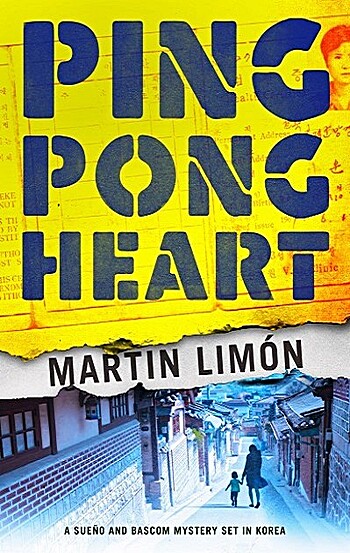
128. Ping-Pong Heart by Martin Limón
Type: Novel
Original Language: English
Original Publication: 2016
Series: Sueño and Bascom (11)
Genre: crime, military, South Korea
Format: ebook
Publisher: Soho Crime
Reading dates: 13 August 2021 - 14 August 2021
Major Frederick M. Schulz is one unhappy man - he paid for a business girl in Itaewon and she just took the money and disappeared. Or so he claims. Sueño and Bascom are sent to investigate - and hear a different story from the woman, Miss Jo Kyong-Ja - she did not have sex with Schulz indeed but it was because he was not able to. A he said, she said case - no witnesses and none of the two parties is willing to change their story - with Schulz getting almost desperate for her story not to come out.
It is the mid 70s in South Korea and the US army is there to assist with the treat coming from North Korea. And Sueño and Bascom are part of CID - the army's investigative arm (usually busy with the black market but occasionally dealing with bigger crimes).
Before long Miss Jo is beaten badly and then Major Schulz turns up dead - and everyone is ready to close the case on his death - if only they can find Miss Jo to charge her. Everyone but George Sueño who just does not like the whole story and how it unfurled. Mr. Kill shows up on the Korean side of the investigation, the usual Army bureaucracy kicks in and things start getting complicated when the things start pointing towards the counter intelligence part of the army.
By the end, Sueño gets to see his child again, make some decisions about his life (well, kinda), gets almost killed (again), Bascom loses their favorite Jeep (well, it is technically there, it just does not work anymore) and somehow get to the bottom of the whole story - finding the killer and a few spies while investigating the murder. And all that started because a man was too proud.
While the focus of the book, as with most entries in the series), is the crime (or crimes in this case), the social commentary about both Korea and the army adds a layer to it. Sueño does not really pull his punches while telling the stories - he comments on all he sees - racism and the state of the host country are often in his mind.
It is a good entry in the series. While it can work as a standalone, it works a lot better as part of the whole sequence - it closes some threads that got opened a few books ago.
100AnnieMod
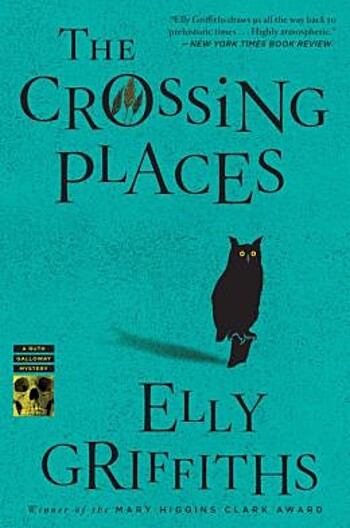
129. The Crossing Places by Elly Griffiths
Type: Novel
Original Language: English
Original Publication: 2009
Series: Ruth Galloway (1)
Genre: mystery
Format: ebook
Publisher: Mariner Books
Reading dates: 14 August 2021 - 15 August 2021
The "detective with a sidekick" trope had been with us since the beginning of the genre - just think of Sherlock Holmes. The role of the sidekick had changed through the years with some authors getting almost partnership level of relationship into their characters. In the last years, this had evolved into "policeman and an expert become partners" - usually the expert works in one of the forensic specialties (Iris Johansen's Eve Duncan is a forensic sculptor, Kathy Reichs's Temperance Brennan is a forensic anthropologist) or something adjacent to them (Jonathan Kellerman's Alex Delaware is a psychologist) (to name a few) and are called for their specific expertise initially (and then again in subsequent novels).
This series follows that pattern almost exactly - when the police find some bones in the saltmarshes of Norfolk, they ask the forensic archaeologist Ruth Galloway to assist with their dating. She is happy to assist even if they are not the bones the police hoped to have found. The fact that she reads the latest Rebus novel while dealing with a real life possible murder made me smile.
10 years earlier, a young girl disappeared. Lucy was never heard of since then and Harry Nelson, the DCI who investigated her disappearance had hoped that the bones will solve this mystery and provide closure for the poor girl parents. It was not to be - the bones ended up being tied to an archeological dig in the same vicinity but it introduced him to Ruth. So when another girl go missing, Nelson decides to use her knowledge - he had been getting some weird letters, seemingly connected to the missing girls, full of terms which fall into Ruth's domain.
A body and a dead cat later, it seems like the improvised partnership is working and Ruth's insight are useful. And the chase is on. Add some love and sex, a few additional archeologists, a somewhat weird local man who thinks he is a magician (or something), a bird watcher and the marshes themselves and the story starts taking shape. Setting the bulk of it in the early days of the year was probably intentional - the marshes and the rain become characters in the novel as much as the human (and feline) ones do.
Neither the final resolution, nor the killer came as much of a surprise. Griffiths does a marvelous job of throwing red herrings all over the place and making you wonder "what if" but if you had read enough books in the genre, you will probably figure out who the killer is as soon as he is introduced. Which does not make the book a bad one - it is just one of those cases where originality in who is to blame is hard to achieve and where anything else would simply not work at all. As for the final resolution - we start getting clues about it early on and it falls almost logically there - other options may have worked but that ending ties Nelson and Ruth in a way that allows for future installments easily (while keeping the book a standalone if needed).
It is a good start of a series - both the location and the main characters are interesting enough to make me want to read more and the premise of the partnership is different enough to allow for some exploration. I am not that enamored with the end of the personal story in this novel but we will see where that goes.
101AnnieMod
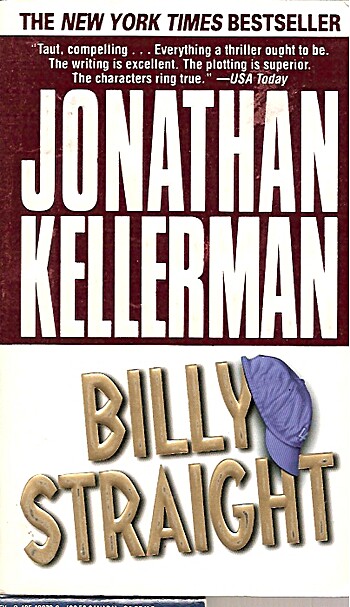
130. Billy Straight by Jonathan Kellerman
Type: Novel
Original Language: English
Original Publication: 1998
Series: Petra Connor (1)
Genre: thriller, police
Format: mass market paperback
Publisher: Ballantine Books
Reading dates: 15 August 2021 - 16 August 2021
Billy is 12 and lives in a trailer park in Watson, California - a small town, north from LA. He had never known his father and his mother had made all kinds of bad choices, including the latest man she decided to live with - a man who amused himself by abusing and hitting Billy to the point where the boy decides that he had had enough and runs away. When the novel opens and we meet Billy, he had been in LA for 4 months and had found a way to survive. Until the night he sees a woman being killed anyway.
The murder is in the Hollywood division and get assigned to Petra Connor (who we met in "Survival of the Fittest") and her senior partner Stu Bishop. The boy is long gone by the time the police shows up so it takes awhile for them to realize that they have a witness, let alone who he is. The victim is Lisa Ramsey, the ex-wife of a famous TV actor - and nothing in her death adds up.
Stu Bishop is unusually distracted so Petra ends up doing most of the work. With the victim belonging to the famous and powerful set, the investigation soon gets out from the division and other detectives need to be pulled in. Clues and details pile up, things get more and more complicated when people start disappearing before the police can talk to them. And somewhere in there, the target is painted on Billy (because Petra's superiors are more concerned with image than with his well-being). He is already running but that adds an additional layer to it.
Kellerman uses a double POV here - Billy in the first for half of the chapters, Petra in the third for most of the rest plus a few non-POV chapters to get us some details that neither of the two see (plus a few killer's chapters). There is a very limited number of people who could have done it but it is a throwaway line in the thoughts of the killer very late in the novel that finally let us know who the killer really is - a few pages before Petra discovers it (and a few hours after Stu start having suspicions that the story they think they know is not what it seems).
As much as the murder and its consequences are the base of the novel, Billy and Petra are as important and we get a lot of background on both of them - some of it heartbreaking (most of it in Billy's story), some of it just moving. And somewhere in all that ugliness, there is also love and laughter, people who do good just because they can and family reunions and drama (with all they entail). But there are also villains - some of them comically stupid, especially if they are compared with the main villain.
Milo Sturgis is name-checked by Petra a few times, Alex Delaware shows up in the last chapter to help Billy. It is a good start of a new series but if anyone expects a less gory series than the main Delaware series, that won't work for them.
102AnnieMod
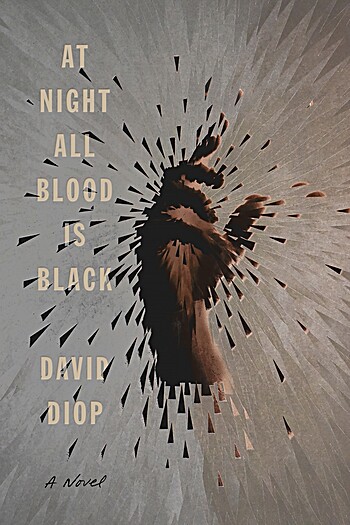
131. At Night All Blood Is Black by David Diop, translated by Anna Moschovakis
Type: Novel
Original Language: French
Original Publication: 2018 (French as Frère d'âme); 2020 (English)
Series: N/A
Genre: historical novel, psychological horror, war novel
Format: hardcover
Publisher: Farrar, Straus and Giroux
Reading dates: 16 August 2021 - 16 August 2021
Awards: Prix Goncourt des lycéens (2018); Man Booker International Prize (2021)
When talking about WWI, most people think of the trenches and all the lives lost in the years of the conflict. What people may not always remember is that the big colonial empires are still out there and the men in those trenches were not just the youngsters of Europe.
Alfa Ndiaye is from a small village in Senegal and does not speak a word of French but still decided to join the war - because then he can come back and be an important man in a nearby town. He does not join alone - his best friend, Mademba Diop, is there with him - until the day when Mademba dies. Alfa is haunted by that death - he found his friend still alive friend and refused to kill him, to spare him the suffering from dying in pain. The reason for refusal was humanity - he cannot kill a friend but as soon as Mademba is dead, Alfa's brain flips over and he realizes that his ideas of humanity had been flawed. So he decides to pay for it, redeeming his humanity - by killing people from the other side and taking their hands.
Alfa narrates the story and as the novel progresses, he is less and less believable, we can see his mind unraveling from grief and guilt. While he narrates the story in the trenches, he also gives us the backstory - the small Senegalese village, the easy life before the war. People start to be afraid of him, even if he does not understand why (or is not ready to admit it). His mind finds correlations where they do not exist while it keeps getting less rational, all the way to the end of the novel where his mind simply breaks (even if some people may read these last chapters differently). The madness of war is finally fully reflected in the madness of a man.
The story is beautifully written. Diop uses a lot of repetitions of expressions and parts of sentences which creates a story-telling cadence that can lull you in (until something horrible happens). There are a lot of metaphors and myths in all of it and I am pretty sure I missed a lot of them (for example 7 shows up a lot (7 hands, 7 traitors, 7 enamel pots in the party when the boys were 16; it cannot be a coincidence but I am not sure what 7 means in this culture). But even when you do not know what they mean, they add to the tapestry of the short novel - as do all the myths and stories that are told in full.
The novel's journey is almost entirely in a man's mind - he may be reporting real events sometimes but trying to separate reality from imaginary may not be so easy, especially as the novel progresses. Guilt and shame and grief rob Alfa of everything that the war did not take from him. And we are right there to see how he unravels.
I am not surprised that the novel won the Man Booker International Prize and Anna Moschovakis translation probably helped with that. It is a bit hard to get into the novel at first, the repetition is almost bothersome - until it just start working and you cannot imagine the novel without it. It is a disturbing novel - but then a novel about a war will always be disturbing. It is the lack of hope at the end which almost gets you - all the way to the end I hoped that Alfa's journey is not one way. And yet, I knew that there is no path back.
Strongly recommended - although with a warning about its darkness and language.
103kidzdoc
Great review of At Night All Blood Is Black, Annie! I clearly missed some aspects of it when I read it earlier this year, so I'll have to give it a second go sometime in the near future.
104AnnieMod
>103 kidzdoc: Thanks :) I had half a mind of writing a very short one: "Dark. War. Death. Madness." but decided to use my words instead.
For a short book, it has a lot of layers :) I am pretty sure I missed a lot too, especially because I lack understanding of the local mythology and French literary traditions. But that's the whole point of reading fiction, right? Everyone finds what connects with them. :)
For a short book, it has a lot of layers :) I am pretty sure I missed a lot too, especially because I lack understanding of the local mythology and French literary traditions. But that's the whole point of reading fiction, right? Everyone finds what connects with them. :)
105AnnieMod
With two longish books going at the same time, no new books today so time for a few catch-up reviews:
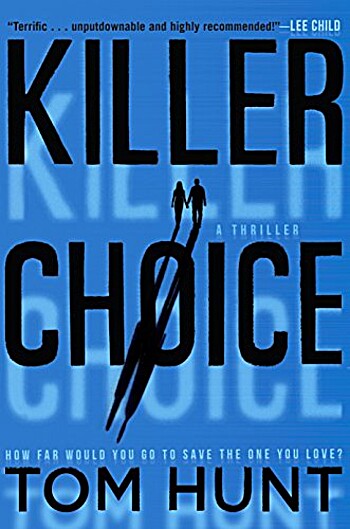
40. Killer Choice by Tom Hunt
Type: Novel
Original Language: English
Original Publication: 2018
Series: N/A
Genre: thriller
Format: hardcover
Publisher: Berkley
Reading dates: 4 March 2021 - 5 March 2021
I grew up watching B and C list action movies (or Z list maybe) - something bad happens (someone gets kidnapped more often than not or someone gets killed and our hero goes to save/revenge them). Most of them were essentially the same movie with changed names and faces (and the dubbing done by the same one voice made them look even more similar) but they had a lot of action, weapons and card chases (or running around) that they kinda worked. This novel reminded me of these - not because it was a carbon copy of other novels but because it seemed like a checklist extended into a novel.
Beth and Gary are finally going to have their baby - until she gets the devastating news that she has a brain tumor and the only cure is an experimental treatment - which they cannot afford. They start trying to get the money - from friends, via internet campaigns, via local campaigns but $200K are a lot of money and they are nowhere near that.
Meanwhile, in a bad part of the city, Otto is looking for way to eliminate a man - he has money to pay for it but noone wants to even try. One man needs money, another has money - a match made in heaven, right? Otto reaches out, makes an offer and Gary says yes.
And things go weird fast. There was a reason why noone wanted to touch the man - although not everything is what it looks like. Plus trusting Otto to pay up was not the most intelligent thing Gary had ever done. And Gary, who initially looked like a man you could almost admire, turns out to be anything but (even before he agreed to kill a man).
It is not a bad thriller - it is easy to ignore the exaggerated elements and the coincidences and just read through. There is enough action to carry the novel and the additional details that show up from all sides add to the speed of the action and keep your attention. I'd probably read the next book by Hunt (this is a debut novel so a lot of what felt weird is probably inexperience) - everyone needs a popcorn thriller now and then.

40. Killer Choice by Tom Hunt
Type: Novel
Original Language: English
Original Publication: 2018
Series: N/A
Genre: thriller
Format: hardcover
Publisher: Berkley
Reading dates: 4 March 2021 - 5 March 2021
I grew up watching B and C list action movies (or Z list maybe) - something bad happens (someone gets kidnapped more often than not or someone gets killed and our hero goes to save/revenge them). Most of them were essentially the same movie with changed names and faces (and the dubbing done by the same one voice made them look even more similar) but they had a lot of action, weapons and card chases (or running around) that they kinda worked. This novel reminded me of these - not because it was a carbon copy of other novels but because it seemed like a checklist extended into a novel.
Beth and Gary are finally going to have their baby - until she gets the devastating news that she has a brain tumor and the only cure is an experimental treatment - which they cannot afford. They start trying to get the money - from friends, via internet campaigns, via local campaigns but $200K are a lot of money and they are nowhere near that.
Meanwhile, in a bad part of the city, Otto is looking for way to eliminate a man - he has money to pay for it but noone wants to even try. One man needs money, another has money - a match made in heaven, right? Otto reaches out, makes an offer and Gary says yes.
And things go weird fast. There was a reason why noone wanted to touch the man - although not everything is what it looks like. Plus trusting Otto to pay up was not the most intelligent thing Gary had ever done. And Gary, who initially looked like a man you could almost admire, turns out to be anything but (even before he agreed to kill a man).
It is not a bad thriller - it is easy to ignore the exaggerated elements and the coincidences and just read through. There is enough action to carry the novel and the additional details that show up from all sides add to the speed of the action and keep your attention. I'd probably read the next book by Hunt (this is a debut novel so a lot of what felt weird is probably inexperience) - everyone needs a popcorn thriller now and then.
106AnnieMod
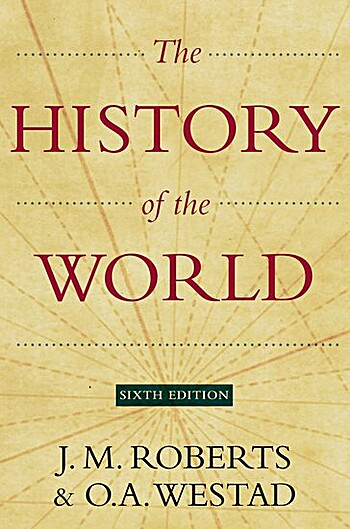
41. The History of the World, Sixth Edition by J. M. Roberts and Odd Arne Westad
Type: Non-fiction
Original Language: English
Original Publication: 2013 (for the 6th edition)
Genre: History
Format: Hardcover
Publisher: Oxford University Press
Reading dates: 29 December 2020 - 7 March 2021
How do you cover the history of the world in 1100 pages or so? By being very careful in what you cover of course.
The previous editions of J. M. Roberts's book had been around since 1976 (for the first edition) and had long be considered one of the better one volume histories out there. For the 6th edition Odd Arne Westad rewrites the first and last parts of the book (prehistory had changed a lot in the last decades and adding the collapse of USSR and its aftermath could not have been done earlier) and revised the rest. The result is an uptodate book (or mostly uptodate - things keep changing with new discoveries).
You will not find a list of battles here or a list of all the rulers of a country or an empire. You won't find the list of political entries in certain territories listed anywhere. The book starts with an introduction which is important - it tells you how the authors built the book and explain what you are about to read. It is all about influence - an empire existing for 300 years and leaving no traces in the history or culture of the area (or outside of it); a ruler who was there for 10 years and conquered everyone will get more space than that empire.
The book is not a political history or a cultural history; neither it is the history of the English speaking world. If one believes their country to be considered the best in the world, they will get disappointed - while some countries have outsized influence, they are not the only ones covered and they are not just praised (looking at the British) and Americans may be a bit disappointed that until the very last section, USA is pretty much ignored - and even there, it is its foreign influence that matters so it is not that prominent.
It sounds almost disjointed in parts, it feels like it omits too much and covers weird things in detail but it all adds up to a narrative history that works. It has a lot of maps but I wish that there were a lot more (and even an Atlas to accompany it - with maps of the different areas in different times). It also can make you laugh in places - for example when the Portuguese and the Spanish split the known world between each other, the Pope agreed, all was going well and then a Portuguese ship swings too wide on the way back from Asia to work around some winds and hits land - and Brazil's history is changed forever. The way it is written is almost like an old joke - with a pun line and all. The serious and the curious coexist and the analysis added allows for connections to be seen where they are almost hidden.
It is not easy to summarize a history that usually takes 200 pages in a page (or less). Things need to be missed, priorities need to be set. And somehow it works here. It made me read more about a lot of times and places (and people and cultures) but it is a great overview. And thinking on what it covered, all the places and battles and people it actually covered, you wonder how exactly that happened on this number of pages. It is a dense text, it requires attention and the more you know about the history of the places and times you are reading about, the more you will see in these sections. I suspect I will be returning to this book over and over.
It is a narrative history - it flows as one story, parts relies on what you already read about before. While different sections can be read on their own, you will miss a lot if you do not keep what was already said in mind. The important comparisons and connections are spelled out but the details are not.
If you are looking for a one volume history of the world and you can read dense texts, this is a marvelous choice - although it requires a lot of patience and focus.
107AnnieMod
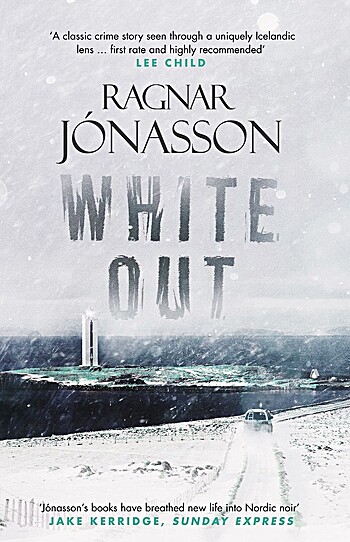
42. Whiteout by Ragnar Jónasson, translated by Quentin Bates
Type: Novel
Original Language: Icelandic
Original Publication: 2017 in English; 2013 in Icelandic (as Andköf)
Series: Dark Iceland (4)
Genre: Crime
Format: ebook
Publisher: Orenda Books
Reading dates: 8 March 2021 - 9 March 2021
The 4th novel in the series (which was translated and published 5th in English) fills in the gap left in the English translations (and continues from the first 3 if you are reading them in the proper order).
Kristín and Ari Thór Arason are together again and are awaiting a child (knowing what happens in the 5th book makes you see where the story is leading...). Christmas is coming in the cold fjords of the north and everyone is looking forward at it. Except for one young woman in the village of Kálfshamarvík who appears to have jumped from the cliffs which crowd the villages.
Ari Thór goes to investigate (with Kristín traveling with him) after his old boss, Tomas, asks him to assist. What follows is essentially a locked room mystery - there is a very limited number of characters (it is a small village and with the snow coming down, most of them never leave their house).
It looks like a suicide and everyone wants it to be - so they can have Christmas if nothing else. Except that things do not add up and it is not the first woman from that family to die in the same way. So Ari Thór investigates - and almost gets in trouble (as usual).
The story works because we see it through Ari Thór's eyes - no omniscient narrator to clarify some connections - we learn about them when the detectives do. Past secrets end up being important for the solution of the case. And as much as one likes our detective, he is not always the fastest mind out there - which makes the series even better in some ways.
A solid entry in a solid series. It was supposed to be a 5 books series but in 2020 Jónasson returned to Ari Thór's story with a 6th book so there is one more left for me to read.
108AnnieMod
And the only remaining poetry collection from 2021 that I had not reviewed yet:
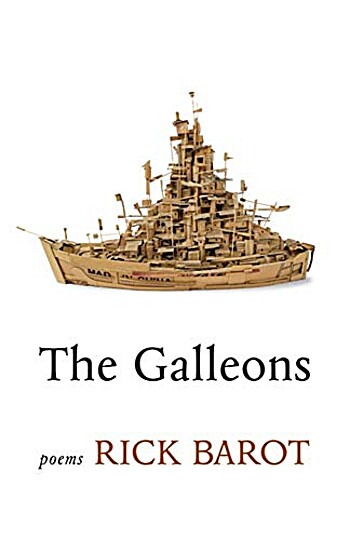
43. The Galleons: Poems by Rick Barot
Type: Poetry Collection
Original Language: English
Original Publication: 2020
Genre: Poetry
Format: paperback
Publisher: Milkweed Editions
Reading dates: 4 March 2021 - 10 March 2021
For almost 250 years, between 1564 and 1815, the Manila Galleons crossed the Pacific - bringing luxury goods, slaves and silver between Manila and the New World. Each of those ships had its own name - they were always named after the port they started from (even when the same ship made the trip multiple times) and the route was an important alternative to the much longer crossing via the Indian Ocean and the Atlantic. Because of its route, it is often omitted - it does not connect the Old Spain ports to the new ones after all - but in those years New Spain is part of Spain.
Barot takes this history and builds a collection around it. The backbone of the collection are the 10 poems called "The Galleons 1-10" which are telling part of that story, including one of the middle ones being nothing more than a complete list of all the Galleons' names and years. It is like a chant, just a list that seems to go forever. And around it are the pictures that keep repeating in your head - the slaves on the ships, the slaves that made it to the other side and the ones that did not, the captains and the objects. But it is not about that part of history - the Galleons brought people which have future histories and they are part of the collection as well - those histories merged with the history of the world and became our histories.
Barot is Filipino-American and a lot of those poems are about his family and his own experiences - using what he knows to add a context to a little known part of history. You will not learn much about the Galleons from the collection but it will send you reading about them. And even the poems that are not about that route on the surface end up connected - because they are the center of the experiences of a lot of people from this diaspora.
Highly recommended.

43. The Galleons: Poems by Rick Barot
Type: Poetry Collection
Original Language: English
Original Publication: 2020
Genre: Poetry
Format: paperback
Publisher: Milkweed Editions
Reading dates: 4 March 2021 - 10 March 2021
For almost 250 years, between 1564 and 1815, the Manila Galleons crossed the Pacific - bringing luxury goods, slaves and silver between Manila and the New World. Each of those ships had its own name - they were always named after the port they started from (even when the same ship made the trip multiple times) and the route was an important alternative to the much longer crossing via the Indian Ocean and the Atlantic. Because of its route, it is often omitted - it does not connect the Old Spain ports to the new ones after all - but in those years New Spain is part of Spain.
Barot takes this history and builds a collection around it. The backbone of the collection are the 10 poems called "The Galleons 1-10" which are telling part of that story, including one of the middle ones being nothing more than a complete list of all the Galleons' names and years. It is like a chant, just a list that seems to go forever. And around it are the pictures that keep repeating in your head - the slaves on the ships, the slaves that made it to the other side and the ones that did not, the captains and the objects. But it is not about that part of history - the Galleons brought people which have future histories and they are part of the collection as well - those histories merged with the history of the world and became our histories.
Barot is Filipino-American and a lot of those poems are about his family and his own experiences - using what he knows to add a context to a little known part of history. You will not learn much about the Galleons from the collection but it will send you reading about them. And even the poems that are not about that route on the surface end up connected - because they are the center of the experiences of a lot of people from this diaspora.
Highly recommended.
109BLBera
>100 AnnieMod: Ruth will grow on you, Annie. She's a character I wouldn't mind hanging out with.
The Padel Beethoven poems also sound interesting.
The Padel Beethoven poems also sound interesting.
110AnnieMod
>109 BLBera: I liked her enough - we are of an age (I just turned 40 in May) and in a few places it was as if she was describing my life (except that my life does not involve cats or bones). :) So I plan to continue with the series - and I suspect she will turn out to be one of my favorite characters before long - she is just quirky enough for it. Plus she reads Rebus. ;)
111AnnieMod
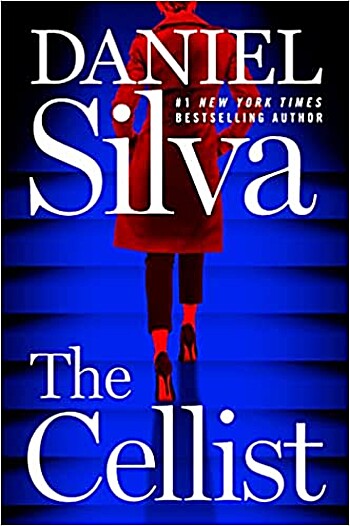
132. The Cellist by Daniel Silva
Type: Novel
Original Language: English
Original Publication: 2021
Series: Gabriel Allon (21)
Genre: thriller, spy
Format: ebook
Publisher: Harper
Reading dates: 16 August 2021 - 18 August 2021
How to be a spy while a pandemic is raging everywhere? Just ask Allon - it did not even slow him down.
Viktor Orlov, the Russian oligarch who saved Gabriel and Chiara's lives once, is killed in his own house. Even if anyone had any suspicion of who was responsible, the method itself makes sure that everyone knows - Kremlin finally extended its hand and silences its ex-child. That murder gets the Israelis involved; what Viktor had been doing in his last days gives them the weapon they need.
A woman working for the dirtiest bank in the world had been leaking documents to a journalist - and the journalist asked Viktor to look at them. As it turns out, this is the proof everyone had been looking for to prove who owns and operates the Russian money in the West. And Allon finds a way to make her into a spy.
Silva had used the plot before (including the discovered painting...) - so some parts of it sounded familiar. But there are also enough differences not to sound as a repetition. Add Anna Rolfe (still unhappy with Gabriel - and being helpful because the woman who leaked the secrets is a talented cellist), the Swiss and French police, Keller and Sarah Bankroft (now dating), the whole Israeli team (complete with Natalie now), a few Russian journalists we had met before, Ari Shamron and the Allon family and the book feels like a reunion - the series gets more and more tangled in this secondary characters to the point of being overcrowded in places.
Silva's world had always paralleled ours - except for the Vatican story, most of his world can almost fit in our world. This one takes it to an extreme - while the Russian president depiction had always been a very slightly veiled representation of the actual occupant of Kremlin, the US one had been a bit more removed. The last few books moved it a bit closer but this book pulls all the stops - there are no names (not for the presidents anyway - but Liz Cheney name IS there) but the 6th of January and QAnon and other details and comments are there and can as well be from a news article. Of course, there is the usual note about everything being fictional...
The later part of the book feels rushed - especially the Washington story. According to Silva's note, that was not supposed to be the end of the book - he rewrote a lot of it when the US Capitol get attacked. It ties into the story and it actually works but it feels too close to home to be comfortable.
Still a good entry in the series. I am curious where we are going from here though - Allon cannot keep getting shot for much longer...
112AnnieMod
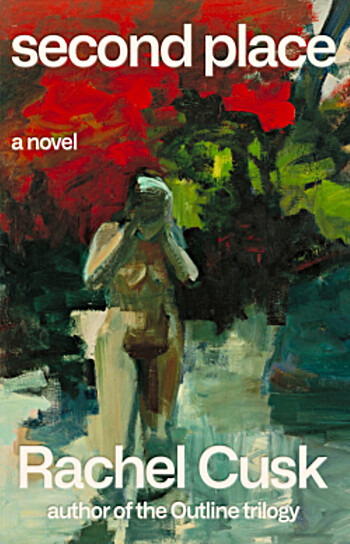
133. Second Place by Rachel Cusk
Type: Novel
Original Language: English
Original Publication: 2020
Series: N/A
Genre: contemporary
Format: hardcover
Publisher: Farrar, Straus and Giroux
Reading dates: 18 August 2021 - 19 August 2021
It was the name Jeffers that got me first. I knew I had seen it somewhere lately - the spelling was weird enough to make me wonder how can I see it twice in the same year. But I could not place it. I needed another name, Brett, to start wondering if this novel can somehow be connected to the artist colony in Taos. Had I looked at the author note at the end of the novel before I read the whole book, I would have seen Cusk's tribute.
But let's get to the novel: M had settled finally on the border of a marsh with a new husband. But before that she met a painter, L, - met his paintings anyway at a time in her life when her life was a bit messed up. When she married Tony, she found the stability she needed - and they built a second house/cabin on their land - called the Second Place. It was supposed to go her daughter but when she moved away it became a refuge for anyone who needs a quiet time to be an artist (of one type or another). That's where our novel opens - with M sending a letter to L to invite him to come to the Second Place - and the story finally takes off when L actually arrives, with Brett in tow, and throws M's ordered life into a disarray.
There is a plot somewhere in there, things do happen but the novel is more concerned with M's thoughts and feelings than with the real life. The whole novel is a set of letters/talks with Jeffers, written/happening after the whole story finished - so there is somewhat of an unreliable narration happening as well - M knows where the story is going so she shapes her story around that.
The novel is an exploration of motherhood and womanhood - M's guilt (sometimes just in being a woman) and thoughts paint a picture which may sound too familiar sometimes. It is curious that the novel does not really have a set timeline - there is a disaster which happened (the Depression?) but it can be set in almost any time - even when Kurt decides to write, he picks up paper and pencil and explains it in the story - we never see a computer or a phone but that does not mean they could not have been there. And yet, with the Taos connection in my mind, that felt like the 20s/30s of the 20th century - even if the text does not get there.
The invitation was meant to heal M but L is not what she really expected - so their relationship is anything but amicable for most of the book. That throws M into memories and flashbacks - when she is not unhappy.
In 1932, Mabel Dodge Luhan published a memoir called "Lorenzo in Taos". It was based on D. H. Lawrence stay in the artist colony in Taos that she was running with her husband. The memoir is written by using the letters between Mabel, Lawrence and Robinson Jeffers (among others). and deals with the relationship between the author, his wife, Mabel and the artist Dorothy Brett. I read a book about the Southwest earlier this year and that's what triggered my memory - I had never read the memoir (but now I want to) but the Taos colony was important in the development of arts in New Mexico and the Southwest. Once that connection finally clicked, a lot of what I had issues with in the novel actually smoothed out - while the novel is not an exact replica of the real-life story, it has a lot of ties into it - some of them quite obvious, some of them a bit more hidden (for example the real life Tony won Mabel by sitting in his teepee every night and drumming, trying to get her to come to her; the novel's Tony wrote letters every day which were "as if he were beating a drum, steadily and without cease").
I am pretty sure that I missed a lot of these connections - especially early in the novel when I had not made the connection and even more because I do not know Mabel's story that well. I plan to read her memoir - I am really curious to see how close the novel is to the real life story.
The novel is a tribute to the spirit of real-life Mabel - a woman that was bigger than life in a time when women were anything but. But I do wonder if that connection did not actually worked the opposite to what the author intended - without the Taos connection, the novel is flat and listless (and M is annoying) - it reads more like an essay on womanhood with somewhat wooden characters; with it, it kinda feels like a retelling which tries too hard to connect the dots without actually repeating the real life story. There are differences and the ending is different and yet... something just does not click cleanly together for me.
I do not read a lot of contemporary novels and I probably would not have picked this one up if it was not for it landing on the Booker long list. Somewhere in the middle of the book I realized that I treat it more as a puzzle than as a novel - trying to find the Taos connections and to figure out the timeline. Which is never a good sign - I expect novels to keep me in the flow of their narrative. But it also seems to be in a style which is modern these days (even if it rarely works for me) so between the language (flowery and beautiful albeit overwritten in places) and the Taos connection, I can see why the literary circles may like it.
I do wonder though if this would not have been a much better book if it was half its length, paired down to a novella. I guess we will never know.
Remaining Booker Prize Longlist Books 2021: Annie - 12:1
113AnnieMod
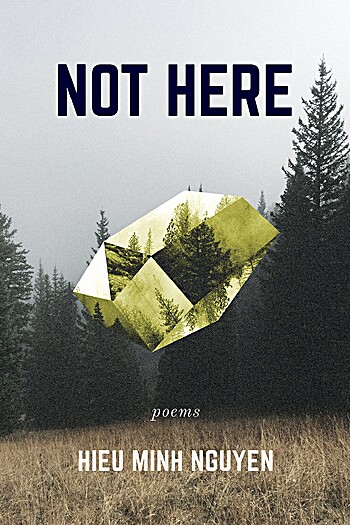
134. Not Here by Hieu Minh Nguyen
Type: Poetry Collection
Original Language: English
Original Publication: 2018
Genre: Poetry
Format: paperback
Publisher: Coffee House Press
Reading dates: 18 August 2021 - 19 August 2021
There is a duality in this collection - the poems about the author's mother are bracketed between ones that play with erotica to the point of crossing over in even less subtle genres. Or maybe it is better to say that the book is a book of dualities - straight vs queer, Vietnamese vs white, home vs life.
As a lot of teenagers from the diasporas (or is it just the diasporas?), the author/narrator of the poems (it is unclear how autobiographical the collection is - at least parts are for sure but...) got hounded by the "when are you going to get married?" question. What complicates things is that he is gay and refuses to settle with a wife. Except that when he finally gets a white boyfriend, it seems to be ok - that is safety.
The poems weave a story of one-night stands and lost love, of a mother caught between her culture and her desire for her son to be safe, of being different and being picked up for being different. It is a jarring collection in places - it feels like an autobiography that had managed to skip all the good parts. And even in this gloom, there is hope, there is laughter and somewhere under it, there may be a heart on the path of getting itself whole again.
The collection won't be for everyone - the language can be crude in places (and the few sex depictions are raw and honest and unveiled) and the topics may be almost alien. But it still is worth reading.
114AnnieMod

135. Diné: A History of the Navajos by Peter Iverson ; photographs by Monty Roessel
Type: Non-fiction
Original Language: English
Original Publication: 2002
Genre: History, US History, Southwest
Format: Hardcover
Publisher: University of New Mexico Press
Reading dates: 10 August 2021 - 20 August 2021
Iverson sets out to tell the story of the Navajo from the inside out (even though he is not a tribe member, he had worked with them for a long time and his co-writer (credited as photographer but apparently having a bigger role according to the introduction) is Diné (which is what the Navajos call themselves). The history itself works but I am not entirely sure that he managed the goal of showing the tribe as an agent of its own destiny - but then he may not be responsible for it - there were cases where the Diné had to react and could not lead their own life as they wished to... way too many cases.
The book follows the history chronologically - spending the first chapter on the pre-19th century and then following as the decades passed between the four sacred mountains. That first chapter can be a bit maddening - Iverson tries to present all sides of the different accounts for the history of the tribe by citing the relevant authors and elders. He does summarize and adds his own insights but all of those never-ending all-sided quotes, combined with a mythology which is barely touched upon, end up with a jumble of a first chapter. It is dense, it has a lot of information but it proves that sometimes less is more.
Noone knows where at least part of what formed the modern Bulgarians came from - there are probably more theories than historians working on it. I grew up with this argument and into a culture that was trying to learn where they came from so the history can go back, despite the 13+ centuries of known one (or which claimed some past in some periods). And when I think of Native Americans, I think of places and histories as long as the European ones. So the first thing I had to do was to stop trying to find parallels.
Yes, the Diné came from somewhere - there are linguistic and archeological proofs (and there are even more since the book was published) but that's not the history of the Navajo. One day they reached the 4 mountains in the Southwest and that became their home - they know they came from somewhere but where it is does not matter - they are Diné because they are between these mountains. And if someone else would like join them or is useful, they become Diné as well. It is unclear when they moved into the area - but the best guess for now is somewhere between the 12th and the 15th century (cue the different opinions being cited), more likely towards the end of the period. That is at least a few centuries if not millennia than I expected...
Once they are finally settled, the Spanish show up bringing sheep, horses and cattle. Before long, the Diné make sheep part of their identity to the point where there are no Diné if there are no sheep. This is just an early example of the Navajo finding something useful (people or things or actions) and they weave them into being a Navajo. The weaving they are known for was also borrowed, so is the silversmithing and the rodeo. The tribe absorbs the unknown and new and makes it part of itself. Too bad that they did not manage to pull that off with the Anglos coming in.
With USA making its way West, the Navajo end up in the New Mexico territory (before it gets split into the two future states it will birth). Because of its sheer number (and not being that peaceful - they were not beyond just taking what they wanted), the Navajo had somewhat of a reputation for rebellion (the fact that they refused to listen to the white man did not help much). They got kicked out from their lands (the Long Walk may not be as popular in history as the Trail of Tears but it was no less brutal) and relocated to New Mexico, with further plan to send them to the Indian Territory - until somehow the chiefs manage to convince the authorities to let them go home instead and in 1868 the Treaty is signed and the Diné come back home, between their sacred mountains.
What follows is a mix of expected and unexpected - at a time when everyone else loses land, they get more land for their reservation; they become the Cold Talkers of WWII which help the Pacific theater not to collapse (while not being able to vote when they are back home); they get exploited when mineral resources are found. They lose most of their sheep (because of government policies) and they learn to understand education, the need to speak English and modern medicine and to support it - not because they were told to (that part did not work very well) but because it is the Diné way - what is useful, becomes part of the tribe (to the point that now parents send their children to boarding schools so they can get immersed into the culture and learn the language and the tribe sponsored traditional healers' education). They become the Navajo Nation and they remain in the lands which were given to them - between their mountains.
And in all that history, there are the leaders and the chiefs, the men (and rarely women) who shaped the Nation. It is a matrilineal society and yet it is the men who have the political power (complete with corruption and scandals).
It is a very dense text, packing a lot of information and trying to cover a lot of history. And it mostly works. I wish that there were a few more maps in some chapters and the last chapter reads like an advertisement department art history pamphlet but despite that, it mostly succeed in what it set out to do (complete with surprises - did you know that the Navajo had extensive peaches orchards when the Anglos showed up - which were destroyed just because they could be). There is no way to read this history and not wonder how history could have happened if the Spanish and then Americans had found a different way to deal with the populations they found here.
Iverson worked with printed secondary sources but the bulk of the book is based on original research and primary sources. While working with all the letters and other documents, he and his co-writer Monty Roessel, decided to create a second book. I was planning to read the two books in parallel but their structure is different - while I could have made it work, it actually stands on its own - so I will just read it on its own.
The story finishes in 2002 but the history of the Nation continues - and the last 20 years had been years of reevaluation and reconciliation in a lot of areas. I will be looking for a newer account - because some of the actions were just set in motion when the book came out. And one hopes that this history will never be forgotten.
Is this a perfect book? Not really. But it does its job well enough and it makes you think.
115AlisonY
>114 AnnieMod: Enjoyed your review. I did a history project on the Navajos at school and I've always kept a sweet spot for learning about them. My sister was dating a guy in the US navy at the time, and as this was pre-internet he was such a treasure and colour photo-copied loads of information for me from books in his local library that I would have never found in NI and mailed them over to me. I seem to remember I did pretty well in that project, what with all my pretty coloured pictures stuck in and all.
116NanaCC
>111 AnnieMod: I think you’ve put this series on my wishlist to try, Annie. If you are still reading them at number 21, I’m guessing they are pretty good.
>114 AnnieMod: This one looks interesting. I’ll see if my library has it.
>114 AnnieMod: This one looks interesting. I’ll see if my library has it.
117AnnieMod
>116 NanaCC: Gabriel Allon had been one of my favorite series lately (apparently I burned through them in less than 4 years :) Some are better than others (as usual for series) and Silva's style can be a bit weird in places until you get used to it but if you feel like an international thriller with non-American characters, I am not sure you can find a better series out there. And the art subplot that runs through all the books adds a bit of a calm in a frantic series. Can get a bit brutal in some installments though (in case that worries you). It is not high literature and it won't win any literary awards any time soon but it does not need to :)
The Navajo book is interesting but also highly academic (and too detailed in places). If you are fine with the style, it is worth it - although some chapters are easier to read than others. :)
>115 AlisonY: That sounds like an interesting project. :) Pre-internet was a different land, wasn't it?
The Navajo book is interesting but also highly academic (and too detailed in places). If you are fine with the style, it is worth it - although some chapters are easier to read than others. :)
>115 AlisonY: That sounds like an interesting project. :) Pre-internet was a different land, wasn't it?
118AnnieMod
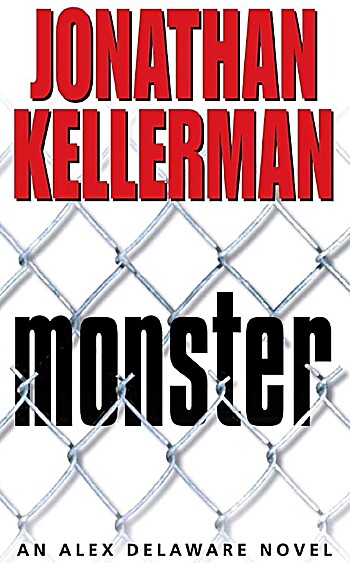
136. Monster by Jonathan Kellerman
Type: Novel
Original Language: English
Original Publication: 1999
Series: Alex Delaware (13)
Genre: Crime, Police, Thriller
Format: ebook
Publisher: Ballantine Books
Reading dates: 19 August 2021 - 20 August 2021
First an actor/waiter gets killed and stashed in the trunk of his own car. Then a psychologist suffers the same fate - even though the two cases do not seem connected on the surface. And yet, Milo and Alex are convinced that they must be.
The psychologist had worked in one of the mental institutions for the criminally insane - working with the worst of the worst day after day. As turned out, these are also the most harmless members of society - they are so overmedicated that most of them are not better than vegetables. And yet, if some of the clues are to be followed, one of them seems to be somehow involved.
The book is aptly named - the mentally ill man who killed a family had won the name Monster but the real monsters turn out to look normal. As is often the case, the truth emerges from the past - while chasing down the two murders, Milo and Alex end up learning more than they wanted to know about a few old massacres. The end of the novel did not come as a surprise either - the suspicions are there from very early, even if Alex does not voice them until almost the end.
And as is occasionally the case with Kellerman's novels, there is a not so subtle commentary on how the mentally ill are treated in the courts - complete with calling out the fakers and the changing laws.
It is a sad book - while most of novels in the series are gory, this one is more sad than anything else. The goriness of the original murders gives way to medical insanity and its exploration - and it is even more unsettling. Good entry in the series - it was about time for an entry where Alex is the one leading the case (more or less).
119AnnieMod
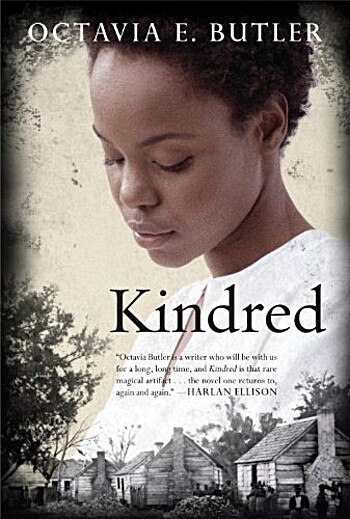
137. Kindred by Octavia E. Butler
Type: Novel
Original Language: English
Original Publication: 1979
Series: N/A
Genre: Science Fiction, Time Travel
Format: hardcover
Publisher: Beacon Press
Reading dates: 20 August 2021 - 21 August 2021
On her 26th birthday, Dana Franklin finds herself in a place she does not understand. She did not learn where she was at the time - she saved a boy and then found herself in her own living room. It all looks like a nightmare until it happens again and she finally realizes where (and when) she is - a plantation in Maryland in the 1810s. Which is the worst place she could be - Dana is black.
Time travel is one of the staples of Science Fiction - most of the major authors had tried their hand at it. Butler tackled the topic early in her career and put her own spin on it - not only she sends a black woman to the slave-owning South of the early 19th century, she also changes the rules of how time travel works. Dana did not end up there because of an experiment - she just got pulled into the past by something. And any time when her life is in danger, she goes back to 1976 just to be pulled back into the past. Time passes differently in the two eras with no real relation - days and minutes in 1976 seem to cover years in the past although the relationship is not exact.
Before long, Dana and her husband Kevin realize what is pulling her back (if not how) - a boy, and then a man, who is prone to incidents and who appears to be one of Dana's ancestors, Rufus, is always in danger and Dana is always there to save him. The boy is white (which causes some distress - she had no idea he was white even if she always had known his name) and his family owns slaves. If it was not tragic, these first meetings of the 1976 black woman and the boy who owns slaves would have been hilarious.
And so the story goes - Kevin gets stuck in the past by not being close enough to Dana once (although as he is white, his life is not as bad as it would have been... even if it is not easy either), Dana gets pulled at all kinds of weird situations and when she least expects, Rufus manages to grow up despite his attempts not to. And every time she goes back she needs to forget who she is and become someone else in order to survive.
The novel explores slavery in a way that I had not seen before. Butler does not even attempt to make Dana submissive - she may submit but it is because she needs to survive so she can go back to Kevin. It is Dana's story so she narrates the story - and that means that we only get what she sees and learns. Early in the novel Dana sees how slaves are made - by making them scared about their lives and about their families; by removing all but one thread from their lives - sell all children but one - so they have a reason to behave. Dana decides to live - despite being whipped, despite all that happens to her - so she finds a way to submit.
But even though she tells us often enough that this is a different world, she seems to still expect Rufus to change and do things the way 1976 men would behave and keep getting disappointed. On one hand, that's the everlasting hope but on the other, by the later years, she should know better - slavery did not survive for as long without the help of the slave-owners who really believed that are not doing anything wrong.
Butler's story is linear except for a few flashbacks where we see Dana and Kevin meeting and falling in love and the very first chapter. For some reason, it seems popular for books to pull a later chapter and start a novel with it. In some cases it works well - here I think it was a mistake. It told us that Dana survives long enough to lose a hand and that Kevin is there with her in the current timeline when that happens. Which takes a lot from the novel's dynamics - you know that no matter what happens, as long as we do not see this incident, she will be fine and Kevin won't be lost forever. On the other hand it allows a reader to concentrate on what is actually happening and not worry about Dana being shot (or worse). And yet - if anyone asks, I will recommend to leave this first chapter alone and read it just before the epilogue.
That's not the first Black depiction of slavery I had read but the contrast between the racism of the 70s (both families are really not that happy about the marriage) and the casual racism of the 1820s and 1830s is scary. Slavery may be gone but its influence is still with us (and even Dana's job is not slavery per se, you can draw a lot of parallels there as well). Add the rest of the characters - both slaves and slave owners and just as with Dana, the 19th century feels more like home and reality than 1976. One wonders if that was part of the intention - to show that we are not as far removed as one would have thought.
The novel is 40+ years old but for all intents and purposes it can be set today. Society may be better in masking some issues but not much had changed. And it can serve as a cautionary tale - people grow up learning their worldview and they rarely change - no matter how many times you save their life (for example).
Highly recommended - even if you do not like time travel and science fiction - under all of it is a historical novel which needs to be read. And if you ever believed Scarlet to be an independent woman, you really need to meet Dana.
120AnnieMod

138. Winterkill by Ragnar Jónasson, translated by David Warriner from the French translation by Jean-Christophe Salaün
Type: Novel
Original Language: Icelandic
Original Publication: 2020 in English; 2020 in Icelandic (as Vetrarmein), then translated into French in 2020 as Sigló and translated into English from this version.
Series: Dark Iceland (6)
Genre: Crime, Police
Format: ebook
Publisher: Orenda Books
Reading dates: 21 August 2021 - 21 August 2021
Apparently the explosion of Icelandic books being translated led to scarcity of translators so Orenda Books decided to get this one translated via the French translation. Either that or it was just much cheaper to do so.
A bit over 2 years had passes since last time we saw Ari Thór Arason - it is Easter and it seems like for a change that there won't be a blizzard during the holiday. Kristín had finally left for Sweden to finish her education, taking their son with her (now 3 years old) and the relationship which had survived a lot had finally cracked completely. Kristín and the boy are coming to visit and Ari Thór really hopes that the crime in the small town will keep at bay for awhile. He had been finally promoted and now has the job that Tomas had when Ari Thór moved north 7 years ago, complete with a cheeky rookie (one wonders if he sees how similar he is to how he was 7 years ago).
And then a teenager falls from a balcony and dies on the sidewalk. So much about the calm holiday.
This is the 6th book in the series which was not planned - Jónasson returned to his finished series. In a lot of ways it serves as a goodbye - get us caught up on how everyone is doing, allow some dangling threads from earlier books to close, give closure to Ari Thór. Ugla, who he fell for in the first book, comes back in his life, as usual at the time when he is still trying to decide if he is ready to let Kristín really go (not that Kristín sees it the same way - for her the only connection left is their son).
As with earlier books, it is as much a crime novel as it is a novel of a place - we see more of the area that we had not seen before and we get the usual investigation method from Ari Thór - go forward until something shakes up. He is not a criminal investigation genius - he gets his wins by hard work - and tends to overlook things - as any normal person will.
The book is melancholic - it feels like we are saying a final goodbye and the overshadows the crime a little bit. Oh, we do learn what happened and see once again that some people really do not deserve to be part of the human race - it is the vulnerable and the young who suffer. But Ari Thór's final decision of where his home is is what drives the novel - it is a place where we can leave our detective and don't worry about him.
It is not a good introduction to either the author or the novel - it is a love letter to the readers of the series. Even if it can work somewhat on its own, it will be incomplete and I don't believe the crime is not enough to carry it. But as an epilogue to the series, it is perfect. And I will miss the small town of Siglufjörður and its occupants and especially its Police Inspector Ari Thór Arason.
121AnnieMod

139. Prefecture D by Hideo Yokoyama, translated by Jonathan Lloyd-Davies
Type: Collection
Original Language: Japanese
Original Publication: 2019 in English; 1998 in Japanese (as 陰の季節)
Series: N/A (same universe as 64)
Genre: Police
Format: paperback
Publisher: MCD x FSG Originals
Reading dates: 20 August 2021 - 22 August 2021
4 stories set in the world of the novel "Six Four" (published before the novel in Japanese and it seems like this book may have been published as a novel).
The stories are independent although there is a link between all of them - the ace of the Personnel department Futawatari is there either as a main character (in the first story) or as a helper (the second and the third) or just show up for a minute (the fourth). Each of them deals with a mystery that happens inside of the police department itself - a senior policeman refuses to follow the standard order, a station chief is hounded by rumors just before promotion time, a female policewoman disappears, a political liaison is not allowed to do his job.
The stories are very Japanese - the structure of the police department there and the way their promotions work is very different from anything else I had ever heard and the bureaucracy itself and how it influences everyone is as much a character as the real characters are. And because of that, the stories also touch on how Japanese society works.
If you liked "Six Four", you will enjoy these. They are slow stories, with slow solutions but they are worth the wait. And as slow as they are, they are never boring. If you had never read "Six Four", you can try them I guess but they may be a bit too alien. I usually prefer to read stories and novels in the order they were written but in this case, I found these to be enjoyable because I knew a lot of small details already from the novel. But your mileage can vary of course.
122arubabookwoman
I've read and enjoyed several of Hideo Yokoyama's books, and I have Six Four qued on my Kindle for reading soonish.
123AnnieMod
>122 arubabookwoman: Six Four was my first book for 2021 (started in 2020 so last for it as well). I loved it - both the author style and the story itself and how it was built. So I plan to read everything from him I can find in languages I can read :) Have fun with it when you get to it.
124avaland
>120 AnnieMod: Interesting about the translation; I had not picked up on that. Great review. I just stopped reading his The Mist for a second time. If you haven't read it, it's his "Huldar" series; I'm not terribly impressed with it (give me a McDermid "Karen Pririe" novel any day, or even an Anne Holt). I do have the latest Jonasson, (a standalone), in the TBR pile.
125AnnieMod
>124 avaland: I liked the Hulda series - not as much as the other but it had its moments. It got a bit gimmicky with the inverted timeline and trying not to spoil things for the third book (and it got a bit predictable) but I still enjoyed them.
126avaland
>125 AnnieMod: So noted.
127AnnieMod
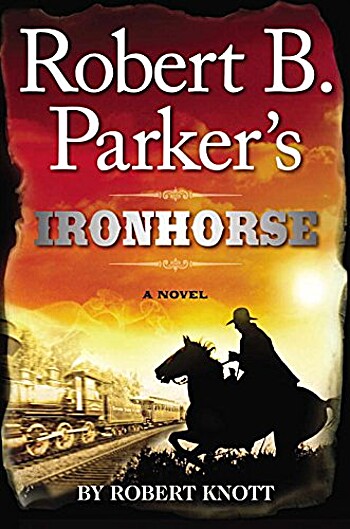
140. Robert B. Parker's Ironhorse by Robert Knott
Type: Novel
Original Language: English
Original Publication: 2013
Series: Virgil Cole and Everett Hitch (5)
Genre: Western
Format: ebook
Publisher: G.P. Putnam's Sons
Reading dates: 22 August 2021 - 23 August 2021
Robert Knott takes on the series and ends up overwriting it a bit - as pretty much anyone else who tried to emulate Parker's style.
After saving Appaloosa for a second time in the last book, Virgil Cole is now a territory marshal (with Hitch as his deputy). That does not change what they are doing except that they get some additional duties and they don't need to find someone to hire them before they step in to help with something. When we catch up with our heroes they are coming back from delivering some wanted men to the authorities in Mexico. The plan had been to ride back but after Virgil gets a note from back home, they decide to hasten and catch the train back.
And that is the time when some not very lucky bad guys decide to rob the train. As it turns out, the governor of Texas is on the same train, with a lot of money and with his complete family and the whole act of robbing the train was to mask the fact that the robbers knew about the money. What they did not plan on was Cole and Hitch who decimate their numbers... but not fast enough to stop them from splitting the train and getting away with some hostages. And the chase is on.
The novel is full of details about the trains of the era - as far as I can say, these were correct enough. Add Indians, abandoned mines and backstories of criminals and the story kinda works - a bit overwritten, a bit too Hollywood-y but decent enough.
What falls a bit flat are Cole and Hitch - Cole talks too much at the wrong times, the dialogs between them does not always work as it should. Knott tried - if you close your eyes to the irregularities, it sounds almost as it should but it is an imitation and not the real thing and it shows. And as the story is very different from the first 4, there is an attempt to use the dialog to tie the books - but it just does not fit the much more wordy narration we are getting.
As for that note that sent our heroes on the train - Virgil finally shares its content with Hitch and if you do not laugh at his deadpan delivery, you are not paying attention. Of course it is Ally - she managed to get in her usual ways... in a worse way than usual. It will be interesting to see what happens when Cole gets back home to Appaloosa.
It is a nice story and not a bad continuation of the story - it should even out with the next book. I was glad to meet Cole and Hitch again. And I really hope that Knott finds the middle ground between his own style and Parker's - Atkins showed everyone that it can be done - we do not need an imitation of Parker, there are many ways to continue a series.
128AnnieMod
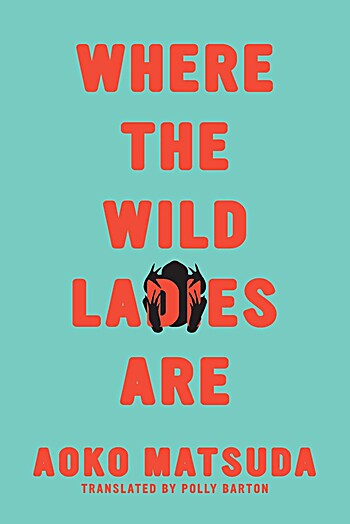
141. Where the Wild Ladies Are by Aoko Matsuda, translated by Polly Barton
Type: Collection
Original Language: Japanese
Original Publication: 2020 in English; 2016 in Japanese (as おばちゃんたちのいるところ)
Series: N/A
Genre: Fantasy
Format: ebook
Publisher: Soft Skull Press
Reading dates: 23 August 2021 - 23 August 2021
I almost did not finish the collection - the first few stories are competent but not really special - the Japanese setting is fascinating but they were just a bit flat. Until they started connecting to each other - and the flatness made sense - they were complete stories but they missed something and that something came from a different story later on (and in some cases early on).
17 interconnected stories (in 250 pages or so) build a single picture of a supernatural Japan that lives just under the surface on real-life Japan. This world is populated by ghosts (and if you think you know what ghosts are, you have another thing coming) and mythical creatures, existing in the same spaces the real one exists but hidden by the inability of most people to see it. Aoko Matsuda did not just recreate the legends (and old plays and myths and what's not), she also shuffled them together until they fit together as a unified whole.
I did not know most of the stories which became the base for the collection and its characters - in some cases things made a lot more sense after I read the notes at the end which were discussing the original tales that became the base for the specific story. There is a shared history and culture that you get only if you are deep inside of a society and this book is deep into the Japanese version of it. The notes helped but they also made me want to know more.
When I reached the end of the last story, I wished that there were more of them. Not because it was incomplete but because it was like a glimpse into a world which is so different and large that it is impossible to fully describe it. And yet - it felt complete. It could have easily been called a novel - it is connected enough for that and there is a thread in the middle which can become the base for a novel. But the collection format allowed for a more dispersed narrative - the company at the heart of the story is there in all of them, each story adding more details but without the need to have a plot around it. In a lot of ways, the collection is a slice of life story - just set in a life which you cannot really see. Unless you can.
The writing has this peculiar Japanese sharpness and sparsity that sound almost like being too easy in English and which makes Japanese writing so distinctive. In a collection so deeply tied to the Japanese myths and beliefs, other styles would not have worked.
With all that being said, it is not a perfect collection - not all the stories worked for me and some of them could have used some more in-story explanations (as opposed to allowing things to click only after you read the notes on the sources). But if you combine the stories and the notes, the unified whole works. And I was not surprised to see it nominated for the World Fantasy Award this year.
==
I blame wandering_star - she mentioned it and made me track it down. Then the World Fantasy nominations came out... :)
129AnnieMod
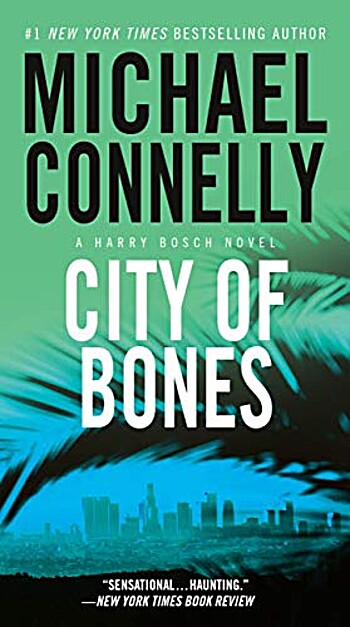
142. City of Bones by Michael Connelly
Type: Novel
Original Language: English
Original Publication: 2002
Series: Harry Bosch (8)
Genre: Crime, Police, Thriller
Format: mass market paperback
Publisher: Grand Central Publishing
Reading dates: 23 August 2021 - 24 August 2021
The bones of a boy are found in one of the canyons, next to a street called Wonderland Avenue on the first day of the new year.
Welcome back to the Hollywood division of LAPD - where Harry Bosch is back on the Homicide table, with as single partner (Edgar) after Kiz was promoted to downtown in an earlier book. And they are on call in that day - mainly dealing with the usual suicides - January 1 is one of those days.
When the bones are dated, they turn out to be 20-30 years old which would usually make the case almost impossible to solve. Except in this case, the detectives seem to have the opposite issues - there seem to be too many possible suspects. And it also causes Harry a lot of flashbacks - he could have been this child - which clouds his mind occasionally.
And in the middle of all that, Harry manages to fall in love with a new cop, Julia Brasher. He is not supposed to - there are rules about that and it also blunts some of his reactions a bit - and that, combined with his connection to the boy, almost costs everyone a lot. In fact it ends up with another dead body - which will probably stay on his mind for a long time to come.
When the truth about the case finally gets into the light, it turns out to be sadder than anyone could have imagined. Cases involving kids are always hard but sometimes they hit especially hard - both the detectives who work them (Edgar has a child after all) and the reader (because it sounds way too real).
The end of the novel was not exactly unexpected - it closes a chapter for Bosch. Where we are going from here is unclear - so we will see what comes next.
The next Connelly book is one of his rare non-series books. So Bosch will wait a bit until I get back to him.
130AnnieMod
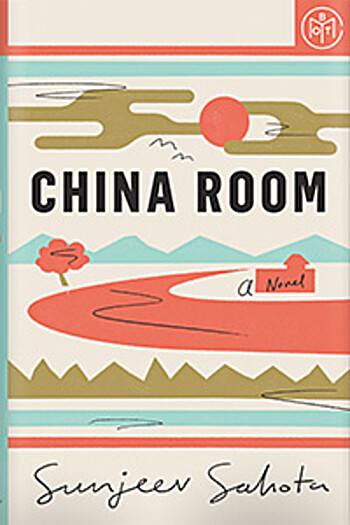
143. China Room by Sunjeev Sahota
Type: Novel
Original Language: English
Original Publication: 2021
Series: N/A
Genre: Historical Novel
Format: Harcover
Publisher: Viking ; BOTM/Historical Fiction
Reading dates: 24 August 2021 - 25 August 2021
In the summer of 1929, a 15 years old girl is married in the Punjab. 70 years later her 18 years great-grandson ends up in the same house, trying to kick out his addiction. Between the two summers, the world changes and yet, there seem to be enough lines that can be drawn between the two teenagers. Sahota does not reveal the relationship immediately, not completely - but the hints are there and it is spelled out early enough. It is not really needed in order for the novel to work - if anything I think it was one of the things that weakens it - but I will get back to it in a bit.
Mehar grew up in a small village in the Punjab and as was the tradition, she is promised/engaged when she was 5. Her new family gives her 10 more years at home but when she is 15, the wedding finally happens. Except that she has no idea who she married - there are 3 brothers, there are 3 weddings and noone knows who was married to whom. The 3 women live separately, they are always veiled around the brothers and the only time they meet them as husbands is in a dark room, when they are sent to wait for their husbands - because they need sons. Outside of this room, the 3 girls are interchangeable - they are there to serve their mother-in-law and the three brothers and to give birth to the next generation. And none of them finds that unusual.
Mehar really wants to know who her husband is - so she spends a lot of time trying to guess it. And while doing that she falls in love with one of the brothers.
That story of a bygone era is combined with the narration of a never named man - the great grandson of Mehar who tells us the story of his summer 20 years earlier - the hot summer of 1999 which he spent in the Punjab and in the house of his own family, learning a lot of that 1929 story. He was an addict and was sent to India to be kept away from everything. He finds the past, finds love and then goes back home.
While I was reading I was wondering just how many love stories can be added to a short book like this one - and every time I thought that we saw all of them, we got more. But this is not a happy end kind of book - that's not the point and it will not fit. In a lot of ways it is not a happy book at all - the man who is ready to throw everything for love never gets a chance, the woman who loves someone nearby needs to marry someone else, the boy who falls in love gets disappointed. Love is not something that anyone cares about - family, obligations and duty are more important.
The novel should have worked but I think that in the attempt to connect the two timelines, Sahota overdid it a bit. Mehar's story and the story of her world is overshadowing the other story and the connections you are supposed to make between the two of them seem to diminish the newer story even more. There are two separate stories here, both of them could have worked on their own but bungling them together somehow ended up less than the two of them separately.
I wish Sahota had spent more time in the 1929 - we see the world changing there through the eyes of Mehar and the men who love her but it is just a glimpse. That is normal - the small village is not a place where things happen and it takes awhile for things to trickle from the big cities. And yet, had it been any other year, Mehar's story may have been different. At the same time, the newer story is almost perfect in its depiction of its own past - as the narrator is talking from 2019, he goes back not just to his 18 years old self in the Punjab but back to his childhood - the story of a brown boy in a town in England where there was no Indian diaspora. You almost can see why he rebelled and ended up addicted - and it is a story that we all had seen in the papers way too often. Sahota's style is somewhat sparse and it works beautifully - he does not need to explain the feelings of the boy who is not allowed into a birthday celebration because of who he was but is still given some cake or the parents who try to make their life in a new place; neither he needs a lot of words to explain the unhappy marriage of the uncle in the Punjab.
It is a fascinating novel - the depiction of 1929 Punjab is not something I often see in novels. The dust jacket of the novel says that the novel was partially based on the author's family story. One wonders how much of what we saw really happened and where reality and imagination crossed. It has its problems but it is still worth a read.
Remaining Booker Prize Longlist Books 2021: Annie - 11:2
131AnnieMod
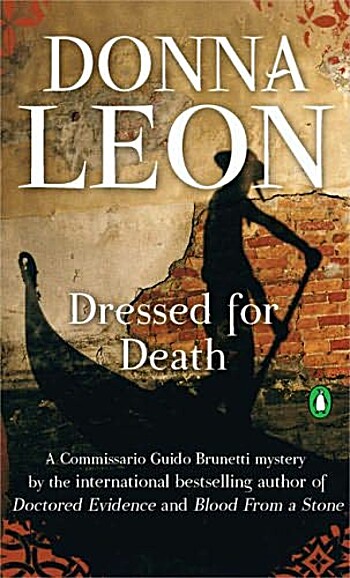
144. Dressed for Death by Donna Leon
Type: Novel
Original Language: English
Original Publication: 1994; Also published as "The Anonymous Venetian".
Series: Commissario Brunetti (3)
Genre: Crime, Police
Format: ebook
Publisher: Grove Press
Reading dates: 25 August 2021 - 26 August 2021
Back to reading the early books from the series. The story sounded familiar but I was not sure if I had read it before or had seen an episode based on it - I discovered Brunetti via the German series, not via the books. As it turns out, I've read the book in 2012 so there were flashes of "oh, I know where this is going" but not enough to spoil the pleasure of the novel.
It is a hot summer, everyone is on vacation so when a body is found next to a slaughter house in Mestre, Brunetti is sent to investigate. Meanwhile in the Questura in Venice, Patta is in a bad mood - not only his wife left him but she left him for a man who everyone knows - and not in a good way. And while Patta is trying to find a way to discredit the lover, Brunetti's vacation need to be delayed and/or cancelled - a murder takes priority.
Except that almost noone wants to really work the case - the man was dresses as a woman so everyone is ready to just call it an unfortunate incident and move on - transvestites are making Italian men uncomfortable, transvestite whores make things even worse. Even Guido has some weird thoughts, voiced only at home to Paula - which as usual serves to make him reexamine his thoughts.
The deeper Brunetti digs, the more it starts looking like the case is not as straight-forward as it appeared to be - things do not add up. And this is where I have no idea how much of what was getting obvious comes from how Leon wrote the story and how much was my memory serving me snippets from 9 years ago. A murder getting tied to corruption is nothing new in this series so I was not surprised that this is where the story went - if anything, this is a lot more likely in Leon's Venice than anything else.
And this is the novel where Signorina Elettra Zorzi makes her first appearance. The later novels cannot exist without her so her being the new character was a bit unusual. She is a lot more muted than in later novels but she still shows her ability to find information.
The end got me - I definitely did not remember the very end of the novel. I did not expect it - the novel looked finished and yet, it fits perfectly.
Another good entry in the series - and I am happy I revisited it.
132AnnieMod
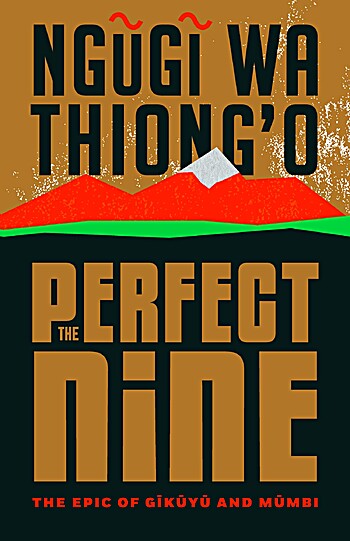
145. The Perfect Nine: The Epic of Gĩkũyũ and Mũmbi by Ngũgĩ wa Thiong'o, translated by Ngũgĩ wa Thiong'o
Type: Epic Poem
Original Language: Kikuyu/Gikuyu
Original Publication: 2018 (Kikuyu/Gikuyu (in Kenya) as Kenda Mũiyũru: Rũgano rwa Gĩkũyũ na Mũmbi); 2020 (English)
Series: N/A
Genre: Creation Myth; Epic Poem
Format: hardcover
Publisher: The New Press
Reading dates: 26 August 2021 - 27 August 2021
Retelling creation myths can be tricky - trying to retell them for local audience needs to find a way not to offend, trying to retell them for global audience can fall flat when the story is not well known. Ngũgĩ wa Thiong'o chose to retell the Gĩkũyũ people of Kenya's myths in the form of an epic poem and then to translate it himself into English. And somewhere between the format and the translation, something got lost.
The poem was written and initially published in the Kikuyu/Gikuyu language. It was written for a local audience - for people who grew up with the language and the shared culture and knew the original legends (and probably had heard at least a few versions of it). Translating this kinds of works is extremely hard and sometimes the writer is the best person to translate when they know the second language well enough - as is the case here. But that can backfire a bit - because Ngũgĩ wa Thiong'o knows his language and culture, he never stops to think if something needs a culture-translation as well. Novels and stories are easier in that regard - there is enough space to explain and create the needed bridges. Poetry, even free verse one, is different. Especially when it heavily relies on allusions and other literary devices. The way to solve that is usually to add translator notes or author notes - explain the legend, explain some of the culture. Especially in the case when the culture is as different from the Western ones and when, even in our very technological 21st century, finding information online about this culture is not that easy.
Ngũgĩ wa Thiong'o adds a 2 pages introduction which tells the base of the legend... and that's it. If there was a book written in the last years that needed notes, that was it.
Not that it does not work as a poem - you do not need to understand every single thing to understand what is happening. Once upon a time, there were a man and a woman. They went through some challenges and made a family - and had 10 daughters. When they came of age, men came to ask for their hands and they had to proof how serious they are so they are allowed to marry a girl and become the patriarch of one of the peoples' tribes. There is a play on the numbers here - the original legend has 9 sisters, the perfect nine here are actually 10 because one of the sister's history is a bit different. 9 will remain important across the poem (and 7 seems to be showing up in bad situations - I would have a note on the numbers and their meaning in the culture). Some of the challenges for the grooms-to-be are mundane, some are supernatural (there are a lot of ogres in this mythology). Men die, men give up, men behave badly. Until 10 remain. Cue weddings, children, more heartbreak and the end of the story, mirroring the beginning. Some of the parts work better as poetry than others; some sound almost like prose which had been spaced weirdly (but then a lot of modern poetry feels like that to me).
The story is straight forward but its beauty is in the details. And that's where the English translation fails a bit. Most of the daughters have more 2 different names (one has 3 - one used only once when she is listed and another 2 used any other time she is mentioned, including when she is introduced) and it is never clear why or what the names really mean - we learn some of the backstory of some names but I cannot stop thinking that these make a LOT more sense in their own language. And I am sure a lot of the story details pinged on something in the soul of a person who had grown up in the culture - the way my culture's local legends can do it for me when I listen to them. I hope that one day there will be annotated version of this book (or that someone will add some notes on a later edition) - maybe some of the failures of the book will actually clear out when the background is there.
The book was part of the 2021 Man Booker International Prize Longlist and I can see why - it is different and it kinda works. But I suspect that who wrote it also played a role. It was my introduction to Ngũgĩ wa Thiong'o and as it was his first foray into epic poetry, it was probably not the best possible one. I plan to read more of him - he had been on my radar for awhile. And despite its problems, I am glad to have read this one.
133AnnieMod
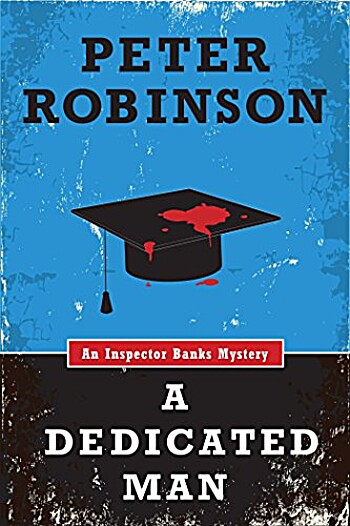
146. A Dedicated Man by Peter Robinson
Type: Novel
Original Language: English
Original Publication: 1988
Series: Inspector Banks (2)
Genre: Crime, Police
Format: ebook
Publisher: Scribner
Reading dates: 27 August 2021 - 28 August 2021
Alan Banks did not move to the end of Earth (well... Yorkshire but it kinda qualifies after London) just to be stuck with gruesome murders again. But being Detective Chief Inspector it is part of his job. And people don't get better and behave better just because they live in the countryside.
Harry Steadman is a local historian and archeologist who does not seem to have any enemies in the small village of Gratly. And yet, someone hit him on the head hard enough to kill him - and then hid his body (not very expertly). Small villages tend to hide secrets and Harry is somewhat of an outsider - he moved there in the last years only although he was already known from long vacations he spent in the village before that. But anyone who had ever lived in a small place knows that these places also tend to generate a lot of rumors and trying to sort between rumor and fact is hard, especially if you really do not know the area.
Alan Banks suspects from the beginning that there is something under all the rumors but even he gets surprised when the truth starts emerging. He spends the novel trying to stick to his decision to stop smoking cigarettes and instead take to a pipe (it is 1988 after all - these days, it would have been vaping I guess although then the Sherlock Holmes connection would be lost) and that makes him think of Holmes and his usual motto - eliminate the impossible and whatever remains, however improbable, must be the truth. That is what ends up solving the case - but not before more lives are lost and a lot of happy memories shattered.
The novel is dated - it was written in 1988 and it was a different world back then. On the other hand it is too new to be different enough to be interesting because of that. As such, it has its problems - you need to keep in mind when the book is written or the blatant sexism may make you want to stop reading. But then it is normal for books written in a different time - the dales of England in the late 80s may as well be a different world sometimes.
It is not a great novel but it is a decent one and I enjoy the series.
134AnnieMod
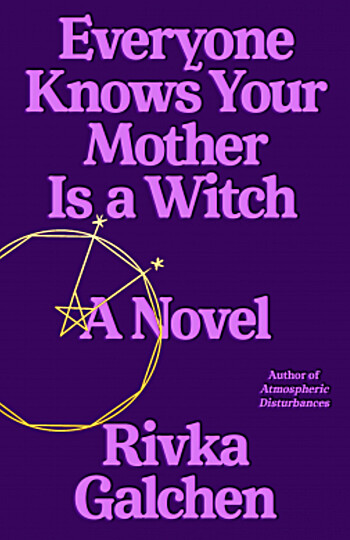
147. Everyone Knows Your Mother Is a Witch by Rivka Galchen
Type: Novel
Original Language: English
Original Publication: 2021
Series: N/A
Genre: Historical Novel
Format: Harcover
Publisher: Farrar, Straus and Giroux; Powell's Indiespensable 92
Reading dates: 28 August 2021 - 29 August 2021
Historical novels which deal with real people can be tricky - stray too far away and what was the point in starting with the actual person; stay too close and it feels like you wanted to tell the story but did not want to do the complete research to make it a history book. In this novel Rivka Galchen found the happy middle ground between the two - the place where these kinds of novels work the best.
In 1615, Katharina Kepler was accused of being a witch. In case the name rings a bell but does not connect - she is the mother of Johannes Kepler, one of the key mathematicians, astronomers and astrologers (and a few more things - the sciences and pseudo-sciences are still the same thing at that point - he considered himself a mathematician) of the 17th century that allowed later scientists to understand astronomy and physics. Galchen takes this story and builds a novel around it, keeping it as close to the real history but with enough fictional elements and changes to make it work as a novel. You do not need to know the real story - if you do, you know how the story must end - neither you need to know anything about the 17th century really.
Katharina is a widow, living alone in Leonberg (with her cow). She cannot write or read so when she decides to tell us her story, it is a neighbor, Simon, who records it for her 4 years into the trial. At the time when that happens, she is in her 70s so her account is anything but linear - she talks about the trial and about her own past; the record is started in 1619 so there is an element of unreliable narrator in there. This journal/account forms the base of the book - it gets interspersed with Simon's notes, letters (from different people) and the transcripts of the testimony of the people who had been interviewed for her trial.
One of the traps in writing this kind of novels is to make the main character too good - the author trying too hard to win the reader's sympathy. Katharina is anything but - for most of the book, she is the know-it-all, better than everyone matriarch who does not believe that bad things can happen to her - not this kind of things anyway. As more than one character says in the novel - she made her own trouble in a way. And despite that, you cannot stop being on her side - the whole trial is as ridiculous as most of the other witch trials on both sides of the Atlantic.
Katharina may be the local grandmother who never knows when to keep her peace (you probably had one of those or knew one just like that once upon a time) but when the accusers start elaborating, the biggest issue seems to be that she simply does not behave the way a widow should behave. Which in the early days of the 17th century is a reason enough for a woman to be suspect and once someone in the town accuses her (for reason that were never made clear besides just looking to do harm), everything bad seems to be now caused by her - animals getting sick or dying, people getting sick or dying -- suddenly everyone remembers Katharina having been there. If you ever lived in a small place, a place where everyone knows everyone, that rings true and even more so in the superstitious 17th century.
The novel is full of history - not the big history you tend to get in school but the daily things - how people lived, how they survived what was thrown at them (although the Big history does intervenes - a war is a war no matter how small and insignificant you are), how the world worked. Katharina loses everything she had long before her trial actually ends - she needs to pay for her prison guards and all other legal expenses even if she has no saying in where and how she in imprisoned.
At the end, it does not matter how the trial ends. Galchen handles that masterfully - the story ends with the last speech of the accusers and then jumps a dozen or so years, with Simon trying to sell Katharina's story, long after she is dead. The point of the novel is the trial and the devastation it caused in everyone's lives. It is not just the story of one woman and one trial; it is the story of a time and place, using the single story as a vehicle. We learn how this specific story ends but it is an afterthought.
With all this being said, this should have been one of my favorite novels this year. But something is off - something just did not connect completely. The middle drags and after a powerful start the novel never reaches the same level - the end is definitely better than the middle but nowhere close to the start. It is not a bad or really a disappointing novel but it is possible that the choice to tell the story completely in the voices of the participants was a bit miscalculated - especially because that did not allow a lot of the secondary characters to shine - for example Maruschl, who Katharina is very fond of, sounds less defined than the cow Chamomile. But then Katharina cared about the cow a lot more at the end anyway (or so it felt). So maybe that was part of the point. But it just did not work completely for me. And yet, it is a novel worth checking.
135lisapeet
You sold me on Where the Wild Ladies Are.
I have the Galchen and will maybe get to it someday, but I've heard a few criticisms of it that match yours. So... second tier TBR.
I have the Galchen and will maybe get to it someday, but I've heard a few criticisms of it that match yours. So... second tier TBR.
136BLBera
Your comments are great, Annie. You make me want to read so many of these books. Right now, China Room is at the top of my list.
137AlisonY
>134 AnnieMod: Ah, I was poised to add this to my wish list until I got to your last paragraph. It'll go onto the mental 'some day' pile now instead.
Enjoyed catching up on your reviews - I'm a bit behind on LT as work's busy.
Enjoyed catching up on your reviews - I'm a bit behind on LT as work's busy.
138AnnieMod
>137 AlisonY: Well, other people liked it more than I did. Not that I disliked it per se - in a way, the beginning played a bit of a trick on it - it set the expectations too high. It’s still a good novel - but not the really good one it could have been. As i said - I won’t be surprised to see it on award lists. Maybe more literary readers will like it more - contemporary novels are not my style (usually) and this one, albeit being historical, had that feeling to it. Who knows.
>136 BLBera: Sorry. I think :) Maybe not. And thanks. :) I tend to ramble occasionally while trying not to reveal spoilers and still explain what worked or did not work.
>135 lisapeet: It is very Japanese and may not work for everyone but I hope you like it if you decide to read it. :) As for the Galchen - I am still sorting through my own reactions - the style and the chosen format predicate some of the issues with it but even with that, it just did not click.
>136 BLBera: Sorry. I think :) Maybe not. And thanks. :) I tend to ramble occasionally while trying not to reveal spoilers and still explain what worked or did not work.
>135 lisapeet: It is very Japanese and may not work for everyone but I hope you like it if you decide to read it. :) As for the Galchen - I am still sorting through my own reactions - the style and the chosen format predicate some of the issues with it but even with that, it just did not click.
139avaland
>133 AnnieMod: For a second, I thought I had missed a DCI Banks installment! Phew!
>134 AnnieMod: Great review. Too bad the book didn't touch your reading 'sweet spot".
All ok with you?
>134 AnnieMod: Great review. Too bad the book didn't touch your reading 'sweet spot".
All ok with you?
140AnnieMod
>139 avaland: Banks was one of those series I never got around to - so I had been fixing that gap. Due to the variety of genres I read, it is hard to keep up with all of them :)
Galchen is memorable. It did not quite work for me but I still found it readable and good. I’d read other books by her - I know that my tastes sometimes run to the more classical and conservative presentation, especially with historical fiction so I tend to make allowances for that. And despite my misgivings here, there is something in that book that actually works. Hard to explain sometimes.
I just hit a rough patch - I had been reading this time around (a lot - I may have read more books this quarter than any quarter in my life) but any time I thought of updating the thread, my brain rebelled. May be partially because I hit a spot at work where I had to do a lot of writing - I love my job but there are parts of it I wish I could delegate. I should be back with reviews probably in the next days - the fact that it is October and I am still around at all is almost a miracle - we all know my track history in Club Read. Thanks for checking on me :)
Galchen is memorable. It did not quite work for me but I still found it readable and good. I’d read other books by her - I know that my tastes sometimes run to the more classical and conservative presentation, especially with historical fiction so I tend to make allowances for that. And despite my misgivings here, there is something in that book that actually works. Hard to explain sometimes.
I just hit a rough patch - I had been reading this time around (a lot - I may have read more books this quarter than any quarter in my life) but any time I thought of updating the thread, my brain rebelled. May be partially because I hit a spot at work where I had to do a lot of writing - I love my job but there are parts of it I wish I could delegate. I should be back with reviews probably in the next days - the fact that it is October and I am still around at all is almost a miracle - we all know my track history in Club Read. Thanks for checking on me :)
141cindydavid4
didn't realize you'd been ill! hope you are getting better and will heal soon!
I know you like short stories and sci fi. Have you read anything by N.K. Jemison? Her How Long 'Til Black Future Month?is outstanding. Many of the stories were starts of her novels, so if you've read those they will look familar. She has quite a range, sci fi, fantasy, horror, dystopic, and steam punk mystery, plus quite abit about class differences and identity. Anyway just finishing it, and highly recommend it.
I know you like short stories and sci fi. Have you read anything by N.K. Jemison? Her How Long 'Til Black Future Month?is outstanding. Many of the stories were starts of her novels, so if you've read those they will look familar. She has quite a range, sci fi, fantasy, horror, dystopic, and steam punk mystery, plus quite abit about class differences and identity. Anyway just finishing it, and highly recommend it.
142japaul22
Despite your reservations, I'm still interested in Everyone Knows Your Mother is a Witch. It's such a modern sounding title for a book set in the 1600s - it has me intrigued. On the list it goes and we'll see if I ever get around to it.
143AnnieMod
>141 cindydavid4: Well, my local ER happens to be Mayo Hospital so at least I was very lucky with the care I got when I got admitted. The doctors tell me I am healed now (or words to that effect). But that is different from back to normal. :)
Jemisin is an old friend on my reading lists. I have some issues with her meandering middles on her longer works and trilogies but her short fiction does not have the time to get that way so it works as a charm (plus it is a common malady of the genre so I am not even that upset with her longer works). I had not read that one yet but I had read a lot of the stories included in it. :) And I need to talk about stories more often (and read some - 2021 had been very weird).
>142 japaul22:
I will look forward to seeing your thoughts on it. It is not a bad book at all and some people love it. And I enjoyed the writing. :)
Jemisin is an old friend on my reading lists. I have some issues with her meandering middles on her longer works and trilogies but her short fiction does not have the time to get that way so it works as a charm (plus it is a common malady of the genre so I am not even that upset with her longer works). I had not read that one yet but I had read a lot of the stories included in it. :) And I need to talk about stories more often (and read some - 2021 had been very weird).
>142 japaul22:
I will look forward to seeing your thoughts on it. It is not a bad book at all and some people love it. And I enjoyed the writing. :)
144cindydavid4
The doctors tell me I am healed now (or words to that effect). But that is different from back to normal. :)
totally understand. glad youi were in good care.
I agree with you about Jemison's meanderings. Found it particularly in 1000 Kindoms, which actually caused me to not finish the series. Then my book group read Stone Sky and well, I was hooked. That series was just amazing, I even forgave the meanderings and often understood them. Still haven't finisted the Kingdome series, need to do that. I think you'll love the short stories; I had read some as well but seeing them together with these put her work togeher for me.
totally understand. glad youi were in good care.
I agree with you about Jemison's meanderings. Found it particularly in 1000 Kindoms, which actually caused me to not finish the series. Then my book group read Stone Sky and well, I was hooked. That series was just amazing, I even forgave the meanderings and often understood them. Still haven't finisted the Kingdome series, need to do that. I think you'll love the short stories; I had read some as well but seeing them together with these put her work togeher for me.
145AnnieMod
>144 cindydavid4: If you want an advice - push through the middle. I find her ends better than her beginnings - and that says something. :) The middles make sense but I find that to be a problem of most modern fantasy trilogies (and even single novels sometimes)... and it annoys me. I do not mind a long novel or series (just look at Malazan) but... long for the same of being long enough is just annoying.
146cindydavid4
I think I may just do that. Just finished reading a NYer article about her, and am now very interested in restarting that series. sigh. Two new doorstopper books are on my TBR shelves. Really wish I coud clone myself so I can read m ore at once! Anyway, Ill start it and report back
https://www.newyorker.com/magazine/2020/01/27/nk-jemisins-dream-worlds
Love this quote "Accepting her third Hugo, Jemisin stood at the lectern, with the rocket-shaped award beside her, and declared, “This is the year in which I get to smile at all of those naysayers, every single mediocre, insecure wannabe who fixes their mouth to suggest that I do not belong on this stage, that people like me could not possibly have earned such an honor, and that when they win it’s ‘meritocracy,’ but when we win it’s ‘identity politics.’ ” Holding up the award, she added, “I get to smile at those people, and lift a massive, shining rocket-shaped finger in their direction.”
https://www.newyorker.com/magazine/2020/01/27/nk-jemisins-dream-worlds
Love this quote "Accepting her third Hugo, Jemisin stood at the lectern, with the rocket-shaped award beside her, and declared, “This is the year in which I get to smile at all of those naysayers, every single mediocre, insecure wannabe who fixes their mouth to suggest that I do not belong on this stage, that people like me could not possibly have earned such an honor, and that when they win it’s ‘meritocracy,’ but when we win it’s ‘identity politics.’ ” Holding up the award, she added, “I get to smile at those people, and lift a massive, shining rocket-shaped finger in their direction.”
147RidgewayGirl
>134 AnnieMod: I really liked this one, and I think your review was excellent. It's certainly not in any way like what we think of when the words "historical fiction" are uttered.
And I've picked up Jemisin's short story collection. I'm not a fan of science fiction, but I like short stories and I've heard so many good things about her writing.
And I've picked up Jemisin's short story collection. I'm not a fan of science fiction, but I like short stories and I've heard so many good things about her writing.
148cindydavid4
>147 RidgewayGirl: they are really more fantasy, and none of the sci fi parts are 'hard sci fi" so you'll probably be fine
149RidgewayGirl
>148 cindydavid4: Well, fantasy is the other genre I don't generally enjoy, but I'm always open to good writing.
150AnnieMod
>149 RidgewayGirl: Try them - good stories are good stories regardless if the maiden throws herself from a cliff after 10 pages of lyrical writing or if she gets eaten by an elf... or something.
I understand that the core genres can be perceived as too far away from reality to be enjoyable but there are bridge works and bridge authors and good writing is good writing. I am a lot more tolerant of genres (I am a genre reader more than anything) so it is sometimes hard to recommend/help but... if one is adventurous enough, exploring the genres is not much different from exploring different types of writing. So have fun :)
>147 RidgewayGirl:
I am not surprised. As I keep saying - it is a good novel, something just did not click for me - and that can happen with even the best novels - we all bring ourselves into our reading. I think it was the format that got me - not because of it on its own but because of where it did not allow the book to go. And I have a suspicion that when I look at my 2021 reading, it may still make my "best of" list despite my misgivings and despite all the wonderful books I had been reading this year - things do not need to be perfect to be really good sometimes and sometimes an imperfect book is more memorable than something that gets you gushing about it...
I understand that the core genres can be perceived as too far away from reality to be enjoyable but there are bridge works and bridge authors and good writing is good writing. I am a lot more tolerant of genres (I am a genre reader more than anything) so it is sometimes hard to recommend/help but... if one is adventurous enough, exploring the genres is not much different from exploring different types of writing. So have fun :)
>147 RidgewayGirl:
I am not surprised. As I keep saying - it is a good novel, something just did not click for me - and that can happen with even the best novels - we all bring ourselves into our reading. I think it was the format that got me - not because of it on its own but because of where it did not allow the book to go. And I have a suspicion that when I look at my 2021 reading, it may still make my "best of" list despite my misgivings and despite all the wonderful books I had been reading this year - things do not need to be perfect to be really good sometimes and sometimes an imperfect book is more memorable than something that gets you gushing about it...
151cindydavid4
>149 RidgewayGirl: Hee, well, the kind of fantasy I like, and sci fi fits as well, are worlds I can relate to on some level as a human being, with plots that are understandable, and characters who are well rounded and interesting.s. I give you Asimov vs Ray Bradbury; Robert Heinlein versus, well, jemison.
152AnnieMod




I occasionally review books from the same series together. But this is not what connected these 4. They are from different publishers, they are from different authors, 2 of them are translations; 2 are novels, 1 is is a collection and 1 is a novella pretending to be a novel (also known as modern French novel). So why review them together you may ask? Because without me planning it or intending to, these 4 books took me on a trip island-hoping around the world. I read other books between them but these 4 kinda stick together in my mind.
It kicked off with Silent Winds, Dry Seas by Vinod Busjeet, an author born in Mauritius, the small island nation in the Indian ocean, who went away for school and stayed out of the country. Busjeet's debut novel introduces us to Vishnu Bhushan, a man who was born on the island but emigrated and is now returning for the first time in decades. As the novel progresses, you start seeing the parallels between Vishnu's life and the life of the author and you cannot stop wondering just how much of the novel is fiction and how much is fictionalized real history.
The story is a big series of flashbacks - there are elements from the here and now but it is the story of Vishnu (and by extension of Mauritius). And somewhere in that personal story are mixed details of the island's colonial past (everyone owned the island at one point or another) and its current multi-ethnic reality - there is no indigenous population when someone in the Arab merchants/travelers first found the island; everyone was shuffled in via the progression of colonials and then all the populations mixed... or most of them anyway. And that's where Mauritius is different - the main part of the population is Indian, having arrived here as indentured servants and then making their live on the island. But there are also the Chinese, the French and the Creole - and all kinds of mixes making the questions of race and language even more messed up than usual - causing all kinds of weird issues occasionally.
Vishnu is privileged (to the point that when he needs work in the States, he refuses to work in a kitchen because this is not what men do - seeing how he reevaluates these ideas makes the later part of the novel quite entertaining) but not really part of the elite. Which causes most of his issues - he seems to occasionally be in that middle ground where he believes he deserves everything but others don't think so. And that seems to be the story of Mauritius in a nutshell.
The writing is overly lyrical in places, with poems showing up as chapters here and there (short ones and they can be skipped although they are the ones that will make you laugh in this novel). And yet, somehow, it works as a whole. The narrator is relatable even when he is arrogant and the glimpse into the history of an island and nation is always fascinating.
And after visiting the island with no indigenous population, I was off to Tasmania with the short story collection Born Into This by Adam Thompson. The author is Aboriginal Tasmanian (known as pakana) and his 16 stories are all about and of the life of the Aboriginal Tasmanian population. As it turns out, Tasmania is just the biggest of the islands populated and used by the blackfellas (a term you will see more than once in these stories). The language is almost a counterpart of the previous book - it is raw and occasionally crude but it works as well as Busjeet's lyricism worked for his novel.
The 16 stories are grounded in the here and now - from the alcoholism to the Australia Day protests; from the inane government plans to the locals trying to survive. It is an honest look - not everyone is good, not everyone does things for the greater good. There is romance but there is no romanticism in the book - life is hard, no point sugarcoating it. So the questions of identity and belonging become the important ones - both for the Aboriginal population and for the rest of the inhabitants. And there is something extremely uncomfortable in realizing that the people who were there first do not seem to belong anymore; that the island seems to be moving towards modernity, leaving its native children behind. And unlike Vishnu in the Busjeet's novel, they have nowhere to go back to.
Unlike the narrator of Siri Ranva Hjelm Jacobsen's Island (published as Ø in Danish; translated by Caroline Waight). My islands hoping tour catapulted me north, into the Faroe Islands where a Danish author with Faroese roots takes her narrator (who shares her ancestry - it again becomes hard to separate an author from a narrator) to the island of her grandparents. The novel has two timelines that get weaved around each other - the grandparents leaving the islands for Denmark and the granddaughter coming back home after their deaths. The two stories meet in the narrator's memories so it really becomes a 3-timelines narrative, split between the two places and shifting between them and across the years. It is a tale of emigration and longing to belong, of assimilation and getting yourself lost and then finding yourself again. The Faroe Islands are where the family is; Denmark is where the future seems to be. There is something sad about that, something almost anyone who moved away from home will recognize. The novel is a meditation on the process of migration - stating occasionally facts that rarely get spoken about (like the three generation principle: the first generation moves, the second needs to succeed so they become doctors and lawyers and so on, the third is where people really have a choice to become artists and trombonists if they want to). There is a lot of history in this book, there are a lot of heartbreaks but there is also laughter (and a theory on why the Faroese football team (soccer for the Americans...) does not to very well when they are away from home).
If anything, the novel tends to be too busy in places - too many people, too many actions. But then... isn't this what happens when you go back home when you live abroad? The style can also be jarring in weird ways - it did not completely work for me but I appreciated the details of the islands.
And just when I was thinking that I am done with the island, I ended up back in Mauritius. It was not planned. None of these books were. They just showed up in the "just added" list of the library and sounded interesting so I decided to try them. But whatever the reason for that happening was, here I was back in Mauritius again with Carl de Souza's Kaya Days(published in French as Les jours Kaya; translated by Jeffrey Zuckerman) - in a single point of a time - a day and a night in 1999 during the riots after the death in custody of Joseph Réginald Topize, better known as Kaya - a local musician whose only crime was that he smoked weed during a concert (there is no way to read this in 2021 America and not flash back to last summer). The author is from Mauritius and still lives there.
The main narrator is a young Indian girl (a teenager most likely although we never learn her age) who is sent by her mother from the village they live in to pick up her 11-years old brother from his school in the city. The boy is not where he is supposed to so our narrator is off looking for him - getting herself in all kind of weird situations - a pair of Chinese casino girls mistake her for someone else and dress her like themselves, the casino owner almost rapes her, a taxi driver takes her for what she is dresses and tries to fulfill his own dreams while driving around the town, a Creole boy seems to fall in love with her. It is a stream of consciousness novel (or novella... it may be too short to be a novel) which occasionally shifts the narrator to a different character. And through the eyes of the narrators, we see Mauritius in its multi-ethnic glory - all together, all apart. And somewhere in there, our narrator passes from her childhood into her womanhood - not physically but mentally and we get a front seat to her memories and regrets. She grows from naive to confident; from the village girl to the woman that can order a man to do things for her; from the one that was always supposed to care for her brother to the one her brother is afraid of. It is claustrophobic and crazy and the rioting and he looting and history just merge into one to make the story of a girl. Or a woman - which somehow becomes the story of the island. That novel will either work for a reader or it won't - it has this very weird quality that tends to split people's opinions.
I am not sure I would have appreciated it as much as I did without Busjeet's novel. It gave me the history and the background; it gave me an understand of the complexity of the ethnic makeup of the small island. de Souza has some of that as well but because of how the novel works, because of the short period it covers, because of who the narrator is, it cannot really show you all of that.
How exactly I ended up with 2 novels about Mauritius in as many weeks (and 4 books overall about islands) is one of those weird questions that will never find an answer. It happened. There are moments like that in one's reading when the things just line up and help each other. Serendipity as someone called it earlier this year in my first thread.
All of these are 2021 books in English (in case someone wants to look them up). My favorite of the 4 is the short story collection - its rawness works perfectly. I liked all 4, for different reasons and in different ways. And each of them played a different side of the same question - what is home and what is to belong.
153rocketjk
>152 AnnieMod: Wow! A fascinating foursome, and thanks for the great reviews.
154RidgewayGirl
>152 AnnieMod: All four books sound intriguing and I've made note of them.
156lisapeet
What an interesting quartet. I love when books connect serendipitously like that. I have the Jacobsen and the Busjeet—you make a good case for reading them together.
One of these days I'll try N.K. Jemisin again. I really didn't like The City We Became, but I'm sure her other work is plenty different.
One of these days I'll try N.K. Jemisin again. I really didn't like The City We Became, but I'm sure her other work is plenty different.
157BLBera
>152 AnnieMod: Great comments, Annie. I will keep these in mind.
158AnnieMod
>153 rocketjk: >154 RidgewayGirl: >155 kidzdoc: >156 lisapeet: >157 BLBera: Thanks :) It is kinda amusing - the last of these is the type of books I usually don't like and yet, it somehow worked despite its narrative style and its craziness. It just fit. :)
>156 lisapeet: That's one of the Jemisins I had not gotten to yet and it appears to be different from most of her other works. And there are people that simply do not like her style. Tastes vary.
The Jacobsen and the Busjeet work on their own just fine - but reading them close to each other added a layer of familiarity and longing for home (or dialed the existing one up maybe). I've learned a long time ago that books don't exist in isolation and other book and non-book related matters influence how someone perceive a book at a given time. One may wonder if part of why these resonated that much with me is that I had not been back home since 2019.
>156 lisapeet: That's one of the Jemisins I had not gotten to yet and it appears to be different from most of her other works. And there are people that simply do not like her style. Tastes vary.
The Jacobsen and the Busjeet work on their own just fine - but reading them close to each other added a layer of familiarity and longing for home (or dialed the existing one up maybe). I've learned a long time ago that books don't exist in isolation and other book and non-book related matters influence how someone perceive a book at a given time. One may wonder if part of why these resonated that much with me is that I had not been back home since 2019.
159AnnieMod
And back to attempting to review in some semblance of order (well... starting with the latest I finished and then going for the ones I missed:

180. Dog Park by Sofi Oksanen, translated from Finnish by Owen Frederick Witesman
Type: Novel
Original Language: Finnish
Original Publication: 2021 in English, 2019 in Finnish as Koirapuisto
Series: N/A
Genre: Contemporary, Thriller?
Format: ebook
Publisher: Knopf
Reading dates: 9 October 2021 - 11 October 2021
I don't like open endings - they rarely work and they make me fill cheated - why did I read the whole book just to be denied the end. And yet, when they work, they can add to a novel.
We meet the narrator of this novel, Olenka, in a dog park in Helsinki where she is watching a family - Mom, Dad, a boy, a girl and a dog. All very innocent, all very mundane. Except that she has a reason to watch that specific family. It is 2016 and Olenka had been in Finland for 6 years - under an assumed name, hiding from almost anyone who knows her.
The novel goes in two directions - one in the past, catching up to how she ended up on that bench, and a second one in the present - chronicling the end of her relatively carefree days.
The bulk of the novel is in the past, told to us by Olenka in a somewhat chronological order (with some flashbacks inside of the flashbacks and with sudden revelations that throw off any ideas about where the story was going). The story unspools slowly, adding the missing pieces to form the whole story. Told in any other way, it would not have been as effective (which also makes this book almost impossible to reread...) - part of what makes the story what it is, is this order.
In the mid 2000s, Olenka comes back from Paris to her village in the Donbas area of Eastern Ukraine with her tail between her legs - she tried to be a model and she failed. Her mother and her aunt are cultivating poppies and cooking compote - the lowest grade heroin that exists - and the family survives from the money they make from it. Despite speaking a few languages, finding a job proves to be hard - you need to either be related to someone or to sleep with someone... and the only two businesses which does not require either are mail catalog brides and donating eggs (or surrogacy). Before long, she works for one of the agencies dealing with the latter - not just donating but as a coordinator. And her new life begins. Except that in order to have it, some of her past had to be reinvented.
The parts of the novel that deals with the business of human babies is fascinating - Olenka insists that they are doing nothing wrong but the weak laws of Ukraine in that regard allow way too much leeway. The revolutions and upheaval that keeps going on in the country in the 2000s do not help matter much so the business continues. And then there is Daria. The two girls know each other from the town they both erased from their collective history. But erasing it from the papers do not erase reality and while Olenka sees Daria as her own ticket back to France, Daria proves to be her downfall. Just how badly and how exactly we won't learn until almost the end of the novel but it is the appearance of Daria in the Helsinki dog park that would spell the end of the life Olenka had built for herself.
Although noone can blame Daria for everything - for all her sins (and we will learn that there are a lot of them), she did not fare that well either. It all started innocently enough - a new customer (a local and not a foreigner this time around) who turns out to be a lot more important than Olenka expected. But in the process of helping the family to get their child, she falls in love and ends up moving in circles noone expected her to be. And that is how her mother finally learns who she works for - and we get a flashback inside of the flashback to the mid 1990s - the days after the fall of USSR and her childhood - from Tallinn to Ukraine, finally filling in the missing pieces. Her choices doom her and she runs - losing everything. And that's how we find her on that bench in Helsinki - trying to survive and now being threatened by Daria.
We never learn the end of the tale - although there are only two possible outcomes. And despite my distaste for open endings, I actually like it here - it works. It allows someone to decide who will be believed at the end, with all the consequences of it. Writing the end would have been the cheating here - especially if it did not go the direction one wanted to after reading Olenka's account. And despite it almost sounding pre-ordained, there are two things that make it less so - we only heard her story and the man she expects never really tried to find her properly. And both tell you that there might be more to the story - despite Daria's explanations, despite how things appear on the surface, Olenka may not be doomed. Not having the end means that one can hope that there will be some kind of justice.
It is a masterfully weaved novel covering a time and a place that rarely gets much exposure. At its core is the story of the families who cannot have children and the girls who were able to help them. But because it is Ukraine in mid-2000s, it is also a tale of gangsters and broken dreams. It is also a cautionary tale about the connections in small places - you never know when a lie will come to haunt you - and the past tends to rear its head out of nowhere when you least expect it. And it is a love story - because love does not care where you are or who you are.
I picked up the novel by chance - it just got translated and published and it sounded interesting (hm... that seems to happen a lot lately). And I am glad that I did.
PS: The cover image is not blurry - it indeed looks like it is broken up. I find it fitting the novel.

180. Dog Park by Sofi Oksanen, translated from Finnish by Owen Frederick Witesman
Type: Novel
Original Language: Finnish
Original Publication: 2021 in English, 2019 in Finnish as Koirapuisto
Series: N/A
Genre: Contemporary, Thriller?
Format: ebook
Publisher: Knopf
Reading dates: 9 October 2021 - 11 October 2021
I don't like open endings - they rarely work and they make me fill cheated - why did I read the whole book just to be denied the end. And yet, when they work, they can add to a novel.
We meet the narrator of this novel, Olenka, in a dog park in Helsinki where she is watching a family - Mom, Dad, a boy, a girl and a dog. All very innocent, all very mundane. Except that she has a reason to watch that specific family. It is 2016 and Olenka had been in Finland for 6 years - under an assumed name, hiding from almost anyone who knows her.
The novel goes in two directions - one in the past, catching up to how she ended up on that bench, and a second one in the present - chronicling the end of her relatively carefree days.
The bulk of the novel is in the past, told to us by Olenka in a somewhat chronological order (with some flashbacks inside of the flashbacks and with sudden revelations that throw off any ideas about where the story was going). The story unspools slowly, adding the missing pieces to form the whole story. Told in any other way, it would not have been as effective (which also makes this book almost impossible to reread...) - part of what makes the story what it is, is this order.
In the mid 2000s, Olenka comes back from Paris to her village in the Donbas area of Eastern Ukraine with her tail between her legs - she tried to be a model and she failed. Her mother and her aunt are cultivating poppies and cooking compote - the lowest grade heroin that exists - and the family survives from the money they make from it. Despite speaking a few languages, finding a job proves to be hard - you need to either be related to someone or to sleep with someone... and the only two businesses which does not require either are mail catalog brides and donating eggs (or surrogacy). Before long, she works for one of the agencies dealing with the latter - not just donating but as a coordinator. And her new life begins. Except that in order to have it, some of her past had to be reinvented.
The parts of the novel that deals with the business of human babies is fascinating - Olenka insists that they are doing nothing wrong but the weak laws of Ukraine in that regard allow way too much leeway. The revolutions and upheaval that keeps going on in the country in the 2000s do not help matter much so the business continues. And then there is Daria. The two girls know each other from the town they both erased from their collective history. But erasing it from the papers do not erase reality and while Olenka sees Daria as her own ticket back to France, Daria proves to be her downfall. Just how badly and how exactly we won't learn until almost the end of the novel but it is the appearance of Daria in the Helsinki dog park that would spell the end of the life Olenka had built for herself.
Although noone can blame Daria for everything - for all her sins (and we will learn that there are a lot of them), she did not fare that well either. It all started innocently enough - a new customer (a local and not a foreigner this time around) who turns out to be a lot more important than Olenka expected. But in the process of helping the family to get their child, she falls in love and ends up moving in circles noone expected her to be. And that is how her mother finally learns who she works for - and we get a flashback inside of the flashback to the mid 1990s - the days after the fall of USSR and her childhood - from Tallinn to Ukraine, finally filling in the missing pieces. Her choices doom her and she runs - losing everything. And that's how we find her on that bench in Helsinki - trying to survive and now being threatened by Daria.
We never learn the end of the tale - although there are only two possible outcomes. And despite my distaste for open endings, I actually like it here - it works. It allows someone to decide who will be believed at the end, with all the consequences of it. Writing the end would have been the cheating here - especially if it did not go the direction one wanted to after reading Olenka's account. And despite it almost sounding pre-ordained, there are two things that make it less so - we only heard her story and the man she expects never really tried to find her properly. And both tell you that there might be more to the story - despite Daria's explanations, despite how things appear on the surface, Olenka may not be doomed. Not having the end means that one can hope that there will be some kind of justice.
It is a masterfully weaved novel covering a time and a place that rarely gets much exposure. At its core is the story of the families who cannot have children and the girls who were able to help them. But because it is Ukraine in mid-2000s, it is also a tale of gangsters and broken dreams. It is also a cautionary tale about the connections in small places - you never know when a lie will come to haunt you - and the past tends to rear its head out of nowhere when you least expect it. And it is a love story - because love does not care where you are or who you are.
I picked up the novel by chance - it just got translated and published and it sounded interesting (hm... that seems to happen a lot lately). And I am glad that I did.
PS: The cover image is not blurry - it indeed looks like it is broken up. I find it fitting the novel.
160lisapeet
>159 AnnieMod: Oh, that sounds good. I grabbed a galley a while back because I'll pick up anything with "dog" in the title, but that inclines me to bump it up the virtual shelf a bit, thanks!
161AnnieMod
>160 lisapeet: As long as you do not expect a story about dogs :) In a way, the title is perfect - it is relevant but does not give away any of the plot twists. I am tempted to track down some of her earlier novels...
162lisapeet
>161 AnnieMod: Yeah, it's my experience that "dog" in the title doesn't always refer literally to dogs. But it's almost always worth finding out.
163AnnieMod
I had been in a weird mood reading-wise so no new books since the last one above (although I have a few reviews to write) but I finally managed to finish a series of radio plays so figured I should post about them.
Meet McLevy, the police inspector from the parish of Leith in the city of Edinburgh somewhere in the mid-Victorian years. In 50 episodes (and one remake) over 18 years (12 series plus a pilot plus one holiday episode plus the remake of the pilot 17 years after the original), starting with the pilot in 1999, we see him trying to reconcile justice and the law.
James McLevy was a real person, the first Edinburgh detective and a pretty impressive person in his own right. David Ashton's series of dramas use some of the real story but adds enough drama to make it entertaining. Despite its name, the series actually has two protagonists - McLevy and Jean Brash, the proprietress of the best bawdy house in Edinburgh (it took me a very long time to actually figure out that word - in the Scottish accent of the plays, it sounded more like "body house" which also fits the reality... then I saw that spelled somewhere in a Victorian related book and realized what they are saying).
It is a police procedural - a Victorian one at that. McLevy cares only about justice (even if he calls it law occasionally, as the series progresses the law and justice diverge often and almost always he will be on the side of Lady Justice). The mid-Victorian society is highly segregated - the rich are untouchable; the poor have no rights - and that becomes the main reason for McLevy's disagreements with his superiors - he really don't want to take the society norms into account when someone does something bad. There is the sidekick (I mean assistant) who starts up as a green young man and grows into his role (and who in later seasons keeps bees... and often compares bee and human society). And there is Jean - the "will they/won't they" relationship between the two of them works as well as one expects.
And somewhere between the investigations of deaths and robberies, there is the whole city of Edinburgh - in all its historical glory, in a time when changes are slowly coming to the English society - workers' rights and women's rights and the rights of the poor start getting discussed (sometimes with dynamite). The initial series are mostly independent stories - there is a bigger story through the whole series but they are just stories in the world of McLevy. The later series are much more connected - the last few of them are essentially 4-part stories.
The stories are mostly historically viable (with small quibbles here and there) and that makes it easier to get into the Victorian world and stay there.
The end of the 12th series closes the story in the city in a bittersweet way - there was nowhere else to go so it had to end and I will miss it but the whole set is much stronger for having an end.
Brian Cox and Siobhan Redmond play McLevy and Jean beautifully and their supporting cast helps them shine (the author, Ashton, an actor in his own right plays McLevy's long suffering boss). The accents can be a bit hard to get used to (although I will miss Cox saying "house"...) but once you get used to them, they work just fine.
Most of the episodes are available for free from BBC at the moment (https://www.bbc.co.uk/programmes/b00ckq1r) - the two missing ones are the Christmas one and the original pilot - the remake is better for introduction anyway because as was usual they changed some of the cast between the pilot and the first season - while the remake used the cast that made the serials). Or if you like it enough, Audible has the whole thing (2 seasons per edition, the specials are where they belong chronologically). Start with the remade pilot: https://www.bbc.co.uk/programmes/b07x12m1 and then if you like it enough, follow the series (60 minutes for the pilot, 45 minutes for subsequent episodes).
While I am looking for the next longish drama to sink my teeth into, I have a few novels to read - in addition to the dramas, Ashton wrote 6 novels set in the same world as well. Which should be fun.
Strongly recommended for anyone who likes police procedurals or Victorian fiction or just a good historical mystery.
Meet McLevy, the police inspector from the parish of Leith in the city of Edinburgh somewhere in the mid-Victorian years. In 50 episodes (and one remake) over 18 years (12 series plus a pilot plus one holiday episode plus the remake of the pilot 17 years after the original), starting with the pilot in 1999, we see him trying to reconcile justice and the law.
James McLevy was a real person, the first Edinburgh detective and a pretty impressive person in his own right. David Ashton's series of dramas use some of the real story but adds enough drama to make it entertaining. Despite its name, the series actually has two protagonists - McLevy and Jean Brash, the proprietress of the best bawdy house in Edinburgh (it took me a very long time to actually figure out that word - in the Scottish accent of the plays, it sounded more like "body house" which also fits the reality... then I saw that spelled somewhere in a Victorian related book and realized what they are saying).
It is a police procedural - a Victorian one at that. McLevy cares only about justice (even if he calls it law occasionally, as the series progresses the law and justice diverge often and almost always he will be on the side of Lady Justice). The mid-Victorian society is highly segregated - the rich are untouchable; the poor have no rights - and that becomes the main reason for McLevy's disagreements with his superiors - he really don't want to take the society norms into account when someone does something bad. There is the sidekick (I mean assistant) who starts up as a green young man and grows into his role (and who in later seasons keeps bees... and often compares bee and human society). And there is Jean - the "will they/won't they" relationship between the two of them works as well as one expects.
And somewhere between the investigations of deaths and robberies, there is the whole city of Edinburgh - in all its historical glory, in a time when changes are slowly coming to the English society - workers' rights and women's rights and the rights of the poor start getting discussed (sometimes with dynamite). The initial series are mostly independent stories - there is a bigger story through the whole series but they are just stories in the world of McLevy. The later series are much more connected - the last few of them are essentially 4-part stories.
The stories are mostly historically viable (with small quibbles here and there) and that makes it easier to get into the Victorian world and stay there.
The end of the 12th series closes the story in the city in a bittersweet way - there was nowhere else to go so it had to end and I will miss it but the whole set is much stronger for having an end.
Brian Cox and Siobhan Redmond play McLevy and Jean beautifully and their supporting cast helps them shine (the author, Ashton, an actor in his own right plays McLevy's long suffering boss). The accents can be a bit hard to get used to (although I will miss Cox saying "house"...) but once you get used to them, they work just fine.
Most of the episodes are available for free from BBC at the moment (https://www.bbc.co.uk/programmes/b00ckq1r) - the two missing ones are the Christmas one and the original pilot - the remake is better for introduction anyway because as was usual they changed some of the cast between the pilot and the first season - while the remake used the cast that made the serials). Or if you like it enough, Audible has the whole thing (2 seasons per edition, the specials are where they belong chronologically). Start with the remade pilot: https://www.bbc.co.uk/programmes/b07x12m1 and then if you like it enough, follow the series (60 minutes for the pilot, 45 minutes for subsequent episodes).
While I am looking for the next longish drama to sink my teeth into, I have a few novels to read - in addition to the dramas, Ashton wrote 6 novels set in the same world as well. Which should be fun.
Strongly recommended for anyone who likes police procedurals or Victorian fiction or just a good historical mystery.
164NanaCC
>163 AnnieMod: I’m definitely going to check these out, Annie. They sound like my cup of tea.
165AnnieMod
>164 NanaCC: They should be - they are really a pre-Holmes police procedural with less "I am brilliant" and more shoe-leather and with a female co-lead. :)
Plus McLevy is addicted to coffee - how can you not like the man (despite using too much sugar)? ;)
On a more serious note - if you decide to try them, I will be curious to see what you think :)
Plus McLevy is addicted to coffee - how can you not like the man (despite using too much sugar)? ;)
On a more serious note - if you decide to try them, I will be curious to see what you think :)
166AnnieMod

Patternmaster by Octavia E. Butler
Type: Novel
Original Language: English
Original Publication: 1976
Series: Patternist (1)
Genre: science fiction
Format: ebook
Publisher: Open Road Media Sci-Fi & Fantasy
I wondered for awhile if I want to read this series in chronological order or in the order it initially got published (and written). The preferred order all over internet is the chronological. I tend to prefer publication order. So I decided to stick to my own way and I am glad I did.
Patternmaster is the first novel published by Butler (only a single story "Crossover" was published 5 years earlier). Unlike the 4 novels I had read before (the two Parables, Kindred and Fledgling), this novel is a lot more typical both in the storytelling and in the choice of main character (the younger brother who is forced to fight for his own life because noone believes him that he does not want the throne/powers/whatever is a pretty standard trope in speculative fiction). Which does not make the novel standard or typical - despite the common elements, the novel showcases Butler's ability to build a believable world and her main topics of slavery and who has the right to control and make choices for people are already here.
The story is set in the far future on Earth (so far in the future that it takes awhile for a reader to realize that we are indeed on Earth). At some point humanity tried to leave for the stars and failed, bringing back or causing a mutation which had lead to a disease altering both the mental and physical appearance of people. These people are killed on sight by the rulers of the world - the ones that do not have the disease. But not everyone who had been spared that fate has the same rights - some people have mental powers (telepathy and the ability to influence living matter with one's thoughts); some don't. The latter group are called mutes (because they can only talk with their voice) and are enslaved - they are the chattel slaves of this future world. The ones that have the powers? They somehow also managed to incorporate slavery amongst each other with heads of households owning everyone in their house (women can be heads of households) and everyone else being more or less a slave - physically, mentally or both.
And on top of them all is the patternmaster - the strongest of them, the one that can control/intimidate everyone. The novel starts with an attack on his house - and then we jump a couple of decades to meet two of his sons - the one who wants to succeed him (Coransee) and the one who does not (Teray). Once their paths cross, the final battle is inevitable - Coransee cannot believe Teray is not going to challenge him because he would have in his space; Teray is slowly learning what he can do.
That part of the story is almost boring - if you had read enough, you had read it a few hundred times. What makes the novel work is the fact that you do not understand the world and the few characters which are added to the two brothers (especially Amber - the healer who seems to be special - she seems to be the character that will later turn into the main character for Butler's later novels - she just went for the traditional here and made her the secondary character but she still outshines both brothers frequently). And that's where I was happy that I started with this novel.
Part of what made me love science fiction and fantasy back in the days was the discovery - figure out the world and the rules it operates under. No long exposures and 200 pages to explain everything, the story just drops you into it and you need to work it out from clues and thrown in sentences. And that's what Butler does here. You will piece it together (some people seem to consider that a spoiler for the 4 prequels which were written later and in a way it can be but... this book was out first). It is a cruel world and in a lot of places you wonder how things got that weird (and that's where these prequels will help). It is also a very small world - it is unclear if we got a glimpse at just an island somewhere or if the scope of this is a lot bigger - the world has no technology so everything is possible.
The end was inevitable as soon as the main story started. As much as tricky endings had become a norm lately, they need to be grounded in the story. But then Butler never really did tricky endings on her later novels either - she tells you a story, she does not try to turn the tables on you in the last 5 pages.
Butler's handling of slavery is both more subtle and more direct at the same time compared to the later works. Being so far removed from our times, it does not sound as urgent as in the other 4 novels I had read - but at the same time it is a lot more complete and pervasive - everyone is a slave in one way or another, even the patternmaster. I wish she had written a sequel to this novel although considering that I did not like the second Parable as much as I liked the first, it may be a good thing that we will never see how Teray turns out.
167sallypursell
Annie, I too was missing for longer than usual, and I hope you will forgive me if I don't read all your foregoing posts. I did read through the lists of what you have read this year, and the last review.
Bless you, and what have your found that was really good? You read a tremendous variety of things. It is admirabole--after years reading seriously, I now read mostly comfort stuff.
Bless you, and what have your found that was really good? You read a tremendous variety of things. It is admirabole--after years reading seriously, I now read mostly comfort stuff.
168pmarshall
:
I was looking at your LibraryThing file and discovered we are both members of Club Read 2021. Watch for your Christmas card 📚🤶📚
I was looking at your LibraryThing file and discovered we are both members of Club Read 2021. Watch for your Christmas card 📚🤶📚
169markon
Hi Annie. Interesting to see your take on Patternmaster. It's been a long time since I read these and they are pretty foggy in my brain. I'm starting Butler's Dawn for an online group read, so will see how I get on with it this time around.
Your island quartet & comments are fasinating - it's funny what connects sometimes.
Your island quartet & comments are fasinating - it's funny what connects sometimes.
170labfs39
I should have your reviews autogenerate items on my wish list. Such varied and interesting reading! I've only recently "met" you and started following your reading, but I browsed your list of books read in 2021 upthread, and am so impressed. I look forward to following you regularly going forward. And I can't wait for the 2022 graphic novel thread!
171AnnieMod
>167 sallypursell: I was sure I responded and I guess I did not. I hope you are doing better :) Comfort stuff is good - I tend to get back to it when my brain start getting overwhelmed.
>168 pmarshall: I guess I need to get even more vocal around Club 2022 then :) I did not get you but if you want one more postcard, send me an address in a private message - I have extras.
>169 markon: That trilogy and the Unexpected stories is all I had not read from Butler yet. I suspect I will read them this month - we shall see. I need to post about the rest of the Patternist series.
>170 labfs39: Sorry... Nah, I am not. I tend to go on tangents sometimes but sometimes I just jump between authors and genres and styles and what's not like crazy. Depends on my mood really... :)
>168 pmarshall: I guess I need to get even more vocal around Club 2022 then :) I did not get you but if you want one more postcard, send me an address in a private message - I have extras.
>169 markon: That trilogy and the Unexpected stories is all I had not read from Butler yet. I suspect I will read them this month - we shall see. I need to post about the rest of the Patternist series.
>170 labfs39: Sorry... Nah, I am not. I tend to go on tangents sometimes but sometimes I just jump between authors and genres and styles and what's not like crazy. Depends on my mood really... :)
172avaland
>166 AnnieMod: Oh, it has been a long, long time since I read Octavia Butler and I thoroughly enjoyed your review.
173AnnieMod
>172 avaland: I am on track to finish all her novels this year after procrastinating for a looong time :) Still need to post the reviews for the other 4 in this series (if someone had not read them, do yourself a favor and read them in publication order and NOT in chronological order and if you can get your hands on Survivor, read that one as well).
174AnnieMod
In other news - I am off for my first trip since before the pandemic (not going home - that is now scheduled for next year when crossing borders should be easier - she said and hoped that she did not just jinx it) - off to DC to actually see some people. If my plans work, I should have almost zero time for going online until I am back home in a bit over a week but we shall see.
Happy holidays to everyone (I’ll be back before Christmas but people take days off so figured I may as well say it).
Happy holidays to everyone (I’ll be back before Christmas but people take days off so figured I may as well say it).

